#based on how they portray the mental effects of the iron
Text

getting back into the untamed and i had a thought. / follow for more yllz babygirlism
#i saw someone a while ago talking about how wwx always has good intentions….#his personal road to hell was paved with good intentions yes but i’m not sure where making a guy eat his own legs fits#it is so funny to me how the tiger tally/yin iron influences wei wuxian differently in each adaptation#i remember making a sliding scale of how ‘culpable’ wwx is from adaptation to adaptation#based on how they portray the mental effects of the iron#but for the life of me i cannot find it :(#wwx really said ‘if i had a cursed amulet i simply wouldnt be corrupted🙄🙄’#that’s basically what he tells lan zhan in this episode…. if necromancy was having ill effects i would notice#and you know. at this point he is lying about everything. but i do wonder how much he actually believes that 👁️👁️#how much of his mind is resigned to doing whatever needs to be done to exact revenge regardless of harm to himself#and how much genuinely believes that he’s smart and competent enough to make it through whole#the answer of course is BOTH!! bisexual pride#mdzs#art#mdzs spoilers#wei wuxian#lan wangji#wangxian#mo dao zu shi#grandmaster of demonic arts#grandmaster of demonic cultivation#my art#the grandmaster of diabolism#cql#the untamed#魔道祖师#陈情令#mdzs meme#doodle#lmao
4K notes
·
View notes
Photo
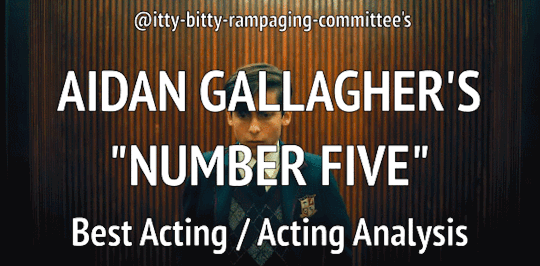
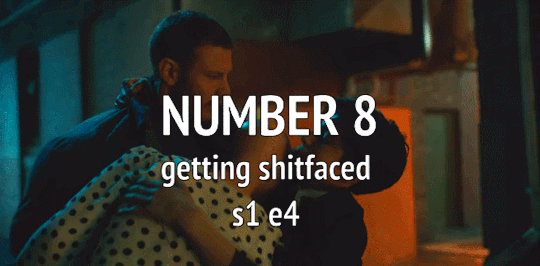
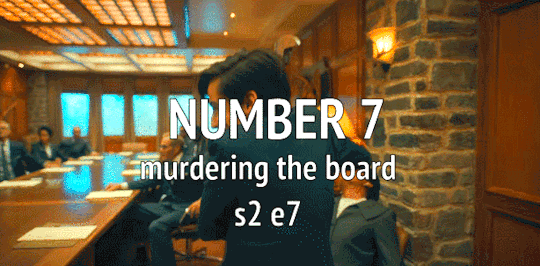
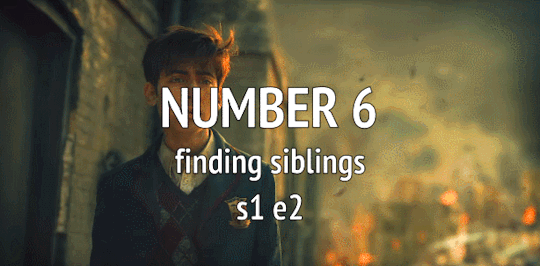


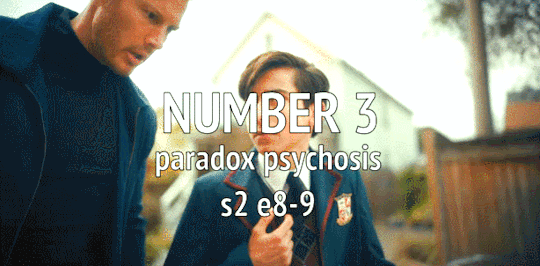
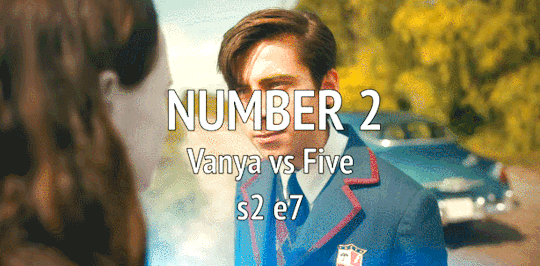

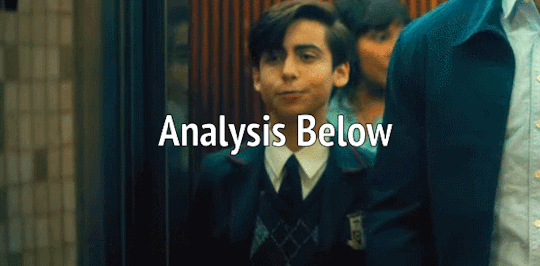
My Top 8 Best Acting Moments from Aidan Gallagher!
Thank You to Anonymous for Requesting
Analysis Below
>>Warning: This is a giant post, so don’t click “read more” unless you genuinely want to read more. Otherwise, you’ll be scrolling for a long-ass time. This analysis covers the acting, psychology, and writing genius of Five Hargreeves.<<

So, this may be the lowest on this list, but it is by no means his weakest acting scene. My god, this scene is incredible because of the accuracy given the age and, henceforth, the experience of the actor.
Acting is effective if the person is able to accurately tell a truth whilst in imaginary circumstances. In order to act powerfully, we are commonly taught to connect complicated emotional situations to something we know well and, therefore, can portray well.
For many, being drunk isn’t anything new. And being tipsy isn’t exactly uncommon to act out. But for a fourteen-year-old, this is awesome to see because it is incredibly accurate. And, given the character’s psychological/emotional status, it’s even more impressive.
Here’s why:
So, right off the bat, listening to Aidan’s speech is something awesome. His clear yet natural slurring, his guttural tone: these two things are perfect indications of intoxication, since volume control is practically gone and drunk people don’t think things through. They just talk, and talk, and stumble because their inhibitions are so low.
It’s can really be heard, best, when he says, “she said it makes me surly” and when Diego whips around, he says, “hmm?”
Another thing that makes this so fun to watch is the fact that Aidan is completely lax. Being carried is one sign of that, yes, but even his subtle movements are loose. He did his homework, not only for the vocalization of someone who is drunk, but also for their movements.

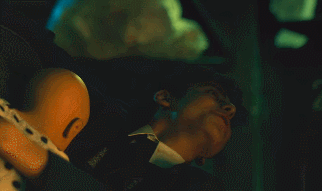
Look how loose his movements are. He just tosses his hand up, lets it drop back down, and his head is too heavy, flopping all around. Completely uncoordinated and smooth, which is a bright contrast to Five’s usual coordinated, sharp, and calculated movements. The character is relatively rigid, which makes sense given his psychology and traumas.
Speaking of traumas.
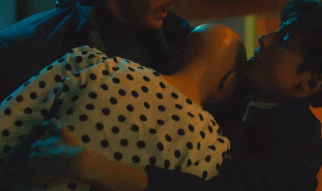
There is this beautiful, subtle self-soothing movement going on right here. It’s a clear comfort to him, and after the night he has had, and the trauma he has endured, it makes perfect sense for him to be clinging to her as such. Whether Aidan knew what he was doing with this, I can’t say, but what I can say was that it was a fantastic choice of action to follow through with.
KEY NOTES: Acting drunk is all about fluidity. You make yourself as liquid-y as possible. Become one with the water, though not in an elegant way. Rather, become the cup that’s just tipped over. Water is spilling over the side, getting everywhere, aimlessly spreading across the tabletop. It’s a mess, it has no direction nor stability, etc.
Aidan follows through with this beautifully. I could gush about this all day, just as I could with so much of his acting. Acting drunk is hard, even for some adults. Luckily, he has it on his side that Five is so completely opposite of what we see here, that him being so flimsy and giggly is strange as shit.
Additionally, if you’re ever needing to act drunk, do the opposite of your character, given the script allows it. If the character is normally very carefree and lighthearted, become the depressed, crying drunk, or the angry drunk. Or, like Aidan, if your character is normally rigid, become a giggling mess that can’t take shit seriously.
On to the next, where it’s more about the psychology of a character rather than the physical acting of the actor...

This scene. This was the moment that made me realize just how much I adored Five when he’s absolutely batshit. Unlike most of this list, where internal conflict and monologue drives for an impressive performance, in this case, it is the external conflict and monologue that makes this scene fantastic!
Here’s why:
It is an absolute rollercoaster of emotions for Five Hargreeves.
Seriously, this guy is leaping from emotion to emotion, bouncing between frustration to borderline panic to bitter glee to mania to relief. You can practically see the gears turning in Aidan’s head throughout the entire scene as he throws Five through the ringer.
So, from the top, we’re given this glorious moment, both a genius writing move and fantastically acted.
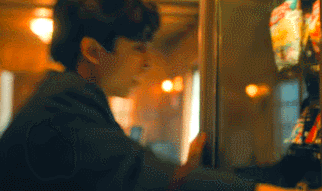
The vending machine.
I know a lot of people are like, “hell yeah” because Aidan gets to say “fuck”, or because he’s just off the shits. There are many reasons to love this scene. But I especially love this scene because it’s really introducing to the audience exactly what’s going to happen: intensity, violence, and Five snapping, losing his cool in a lapse of fear and frustration and desperation. And it’s beautifully encapsulated in this one fucking scene.
Aidan’s acting here might seem easy, and in a sense, it is. It’s easy to ram your shoulder against a vending machine and shake it and get mad. But what isn’t easy is knowing why you’re doing this, and feeling it. Just from observation and process of elimination, Aidan’s likely mostly a method-based actor. He bases his acting, and his characters, in his own reality. That means that, if Five is panicked, Aidan will force panic upon himself. He’ll induce an emotion physically to get a psychological and emotional reaction.
And here, it’s clear that whatever he was thinking out, however he had prepped for this scene, was working. Because you can freeze these frames and, sure, see funny faces. But you’ll also see flashes of fear, of desperation, of panic, of anger. Fear and panic because he may fail his siblings, he may not be able to save them. Desperation because he needs this to work, he is going to murder all these people and so he needs it to work. And anger because the Handler is making him do this again; he’s right under her thumb once more.
All of these emotions, every damn one, is played out in this one. fucking. scene. And that’s insane.
Those emotions come to a head here:

Aidan’s deep, stabilizing breath grounds Five. He has gotten his rage and desperation and fear out. Now, there’s only one thing for Five to do: murder the Board. And it’s an instant click here.
There’s the deep breath. The understanding. The resignation to what needs to be done.
Then a head turn.
Then boom. Look carefully. You can see the light drain from his eyes, see the hesitation bleed out right there. Right there. All within a breath, head turn, a beat, then a face forward.
That is some intense grasp on your physicality, your emotions, and your portrayal of those emotions. Aidan’s always been fantastic at emoting, but subtle scenes like this just prove his class in it. It’s incredible to see.
And then this scene:

This shit is actually an amazing move on Aidan’s part. It holds both literal and metaphorical weight: he sighs, from exhaustion, because Five is fucking tired after jumping that much, expending that much energy in a short amount of time, and narrowly letting his target escape. But it’s also showing a mental exhaustion, a wearing of the mind on the body. He sighs from relief, but it’s ironic, because the fight is far from over.
And you can see that.
Notice how Aidan may be sighing - sighing with his whole body - but the exhaustion is still in his eyes, his brow is still furrowed. There is no relief there, because there isn’t any relief for Five in this moment. His mission has been accomplished, but he has to deal with the Handler, with the aftermath, with the repercussions of his selfish actions to save his family.
And you can see it all in this movement.
KEY NOTES: When acting out internal conflict, be subtle. Obvious movements are made for obvious, external conflicts. A person who punches first in a bar fight as an obvious external conflict. But, like shown here, a person who is breaking from the inside out will have external action, but also internal emotion that comes out in the most subtle of ways, whether it be through expression, through contradicting action (the sigh, but no visible relief), etc.
More often than not, in the arts, less is more. However, you first need to understand the more to be able to do the less. So analyze the scene, analyze the character, understand it fully, and feel it truthfully.
Onto the next!

This scene is quick but beautiful.
I love the entire apocalypse scene, and I’m sure you do as well. But this one moment right here. This moment where he sees Klaus and backs away? Fucking beautiful.
Let’s just zoom in, shall we?
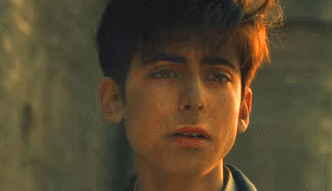
Yes, a lovely grainy gif. But God it shows everything you need it to. This scene is a fucking gutpunch, and here’s why:
You can see every flicker of emotion, every transition. It’s in the way his mouth eventually closes, the way he backs up, slowly. It’s so fucking evident that Five is heartbroken, and you can see the thoughts going through his head. The realization that this is Klaus, that his siblings are dead, that he is alone in this apocalypse and his family is dead. The tears in his eyes...
God, bro. It hits so good.
Not being able to use dialogue can sometimes be difficult, because the actor doesn’t have a key part of their craft with them: words. Being able to emote, to shift from emotion to emotion so seamlessly with just a meager movement of the jaw while backing away. It’s incredible.
That’s literally all this is about. I chose this as my number six because it is so powerful within only a hundred-or-so frames. Having an actor be able to emote to clearly with just facial expression...
Shit, bro. Shit. It’s fantastic.
Like I said, the rest of this scene is amazing, and him finding his other siblings is intense, but this look right here is just...unparalleled.
KEY NOTES: Feel that shit. If you can’t feel it, craft a narrative to make yourself feel it. Again, acting is always about believing and living truthfully in imaginary circumstances, and sometimes it’s difficult to express emotions and feelings as is, let alone without dialogue. To help that, think of something.
For example, in this scene, if I were Aidan, I would think about the fact that these people I love are dead, the world as I know it is destroyed. Sure, I may not know that literal feeling, but I do understand the feeling of hopelessness, of feeling so utterly alone. Make it so that you’re able to live truthfully, however you need to do that. People usually don’t have completely empty heads; they’re thinking of things, of many things, often. So think about those things in-scene and in-character, and feel it.
Additionally, this is going back to the less is more. Aidan barely moves, here. His expression is relatively static but that slow back away, that hardening of his jaw, those things are gentle shifts that drastically change the way Five is in the scene. He goes from shocked, slack-jawed and glassy-eyed, to feeling cold realization as he closes his mouth and backs away, the understanding dawning upon him.
I could gush about this for decades...
Next!

This whole barn scene is just...gold as fuck. But this scene in particular, with the interwoven flashbacks of Five’s siblings, his father, his instances with time travel. The realizations that cross his face are beautiful, which in turn, makes this scene fantastic.
Get ready for some awkwardly close close-ups, because I’m about to explain some really cool shit as to how Aidan’s using facial expressions to navigate pain, realization, fear, surprise, etc.
So here’s why:
FEELING THE FEELINGS.
That’s how. A lot of what makes this scene powerful from an acting perspective is because Aidan completely suspends himself in disbelief. There are a lot of surprises that come to Five in this moment, and Aidan feels them all. And he feels them powerfully. He feels the shock around the pain of being shot, on top of it.
So to kick it off! Here:
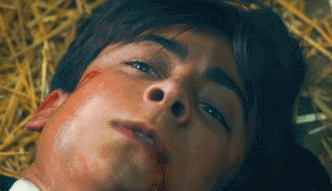
Aidan’s living in this moment. He’s living in the anger of the Handler, thinking he’s going to die right here. His siblings have just been murdered again, by this bitch. And the audience is able to live in that with him. His eyes harden. His jaw sets. He’s breathing tight around the pain, infuriated, either shaking from the agony or the hatred or both.
Five is so caught up in that moment, and Aidan suspends himself in that moment so clearly, that the next moment is powerful as shit.
The Handler gets shot.

She gets turned to swiss-fucking-cheese right in front of him, and the way Aidan lets Five live in every second is beautiful. He goes from shocked, to confused, to going, “oh shit, that looks painful”. And it’s muted by his pain. Aidan doesn’t need to move much, he doesn’t need to make a grandiose gesture. It’s wide eyes, it’s knitted eyebrows, it’s swallowing around the blood and letting Five be in this moment.
And then Five realizes - Aidan lets Five realize - that the Swede has taken the Handler’s place. That he’s going to die all over again.
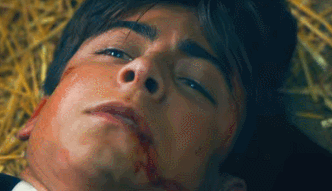
There is that anger again. That pure fucking spite. It’s the look of a man who would murder someone if he could sit up. His jaw sets from before, where it was slack with surprise and sympathetic pain. Look how sharp his eyes are. Boy is fucking pissed and it’s beautiful.
Let’s hop back! Back to movement!
Aidan’s squirming around here?
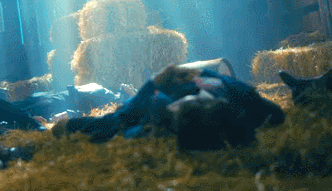
Realistic as shit. Five’s just been shot. That’s absolute agony. And there’s blood coming down the side of his mouth, which means his lungs have somehow been hurt. He can’t talk, breathing must suck, and so of course he’s writhing on the ground.
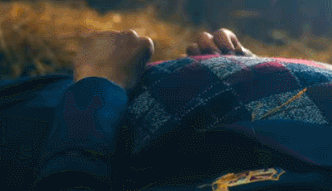
And this?
Is Five clenching his hands from pain? Is he trying to blink? What’s going on here? I don’t know, maybe Aidan does, but either way, both motivations are powerful. Five may be trying to blink away. He may be trying to tap into his powers instinctively. Or maybe he’s squirming in pain, clenching and unclenching his fists. And that shit punches. It’s so subtle, but so good, keeping the audience in the moment. No matter where you look on his body, whether his hands, his face, his chest - it all shows the agony he’s in, the desperation he’s swimming in.
Which then leads to the coolest fucking moment:

Look at how his eyes shift, only just so. His brows furrow only slightly. He’s realizing what’s going on, what he can do to save his family. Aidan played this perfectly. Again, less is more. These subtle movements make so much sense, because Five has been shot, he’s losing blood fast, and it’s dulling his movements and senses.
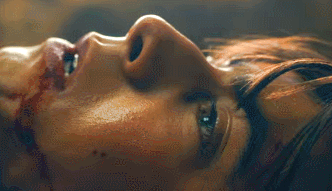
And when Five begins turning back the seconds?
The pain, the shock, the “holy shit this is working???” My god, you can see him choking on the blood and around the agony. You can see his hesitation, his being startled by his own powers, by what he is capable of. The rapid blinking, the jumping eyebrows, the gasping for air as the bullets likely begin ripping out of him.
KEY NOTES: Subtle subtle subtle. Live in that moment. Suspend your disbelief. Here, in this scene, there are several key shifts. These shifts are supposed to be a massive surprise to Five. And because Aidan is king at staying in the moment, and letting that moment live in him, he is able to display these shifts perfectly.
1st Shift - Realizing he is alive, and his siblings are dead.
2nd Shift - The Handler getting shot.
3rd Shift - Axel moving to kill him.
4th Shift - The realization of his father’s words.
5th Shift - Holy shit time travel is working.
All of them need to have a shift in-scene/with the tone. Aidan shifts this with pure expression. He doesn’t need to utter a single word because he is able to live in that moment and truly let himself be shocked, scared, desperate, angry, etc. So, in order to do this, live in the moment.
Some people say knowing exactly what will happen helps, because you’re able to time your expressions perfectly. Others say that knowing nothing helps, because you’re literally letting yourself be surprised. This truly depends on the actor, and their style. Aidan has expressed that he waits to read his lines until he’s there, on set, because then it’ll be more of a shock to him. That works really well for him (clearly) but it may not work for you, so test that out how you’d like.
Onto the next!

This.
Shit.
Is so good.
The moment when Five meets with Dolores again after god knows how much time while he was at the Commission-- It’s beautiful. And again, being the king of the subtle, Aidan can display the perfect mix of emotions that are occurring in this scene.
Here’s what’s up:
As many people may have noticed, a lot of these fantastic, key moments for me, in particular, are special due to subtlety. And subtlety is seen in the micro-expressions displayed through the face, mainly. Specifically, the eyes. Aidan’s ability to act solely through his eyes is something I’m going to focus on for this scene in particular.

These are his eyes the moment he sees Dolores again. And what’s really, really fucking cool is that Aidan is completely living in this scene. It shows in his eyes: real compassion, real love, real care. Sure, Aidan may not care about the mannequin in front of him, but he is thinking about something, whether that’s Five’s ties to Dolores, or someone in his life that he truly feels fond over.
You can see it.
His eyes soften significantly as the gif continues, and you can even see the corners of his eyes upturn after he says, “Dolores”. There is real love here. The actor is able to portray true love through just the eyes. And that’s insane. Many actors express love through physical action because they may not be actually feeling it. They’ll say, “I love you” but express flatly, with dull eyes and a forced smile.
But here. No, not that shit. This shit has Aidan feeling everything. And it makes a big difference, makes everything feel so much more genuine. Good acting is through the eyes, not the words. Dialogue enhances the story, but being genuine, and selling that story as “reality”, is done by the actor, through the eyes, the subtle expressions, the minimal gestures and movements.
Let’s look at some more eyes?


Now, I fucking hate looking at eyes. But with Aidan - like with many good actors - I find them fascinating to watch. Because if an actor is feeling it, is living in the moment, they will express fantastically through their eyes. Most human communication is body language/unspoken, and I’m willing to bet a good chunk of that is through the eyes alone.
You can see Five thinking in that second gif, his eyes flicking left, left further, deep in thought for just a second. That is the thing you should be envisioning when authors say, “they could practice see the wheels turning in their head”.
In that first gif, Aidan’s compassion and softness, his quiet eyes, are contrasted by the sharp roll following the “obviously”, which makes the love being expressed to Dolores only that much stronger. It enhances the moment. See, because being too subtle the entire time makes it so the audiences don’t pick up much at all, they don’t feel it. And being too obvious makes you an amateur, makes it comical, almost.
When you’re strong in your craft, you’re able to make every single move in the most calculated of manners, but you make it seem effortless, make it seem natural. That’s incredible shit.
I’m by no means saying Aidan is perfect. He definitely isn’t. But, scenes like this showcase his experience in the field.
KEY NOTES:
Piggybacking off the subtlety discussed earlier, practice living in the moment. There is no real way to practice “being subtle” because it manifests naturally when the actor is living in the moment. Hence why this scene is so high on my list.
So learn to equate the emotions of your characters to your life. Tie your character’s life into yourself, somehow, all while keeping a safe distance. It’s by no means easy, and it takes years to learn how to do that, how to express naturally and not force a single thing. Being vulnerable, and raw, and flawed like that is hard, since so many people are taught that flaws are shameful, that perfection is required for success. But acting, like much of the arts, require you to unravel that believe and be truly vulnerable, exposed to possibly millions of viewers.
So learn to live in the moment. That will shield you all whilst letting you live freely as the character and, therefore, express truthfully and subtly.
Next!

Remember my rant about subtlety?
Yeah, fuck that, because with this, we’re going to talk about going off the rails. But, going off the rails in a tasteful manner. The paradox psychosis scenes were a beautiful contrast to a normally stiff, calculated character. it was satisfying, and entertaining, and so fucking powerful when breaking down the psychology of Five.
So let’s hop into that:
Psychology is everything to a character, because it is everything to humanity, and people as a whole. Every decision made is dictated by psychology, by experiences and how those are compartmentalized and processed in the brain. An action isn’t done without it meaning something to the person.
And the same goes for every character made.
If you are a writer, you need to understand the actions and reactions of your characters based on their experiences and their psychology. If you just...write random shit because you want to, or because it seems funny or creepy, it may be good, but it won’t line up psychologically and it’ll show. It’ll be obvious to those of us that study this day-in-day-out.
The same goes for acting and actors.
An actor will be much more powerful in their role if they can understand their character’s psychology. The amount of empathy going into this is intense, especially for those playing “villains” or antagonists - those with flimsy morals - because you need to be able to break down, understand, and agree with the psychology of your character. It’ll make them so much more realistic and powerful.
That is why seeing Five - a normally calculated, sharp, careful character - off the shits is the best thing ever. And it’s in-character, too! He’s learned over the years that independence is the key to survival, that thought (as opposed to action, or outbursts) yields better results.
Yet here, in the scene, Five is relying upon Luther’s help. He’s trusting his brother. He’s acting irrationally. He’s skittish. And it’s such a beautiful contrast. Admittedly, this scene is more about the writing than Aidan’s acting, but it is still fantastically acted, and that only adds more to the realism, to the intensity, to the fact that it is so not Five to do this, and yet, it is very much so Five.
That! Is because of body language.
We know it is Five, that it is in-character, because it still follows Five’s normal body language, his gestures, his manic buzzing around despite his words sounding paranoid, despite his actions being rash. I’ve already spent a lot of time on this number already, so I’ll just demonstrate with a specific scene:
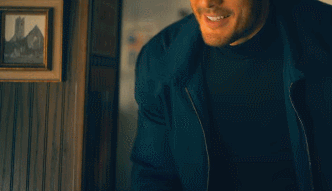
He’s pensive as hell right here. Shoulders tense, shifting back wards. He knows what’s going on, he’s as terrified as he allows himself to be (because he can’t stifle it, perhaps), and it’s so very Five while also being not Five at all.

Despite the music telling us it’s all gucci, it is not all gucci. Look at his eyes. They harden. They get dark. His demeanor completely shifts into caution. he swallows. Steels himself. This is the Five we know - a paranoid little shit - and yet, there is fear that is so uncharacteristic. All through Aidan’s beautiful acting. All through him understanding the psychology of Five perfectly. This is why it is required that you understand your character’s every move, every action, every line of dialogue, every thought.
So, this kind of shit throughout the entire paradox psychosis scene is just amazing. And it’s exactly for the reasons listed above. Aidan knows Five. Not only is he Five, but he knows Five. Inside and out. And god does it show.
KEY NOTES:
Know your character. Know them better than you know yourself. Deadass. Know them better thank you know yourself so that you can delve into the meat of their psychology and tweeze out exactly what you need to do in order to act them correctly.
Onto the next!

This gourmet shit.
Time to get uncomfortably close once again.

The jaw clench! The cheek tightening! The head tilt! The lips thinning! Look at that beautiful expression. See, acting, like writing, is all based on formula. Now, I’m going to out myself, but I’m autistic. Facial expressions, movements, twitches, etc. aren’t inherent to me, and understanding them and analysis them is a learned behavior.
Actors and writers, like me, need to understand the formula.
Clenched jaw + fidgeting + tightening lips = numerous things, ranging from frustration, to anger, to desperation, to pain.
But when you include the eyes.

The eyes tell it all.
Small, watering, tight at the corners, knitted brows. All of these, plus our formula above, create the perfect mix of frustration, desperation, pain, fear.
He is frustrated with the situation, with Vanya. He is desperate to get her to listen. He is in pain because he hates to do this to her, hates to have to fight her on this. And he is scared because what if he has to fight her?
Actors are usually conscious - at least at first - about these movements. They learn to have complete control of their bodies, their faces, down to the muscle. Or, they should. I can’t speak for Aidan, because I’m not him, clearly. But I can safely say that, if he doesn’t consciously have control of his body and understand exactly what’s going on, then he has some intense intuition about his emotions. He is able to perfectly display a mishmash of emotions, all perfect given the situation, the character, his experiences.
Aidan gives Five the multi-layering goodness that we analysis kids love because Five isn’t just upset. He isn’t just frustrated. He is frustrated on top of being scared, and agonized, and exhausted (you can see the weariness in his eyes; it’s all in the eyes).
KEY NOTES
I’m not sure if this would help, but try making a formula. If you are worried about your character not doing an emotion right, or wanting to do multiple emotions at once, craft a formula or a chart.
So, say you want depression and anger. A basic formula could look like this:
Depression = Hollow Eyes + Monotone Voice + Slumped Posture
Anger = Shaking + Sharp Eyes + Clenched Fists
Then, you can combine the two together. You can have hollowed eyes, and a monotone voice, but also sharpened corners to the eyes, and clenched fists. Here, Aidan is tapping into multiple things, things that have interwoven specifics to their formulas. That’s why it works so beautifully. His eyes scream agony, his jaw tightens with frustration, his eyebrow knit together with frustration--
Bless this kid and his acting.
Anyways, last but definitely not least, here is my final analysis:

Now, this scene may not seem like the most intense acting ever, but in reality - to me - this shit is insanely powerful. It’s not just the acting going into work here; it’s the blocking, the dialogue, the pacing, the atmosphere, the emotional environment, the music and sound engineering...
It’s a fucking cinematic masterpiece.
But, since I am here to talk about just acting, and just Aidan’s acting, let me tell you about how this scene is made so good. There are two reasons:
One, is that Aidan is a master at post traumatic stress disorder and PTSD psychological processes and how that comes out in action, reaction, dialogue delivery, etc.
And two, he acts like a grown-ass old man.
Let’s talk about the second one first, because why not:
(apologies ahead of time for fucked gifs, this scene is impossible)

This scene. It’s just a drink. Chill, whatever, right?
Wrong.
It’s the way he moves. The way he drinks. The way he holds himself when he is around Reginald, another man his age. Around another man his age that had abused him, had done him wrong, but in Five’s eyes, some whom he had done wrong, too.
Luther is the sibling that is always said to be in denial about their father’s wrongdoings, but a lot of people neglect the fact that Five is, too. He is just as much in denial as Luther, if not more so by the time season two wraps up.
And it shows.
It shows in the way he moves as if they were equals, when they are so clearly not. He tils his head, gives acknowledgement in the way old men do. The generational gap is closed by Aidan’s movements, not by his words. It’s incredibly satisfying to see Five’s psychology bleeding through as he instinctively shifts from “I’m dealing with a bunch of kids” to “I’m alongside a man my age, my father”.
And speaking of psychology, let’s please talk about PTSD.
Specifically, subtle show not tell of PTSD, all through the eyes.
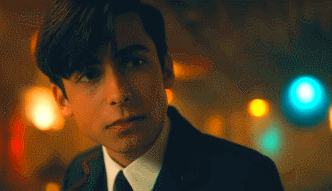
Right. Here.
Look, I’m not going to lie, if I analyze this scene, it’ll be the same things you’ve heard before. Everything I gushed about earlier is going to be repeated here for the ultimate finale on this long-ass fucking post.
But, humor me.
Five’s got trauma. Bitch has trauma for days. Though, he doesn’t wear it. He hides it, he buries it, because it is useless to him. Yet, it will always be there. His trauma of abandonment, and survival in the apocalypse, on top of the abuse from his father, the stress of his childhood, and topped off with the murder he had to shoulder for the sake of the Commission. Rarely does this show. Rarely is it seen.
Save for scene likes this. Right. Fucking. Here.
Aidan knows Five. And he knows the traumas Five’s endured.
Five can’t look at his father as he admits his failures, the snide, “I told you so” ringing through his head. He has to acknowledge that his father was right, that he was right all along. This is a burden Five has carried for decades, as seen with his discussion with Diego in 2x02. It’s not something small for him. So, to admit that...
The stare says it all.
His eyes are glazed over, lost in the past. He isn’t looking at Reggie, is looking past him. This is the thousand-yard stare you always read about. These are the eyes of agony, and regret, and a flashback. His eyes flick, flick to the side, towards the camera, as Five remembers something. Aidan knows how to play this. He knows how to play this trauma of remembering, of remembering what he had done to his siblings and how he has failed. And, finally, he is able to look and Reginald but he is choking back something. He swallows thickly, as if it’s almost sickening to do so.
Aidan’s understanding of Five, and his trauma and psychology, and expressing it all through his body language, and expression, and eyes. God, it’s fucking mesmerizing.
SO TO WRAP IT UP
Everything here is purely my opinion, but if I were to leave you with anything, acting (and writing) comes down to three basic things:
--Understanding the psychology of your character, through-and-through.
--Understanding your body, your expressions, your eyes, and how you react and can react to specific emotions.
--Living in the moment, and being present in the character’s life, being truthful to them over yourself.
These are the things that Aidan excels at. God, he is amazing at it. And I appreciate the hell out of it any time I see him. He is so truthful to Five, so honest to the character, that it’s beautiful to watch. Five is so flawed, so hurt, and so complex, and Aidan isn’t afraid to show us this vulnerability. I suppose that should be one last thing that all writers and actors and anyone in the arts should strive for:
--Vulnerability, pain, fear, and raw, oftentimes shielded emotions are not something to hide but, rather, are your greatest strength.
#aidan gallagher#the umbrella academy#umbrella academy#tua#number five#five hargreeves#five#acting analysis
1K notes
·
View notes
Text

“Signa of the Witch
Where magical images are concerned, we assert that all signa used to represent the witch are paradoxically both false and true.
According to certain rustics, witches practice the sorcery of maleficia, effecting magical harm. Blight is their singular pursuit: whether by birth or learning they command the ability to cast withering bane upon the unsuspecting merely by fixity of gaze. Depicted as haunters of cemeteries, they are imaged with the symbol of the Evil Eye, together with a bestial or demonic servant who abets their maledictions. Other signa present in this representation are the owl, the pin-stuck mommet, the blighted ear of corn, and the mouldering Bones of Man, fresh-dug, in an iron pot. Lore relates one must scrupulously avoid the glance of these persons, even as the Stare of the Gorgon. For this reason mirrors, reflective surfaces, and talismans in the form of an eye preserve the spirit from the harm they inflict.
Conversely, others assert that a witch is a country woman who effects cures and auguries for the gullible. She is found at the periphery of farmsteads and offhardscrabble woodland pathways, if indeed one knows where to look. In this image, she appears with a kerchief tied on her head, and with the following devices: a mortal and pestle, a polished rock crystal, a bunch of herbs bound with cord, divining cards, and a candle set atop a mummied hand. The so-called cunning-man, with his staff, book, knife, cranium, and instruments of horoscopy is also identified with this exemplar. Taken together, theirs is the dominion of charm, exorcism, and nostrum.
Phantasie conjures the witch as a nubile temptress, adept at the use of feminine power to overthrow male virtue: a daughter of Eve and Old Eden's Serpent. Here, she is pictured naked, her moon-pale body encircled by the scarlet coils of the Snake, or yet mantled in green: in her left hand is a chalice and in her right a flensed human skull. Because her sorcerous proclivity is seduction, she is sometimes accompanied by an image of the human heart, bound with knotted cord; or with a phial of poison and diverse Herbs of Venus. This type of witch of necessity includes the venefica or poisoner, as well as the fricatrix, or ‘woman who rubs', known for her erogenous application of intoxicating unguents.
The Holy Inquisitor, considered to possess much knowledge of these matters, insists a witch is one who has turned against God, having sacrificed soul and body to infernal spirits for a measure of temporal power on Earth. Such enchanters may be male or female, and appear in secret ritual congregation with others of their kind. In this nocturnal ceremony, they join with a horned black devil, a moon-crown'd harlot, or both in a kind of blasphemous reverie said to ape the rites of the Holy Sacrament. Devices present in this depiction are the boiling-pot, forked staff, broom, scourge, desecrated eucharist, wine-cup, feasttable, and the crux inversa. In more sophisticated accounts of these rites the attentive will also note a solitary tree in prominence: Oak, Walnut, Beech, or Chestnut.
Men of Reason too, advance their own chosen genus of our lamia. They proclaim the witch a lunatic, suffering madness, hysteria, unseemly vapours, and aberrations of mind, a victim of both disease and the collective delusions of the irrational. Where representations of this type appear, the face is drawn and skeletal, the body clothed in rags, and haunted by spectral forms emerging from the darkness. More rarely this form of witch may be a sleeping maiden, haunted by incubi, nightmares, and nocturnal daimones; images of the Moon and the Poppy are also present. According to Reason, the witch should not be persecuted, but proffered the cure of strong medicament. Should therapeutics prove ineffectual, confinement in an asylum is preferable to the wheel, gallows or stake. Standing midway between the Inquisitor and the Man of Reason is the Magus, who regards the witch as the inheritor of degenerate forms of ancient high magic. Where such Magi depict witches, their representations are typified by the presence of symbols of ignorance and magical inferiority: base sexuality, superstition, physical ugliness, supercilious references to 'primitivism' and the proliferation of mundane objects in a magical context. This image of our lamia, being an exercise in mental hygiene, explicitly signals the typologies of magic the Magus rejects or seeks to intellectually diminish. In extreme cases this imaging of witchcraft serves as an artificial moral contrast to the Magus, exemplifying the sum debauchery and profanity which he, by his Art, has transcended.
Men of Science maintain that the witch haunts the minds of the ignorant merely as a specter, an inversion of religious piety or rational order, possessing attributes calculated to rouse outrage among the superstitious and simple-minded. In cases where Men of Science have adopted the Mind as their chosen fetish, the witch is portrayed as a societal scapegoat or victim of mob rule. From these scientific conceptions arise no symbolic exteriorisation — merely the admonition that the conception of the witch, like that of God, takes its place among the figmenta of the ignorant. Each of these representations arise in absentia of that which they attempt to signify; they are forged, not for purposes of understanding, but for division of The World. In truth, the Effigy of the Witch is required by all orthodoxy to partition those who reject their doctrines, or to seek the destruction of them who have made their way to God in an unsanctioned manner. Nevertheless, the totality of these grotesque depictions possess an occult truth which evades those who fashion and perpetuate them, yet is well known among witches themselves.
How, then, do witches appear amidst themselves, within the bound circle of their own Art? Few may know, for their outward appearance gives no sign of their proclivity; indeed 'tis their custom to walk among all men unseen. They pass through the world of men as smoke in the night, and those habiliments which mantle their exterior serves only to mask their hidden and frigid resplendence.”
—
Lux Hæresis:
The Light Heretical
by Daniel A. Schulke
#lux hæresis#daniel a. schulke#witchcraft#traditional withcraft#sabbatic witchcraft#sabbatic tradition#cultus sabbati#sabbatic craft
149 notes
·
View notes
Text
The different aspects of Miyako’s personality and character arc
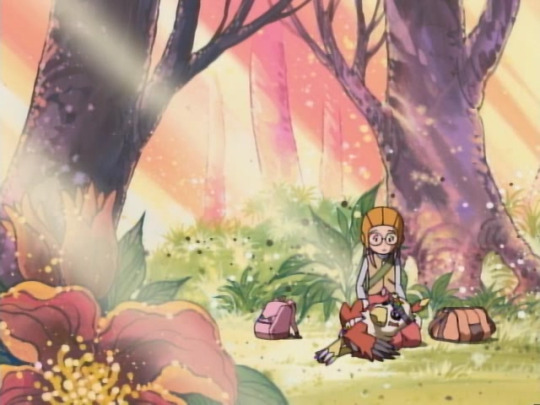
Miyako is a character where there’s just a lot going on with her in general, and asking different people to summarize Miyako in one phrase could feasibly get you some very different answers -- “the computer nerd girl”, or “the one who keeps talking about boys”, or “the one who panics all of the time”, or whatnot. Given that there’s so much to unpack at once even from her base profile, ironing out the full extent of her character arc can get a bit tricky, and there’s a lot going on with it. So, given that: Who is Miyako, anyway?
Miyako’s background and personality
Miyako is a character that I think is best understood by understanding what kind of person she is, and the personality and mentality she goes into the story of 02 with.
An interesting background story behind Miyako’s creation is that she’s based off a real person -- more accurately, a certain assistant producer on the series (whose identity has remained undisclosed, presumably for privacy reasons) was used as a reference for her behavior and actions. Although Adventure and 02 have a philosophy of portraying realistic human behavior in general, this level of specificity is a unique designation to have, and series director Kakudou Hiroyuki has referred to this a few times over the years -- it seems she’s the only of the Tokyo Chosen Children to have such a concrete single-person reference, and it’s also the reason her blood type of AB and star sign Gemini were given in 02 episode 25 (the other kids don’t have mentioned birthdays or blood types to prevent personality restrictions via horoscoping, but a real person having Miyako’s personality, star sign, and blood type wouldn’t make that as much of an issue). Even Volcano Ota himself confirmed Miyako’s resemblance to her upon hearing it after the fact! Indeed, a lot of 02 fans (especially adults) have admitted that Miyako’s probably one of the most relatable people in the cast, namely because her gushing about things she likes and panicking at things that overwhelm her is...well, a bit too uncomfortably on-point at times.
(And especially since so much about Miyako’s character has to do with how happy she makes everyone around her, it’s not too hard to imagine that the staff was so fond of her real-life inspiration that they wanted to pay tribute to her in such a way...)

Still, Miyako is a fictional character, one with her own backstory and interactions in 02′s story, and said backstory is such: she comes from a family that runs a convenience store in Odaiba, and is the youngest of a family of four siblings. Running a convenience store on a small island means that Miyako has probably seen a lot of the island’s residents, and her family also has various levels of connections to the other kids’ families (her older sisters Momoe and Chizuru are friends of Daisuke’s sister Jun, and Chizuru is Yamato’s classmate). Moreover, she’s befriended her nine-year-old neighbor (one who otherwise has trouble socializing with his peers) to the point of regularly going over to do computer repairs for his family. She’s also worked in the computer club under Koushirou, and even before the series has started, she looks up to him and adores him in a way not entirely unlike how Daisuke looks up to Taichi -- and although it’s unclear whether or not she started after the beginning of 02, 02 episode 29 reveals that she helps Yamato with his band.
The pattern here is that Miyako is extremely sociable, and one who actively pokes her nose into nearly everything so she can help out. This makes her a very different sort of Mom Friend from Sora -- both of them are Crest of Love holders for good reason, but in Sora’s case, she was compulsively going out of her way to help other people to the point of exhaustion, and her character arc was about trying to find a way to detach herself from obligations and do something for herself. Miyako is the complete opposite -- she’s the kind of extrovert who actively enjoys poking her head into other people’s business, picking up a bunch of peripheral hobbies so she can do something useful for everyone and go I’M HELPING!! If you actually look closely at those hobbies of “computer programming and hacking”, “hardware tinkering”, and “sound engineering”, other than vaguely being related to computers, they are completely different skillsets, and every single one of them is one Miyako’s depicted employing in order to help someone else out. (Koushirou is never really depicted as having super amazingly high technical skill and most of his unique talent comes from being a thorough analyst, but in contrast, while Miyako is established as being good at even hacking in Diablomon Strikes Back, she doesn’t really seem to have a huge propensity for deep analytical thought.) It’s hard to tell if she has any personal preference for any of them as much as she basically turned herself into a jack-of-all-trades so she could do whatever job was necessary for someone else.
If we’re to believe the official 02 site, Miyako’s been a bit pampered by her family -- as the youngest of four siblings, she’s the “baby of the family”, who hasn’t had to live with a ton of responsibility for others. This means that, much like Mimi, she seems to have been raised surrounded by a ton of affection, which is why she herself is such an openly affectionate person who’s open-minded towards trying all sorts of things, and why she’s used to wanting to help others by actively throwing herself into situations -- but it also means that, being the youngest of a family who is now in the situation of being the oldest in a new group, she ends up in Jou’s situation of suddenly being faced with the pressure of the concept of proper responsibility for others.
As far as Miyako’s general personality goes, she is constantly overflowing with affection and cheer and a desire to dote on everyone -- but the flip side is that she’s also aggressive. She has zero sense of restraint. (If you ever get around to listening to the Japanese version of 02, Natsuki Rio’s performance is energetic and over-the-top in almost every way imaginable to the point that you get the impression of Miyako as someone who doesn’t easily run out of batteries -- at least, until things start getting really serious.) When she loves something, she’ll gush about it as if there were hearts floating around her (and, depending on the level of closeness, even jump in and physically hug them), and she has no qualms against physically manhandling if she feels she needs to, and if she dislikes something, she will make it very clear (including yelling very loudly about it). You could argue that she’s actually closer to the archetype of the brash shounen protagonist than Daisuke himself is!
In fact, Miyako and Daisuke have very similar temperaments -- pure-hearted, but also rough around the edges -- but can be distinguished by the fact that while Daisuke is actually deferential and somewhat lacking in assertion, Miyako is actually aggressive, and while Daisuke’s “honesty about his feelings” is mainly because he’s too simple-minded to be any good at hiding anything, Miyako’s honesty is because she has no brain-to-mouth filter, and everything she’s thinking comes out of her mouth before she can control it -- in other words, Miyako has a huge case of foot-in-mouth syndrome. She doesn’t want to be insensitive, but it keeps coming out of her mouth before she can control it -- and even worse, her emotions are prone to taking control of her, and she is very prone to getting overwhelmed and collapsing into a massive panic.
If you think about the two archetypes of “girl who takes care of everyone” and “aggressive action girl”, Miyako has a tendency towards both at once, and moreover there’s an extra nail in it -- most “action girls” in the latter category would be portrayed as badass, put-together characters with a cool personality, but Miyako is a mess. She’s prone to panicking, all over the place, and her tendency to get in-your-face is not exactly in the most dignified manner. And as a result, a huge part of her character arc (as we will be going more into detail about below) is that she’s aware of this and doesn’t like this about herself -- because she doesn’t want to be insensitive or rude, and in fact she wants to be someone who can better help and take care of others, but, in her mind, her own personality keeps getting in the way.
Miyako in 02


After fully becoming a Chosen Child in 02 episode 2, it only takes one more episode for Miyako to bring food for everyone, as if to say “Right! I’m going to be working with everyone now! All of you are now my new best friends!” (”Bringing food for people” is one of Miyako’s many ways of showing love, given that she returns from Kyoto in 02 episode 34 and immediately hands off souvenir yatsuhashi to Koushirou.) And with that, Miyako settles into the archetype of the group’s “mood maker” -- someone whose role is to keep everyone in emotionally high spirits by influencing everyone with cheer and energy. 02 episode 5 features the debut of her famous “Digital Gate, open! Chosen Children, let’s roll!” catchphrase -- this and her other famous “Bingo!” catchphrase establish her as the only of the Tokyo Chosen Children to have a catchphrase (at least, in the Japanese version). Because catchphrases are fun.
As much as everyone (especially Daisuke) is a bit blindsided by her behavior at first, they eventually come to embrace the positive effect she has on all of them -- Daisuke very genuinely asks her for “the usual cheer” in 02 episode 10, and, all the way in 02 episode 22, this is such an agreed-on and established role that they’ll still wait on her to do the honors even when they’re in a hurry. So in other words, it didn’t take long for Miyako to go out of her way to shower everyone with cheer, and it didn’t take long for everyone to answer to that cheer and appreciate her for it.

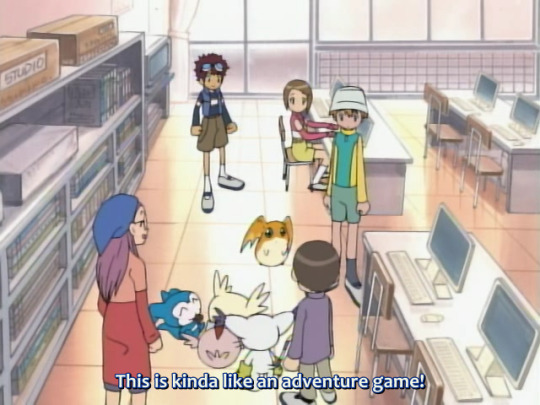
The flip side of this, however, is that Miyako doesn’t start off being very emotionally equipped to handle this -- right off the bat in 02 episode 2, she says that she’s not inclined for fighting, and in 02 episode 4, she refers to it as being “like an adventure game”. That is to say, she’s not at the point where she’s able to handle the full gravity of what she’s just involved herself with (Daisuke reminds her that she’d panicked earlier, but she just blows it off). She’s handling it so cheerfully now because the series is still in its early stages, when she can enter and exit the Digital World at will, and she’s capable of treating it like this.
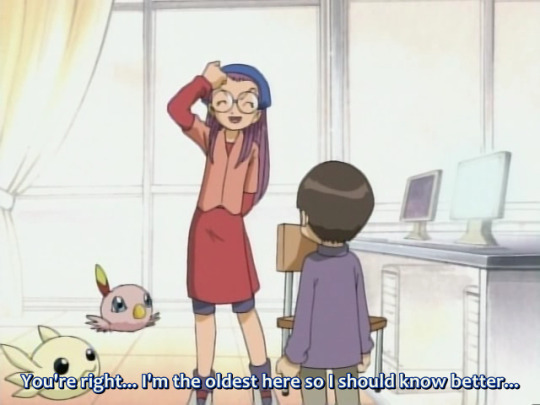
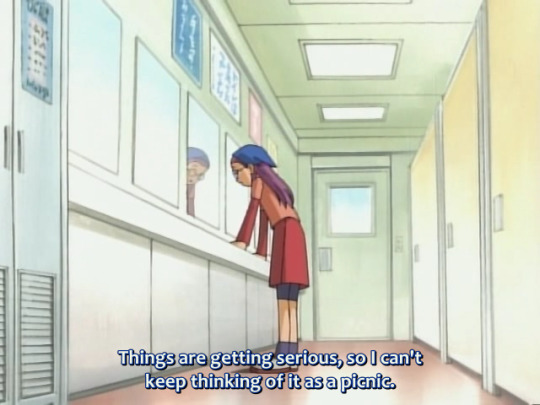
So when the stakes do get higher, she’s the first one to take the stress hard. As mentioned before, she’s the youngest in her family, now recast as the oldest in this group -- but unlike Jou, who consciously knew this fact and took stress onto himself because of the responsibility this entailed, Miyako seems to repeatedly forget that she’s the oldest in this group, and the events of 02 episodes 9-10 (when Agumon is kidnapped) cause her to break down from stress and have to take a time-out. (Which everyone allows her to do, because this is not a series where people are pressured to fight if they’re not emotionally ready for it.) Miyako comes to terms with the fact that the stakes are going to keep escalating, and she can’t just gloss over everything with cheer -- and she does manage to pull herself enough to bring Yamato into the fray at the end of the episode, but this continues to be a recurring theme for the rest of her character arc.
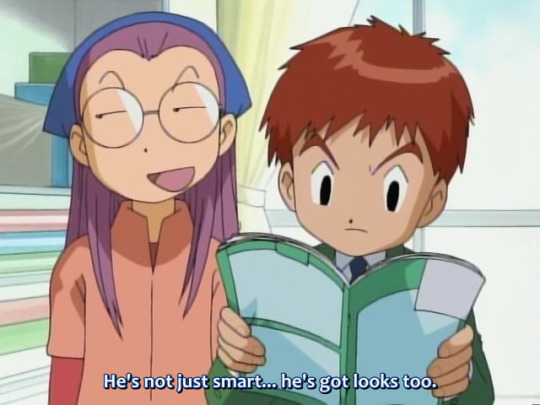
While we’re discussing these early parts of the series, one thing I want to briefly address is the part where Miyako infamously calls a lot of people hot. (Although, not as many as the fanbase would love to make you think; it’s only four people in total.) This tends to get her pinned as some kind of flirt whose head is only filled with being hot for people, but while she’s certainly a bit on the shallow end at this point of the series -- dealing with that being what this character arc is about, after all -- this trait of hers tends to get exaggerated by a lot of people in the audience as if she’s completely lacking in common sense. Miyako’s ridiculous (and we love her for it), but she does have some degree of grip on herself! Context is important here -- she might show a crush on someone, but at no point in the series itself does Miyako show any indication of seriously thinking of full-on dating.
For Miyako, who’s accustomed to just blurting out the first thing that comes to mind, commenting on someone being hot is like commenting on the weather -- she means it as a compliment, but there’s no evidence she thinks she has a chance with any of them, let alone wanting to try dating. This is especially when you take into account her self-esteem issues that we learn about later in the series, and also...well, the fact she’s only twelve. (Remember: even Daisuke’s thing for Hikari comes out as a lot of unfocused affection, and it’s unlikely he’s seriously considered the concept of following that up with a serious relationship -- any serious prospects of romance or dating are not going to be on the table for these kids for a while.) Miyako has also been accused by some of being abysmally shallow for still complimenting Ken’s looks in 02 episode 9 (after it’s already apparent he’s the Kaiser), but although she certainly is a bit shallow at this point of the series, she’s not that lacking in common sense; Iori got in on it too in this scene, and both of them were doing it to tease Daisuke more than they seriously wanted to compliment the Kaiser all that much. So in essence, it’s just “Miyako has eyes” -- she still completely agrees he’s their enemy and she’s not going to judge him any better for his looks, but she also doesn’t see this as a reason to lie about the fact she thinks he’s visually good-looking, especially if it’s to tease Daisuke about it.
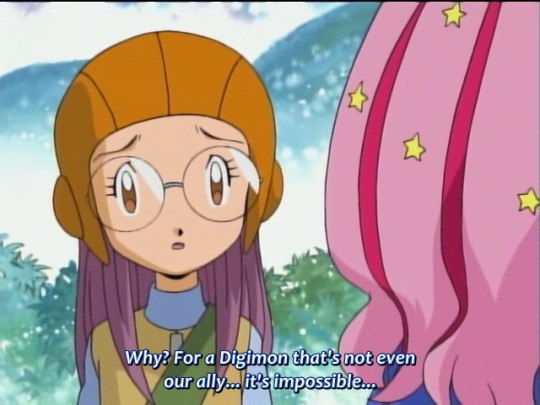
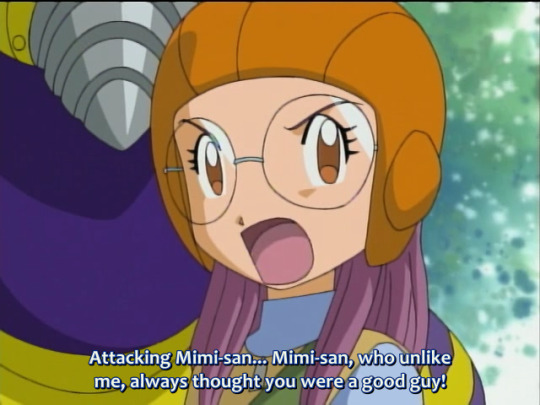


In any case, 02 episode 14 digs a lot more into Miyako’s stance on herself regarding others -- in 02 episode 6, Miyako met Mimi for the first time, and latched onto her for their similar dispositions and her looking up to Mimi for being beautiful, amazing, and cool (and she should, because she’s right). 02 episode 14 adds another layer to this, however, when Miyako spends the duration negatively comparing herself to Mimi. At first it starts off as simply just shallow jealousy for Michael giving Mimi more attention, but as the situation with Digitamamon escalates, Miyako spends a prolonged period of time trying to figure out Mimi’s behavior of pure-heartedly choosing to trust Digitamamon despite everything, against Miyako’s insistence that Digitamamon’s behavior proves that he was untrustworthy the whole time.
Mimi and Miyako’s stances are both on extremes here -- Mimi’s pacifistic tendencies are causing her to let her get beaten up by Digitamamon despite the fact that “appealing to people’s hearts” has never really been demonstrated as a good way to get Evil Rings off (to be fair, this is probably the first time they’ve made an attempt at this with a Digimon that can still talk coherently with it on), but Miyako’s acting as if this retroactively proves him to be untrustworthy even though she knows that the Evil Rings are tantamount to brainwashing. Nevertheless, Miyako acknowledges that her own stance was borne out of her being shallow and judgmental, especially since the discussion between Mimi and Digitamamon brings out a question about the meaning of the “true self”.
Miyako, at this point, is confronting everything that’s bad about herself -- that she’s shallow and not as much of a “good person” as Mimi is. But the Crest of Purity -- once meaning “lack of malice” back when it applied to Mimi in Adventure -- now has a secondary meaning of “not lying to oneself” (the dub translation of “Sincerity” is not actually that off in this sense), and it also means that Miyako is not going to get anywhere pretending or forcing herself to be someone she’s not. The secondary Digimental arc has a recurring theme of understanding that there are still things you need to learn and improve on in order to do better, and this is Miyako’s version of it -- she will have to acknowledge all of the bad parts of herself before she can get anywhere and become a kind person like Mimi is -- and, indeed, becoming less shallow and judgmental and not jumping to conclusions, and learning to reach out to more substantial cores of the problem, ends up becoming a major part of her character arc in the latter half of the series.
This episode also implies one more thing, even if she doesn’t realize it yet at this moment: the path to her becoming a less shallow and more considerate person is not going to involve trying to force herself to be like Mimi, but rather in a way that’s closer to her “true self”.

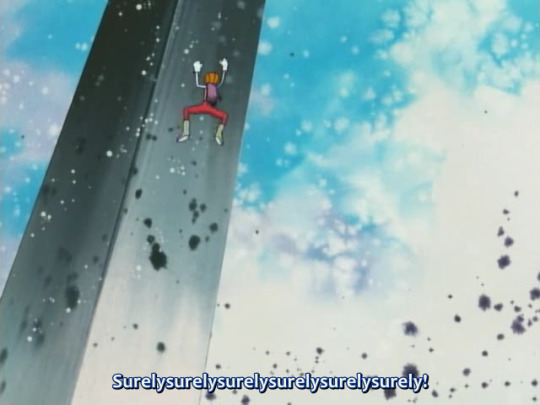
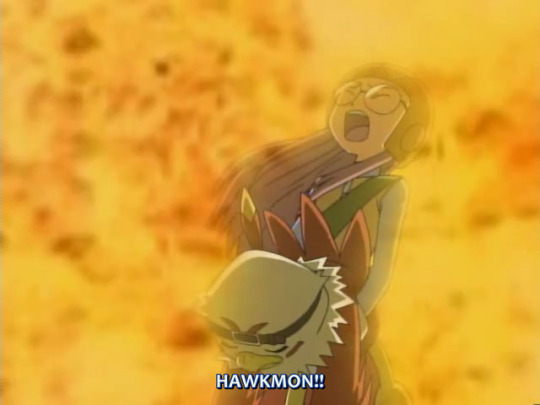
Miyako’s first major turning point is in 02 episode 18, an episode that’s said to have such a profound impact on her that even Natsuki Rio testified to having to alter her Miyako performance thereafter.
Back in 02 episode 10, Miyako first started to realize that this whole experience of fighting as a Chosen Child was a lot more stressful than it seemed at first, and reacted badly to it. Here, the ante gets upped even more -- the kids decide to make use of their summer break and organize a Digital World stakeout, and, eventually, Hikari accidentally becomes indirectly responsible for tipping Miyako over the deep end by making an implication that they need more “determination” to the point of refusing to leave until they’ve beaten the Kaiser. (Remember that Hikari can be terrifyingly assertive as long as it’s not something to do with herself.) For Miyako, who’s never had the same experience of being in the Digital World for a prolonged period of time the same way the Adventure group has, this is terrifying, and she tries to “get herself together” over the night -- only to completely overshoot it and go into the complete other extreme. As much as this ends up being one of Miyako’s peak hilarity moments, it’s most certainly representative of her being under a huge amount of pressure and stress, and it’s effectively her “peak worst” moment -- which results in Hawkmon ending up having to cover for her, and getting injured in the process, and Miyako immediately realizing how badly she’d messed up.
Miyako is thus forced to face a major consequence of her behavior: if she doesn’t manage to figure out a way to get herself under control, other people will be hurt, and as someone who wants to do her best for other people, that’s one of the worst possible outcomes for her.


In addition, it’s also important to point out Hikari’s role in this. The Jogress arcs have yet to set in, but the series still gives you a little preview of what’s to come eventually, such as the insight we get about Daisuke and Ken’s initial attitudes towards each other in 02 episode 8, and Iori later personally witnessing (and being very disturbed by) Takeru losing his composure in 02 episode 19. In this case, we see a bit of what Miyako and Hikari’s opposing personalities can offer for each other (especially since the later 02 episode 31 more heavily involves Miyako returning the favor in the other direction) -- Hikari correctly identifies exactly what it was that set Miyako off, takes responsibility for it, and even decides to make sure Miyako and Hawkmon get proper alone time so that they can figure things out. In general, everyone in the 02 team is understanding of Miyako’s antics and doesn’t hold any of it against her because she’s doing her best, but right now, Hikari may be the only person in this group who can actually proactively do something about it, because Daisuke’s not assertive enough to step in, Takeru has a tendency to dodge things whenever they get awkward, and Iori’s holding himself back too much for the sake of manners (especially in the presence of Miyako, who’s the oldest one in this group). But while Hikari does have an emotional repression problem, she’s perfectly capable of holding herself together and putting her foot down when it comes to other people, and because of this, she’s the one who’s able to understand what exactly is going on with Miyako, and how to adjust the situation around her to make things easier for her.

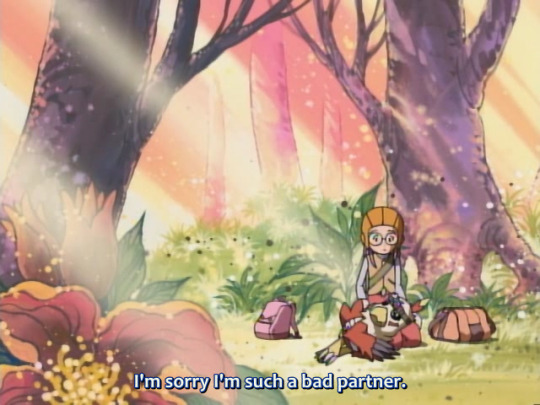

Miyako and Hawkmon have a proper heart-to-heart, and we see more of Miyako’s self-hating tendencies going on here -- she refers exactly to her problems with impulse control, and even labels herself a “bad partner” as a result. But Hawkmon reassures her that she’s fine the way she is, and it ties into how a larger theme of her character arc will involve her learning to find better ways to channel the qualities she already has, rather than trying to force herself to be someone she’s not.
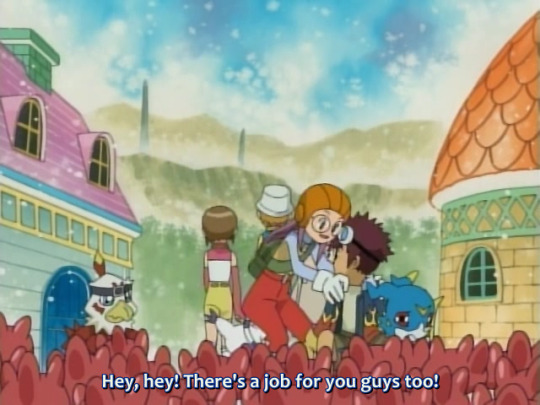
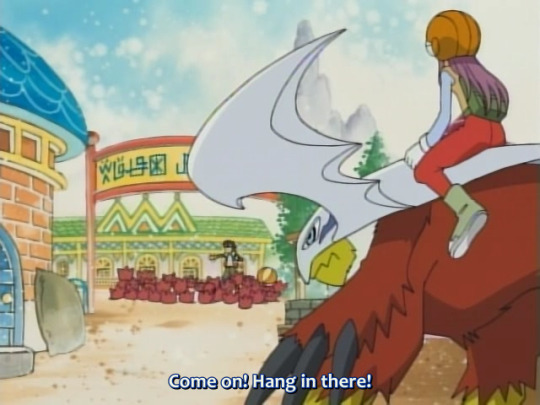

Once the Kaiser is defeated, the second half of the series is where we start to see Miyako’s growth start to really kick in. In 02 episode 24, there’s a short blink-and-you’ll-miss-it scene where Miyako suddenly takes Daisuke and puts him in charge of taking care of the Punimon. Why is this important? Because two episodes prior, Daisuke had been running around in circles like an idiot due to having been third wheeled by Takeru and Hikari, and the moment Daisuke started exhibiting similar signs this time, Miyako personally stepped in and gave him a job to do -- and her actions of keeping an eye on them and her conversation with Takeru and Hikari indicate that she did it exactly because she figured that he would like it. Or, in other words, Miyako correctly identified Daisuke’s need for validation and purpose, and became the first person to proactively do something to address it -- Hikari and Takeru had generally been dodging it awkwardly for the duration of the series, which had only really been making it worse, and, in the absence of another crisis to take care of or someone like Ken to fill the void in Daisuke’s life, Miyako was able to properly figure out exactly what he needed at the moment as a stopgap, and thus is starting to settle into her proper role of understanding what others need in terms of emotional support and actively working to address it.
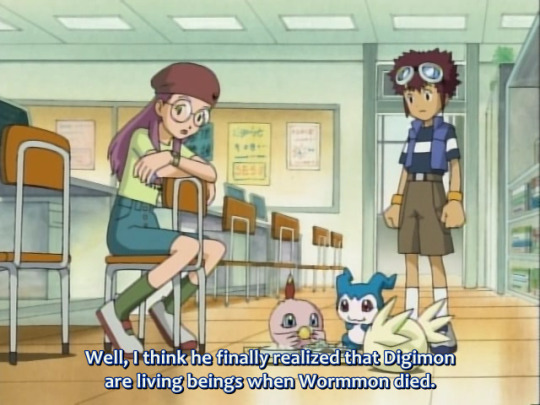
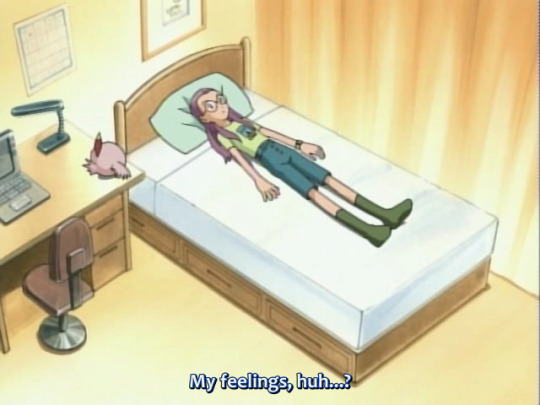
Since the second half of 02 is dedicated to Ken slowly establishing his place in the group, 02 episode 25 is dedicated to Miyako tussling with her conflicted feelings on the situation -- she’s just as open-minded and pure-hearted as Daisuke is, but the one thing that’s bothering her is that she’s a little more doubtful than he is in regards to whether Ken’s heart is really in the right place with all of this. She says, outright, that she believes he’s learned his lesson -- in a way far more firm than Takeru, Hikari, and Iori are about it -- but that one thing about him having potentially killed Thunderballmon in cold blood doesn’t fit the optimistic image she’d like to have of him.
Daisuke is more practical-minded than she is and is more willing to accept that there might have been a good reason -- especially since he himself starts to consider in this very episode that killing an enemy may be necessary if it’s the only way to prevent more victims -- but Miyako is more emotionally oriented and just can’t accept the idea of doing this at all. Both the internal debate over accepting Ken and the internal debate over having to potentially do a kill tear her apart over the course of this episode, and Miyako finds herself constantly waffling back and forth between the two positions. It’s not just her expressing minor doubt; she actually agonizes over this for the duration of the night and the next day, to the point she even considers asking him about it (and eventually can’t bring herself to).
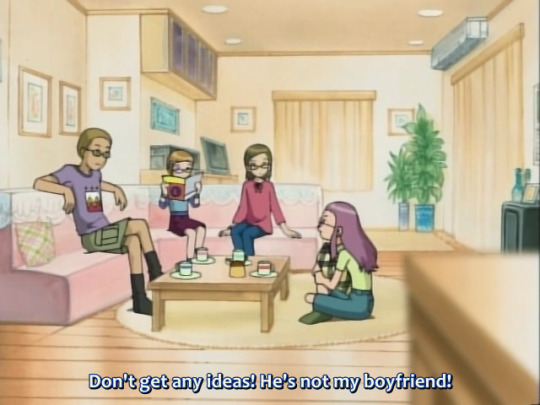
It’s also made a prominent point that Miyako’s prior attraction to Ken in 02 episode 8 was not the reason she wanted to be optimistic about him -- remember, back in 02 episode 14, she completely admitted that she judges people by appearances, but at this point she’s well past that! Miyako takes this entire issue of whether Ken should be considered a friend very seriously, and that’s why it torments her so much over the course of the episode.
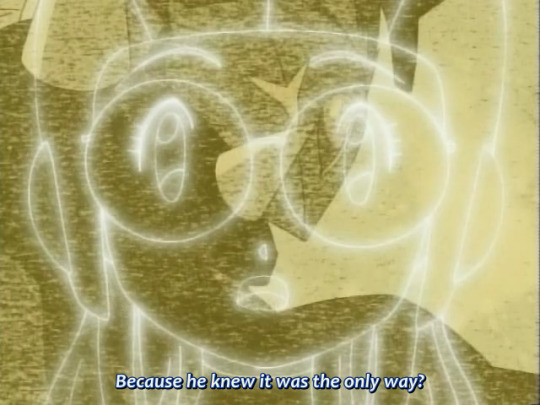

Eventually, all is resolved (at least, for the time being) when it turns out that Ken has been dealing with non-sentient Dark Tower Digimon, and Miyako takes this as sufficient evidence that Ken has changed -- the morality debate about killing comes back in full force in 02 episode 43, and Ken himself ends up just as shaken about it, so the important part is that she understands that he’s trustworthy and wants to put faith in him. Attention is also given to Miyako deciding she’ll now call him by given name (”Ken-kun”) from now on -- even Daisuke himself won’t start calling him “Ken” regularly until 02 episode 39, but Miyako starts slowly inserting given-name basis for Ken into her vocabulary from this point on until she finally commits to it fully in 02 episode 30. This is a proactive and conscious act on Miyako’s part that she actively wants to get to know him better and consider him a close friend, and it’s because of this that she ends up one of the only people who never gets habituated into surname basis with him by the time everyone’s come to properly befriend him.
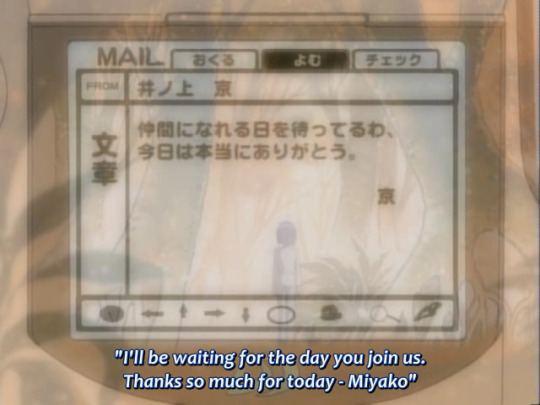
So, at this point: Within only one episode (and, in-universe, one day), Daisuke and Miyako landed on the same page with their ideological stance towards Ken. They’re both open-minded and forward-thinking, and have an interest in becoming his friend (the next person to show active and open goodwill towards him, Hikari, won’t do so for another 9 episodes). However, despite their surface temperaments being somewhat similar, they have some differences in their priorities and way of approaching things, and it means that each of them ends up reaching out to Ken in ways that the other isn’t as good at. Daisuke, being the very practical and simple-minded sort who doesn’t overthink things or get caught in arbitrary philosophy, is the one who most proactively reaches out to Ken and most famously connects with him the most due to Ken very badly needing guidance in how to move on forward and stop getting fixated on his past. Miyako, on the other hand, being very much the type to consciously think about things (to the point of sometimes thinking about too many things at once) and focus on “how do I most show my support for someone right now?”, puts her priorities on checking on Ken’s current emotional state and actively attempting to glean his feelings and position. 02 being a series about relationships and what people can provide for each other, this ends up reflecting on their roles in the group as a whole -- Daisuke becomes the person who can pull everyone forward in determining the best thing to do, whereas Miyako fills in the parts his rough-around-the-edges demeanor doesn’t quite cover in terms of supporting everyone emotionally and keeping them together.
And thus, Miyako resolves to “wait” until the day Ken will join them -- that is to say, she takes the stance that Ken deserves proper space and to come on his own terms. It’s an interesting inversion of the usual roles you’d expect from Daisuke and Miyako at this point -- and, again, since 02 is about relationships, “each character’s approach towards the new kid and how it impacts them” reflects a lot about their own characters. For Daisuke and Miyako, who were open-minded towards Ken early in the game, you can already see the impact on them -- the necessity of reaching out to Ken causes the normally deferential Daisuke to become more proactive and put his foot down, whereas the normally uncontrollably in-your-face Miyako comes to understand when something needs to be handled delicately and starts getting a better grasp on the concept of restraint.



Which means that Miyako’s actions regarding Ken in the following episodes are significantly more passive than Daisuke’s are, but it’s clear that she’s still supportive. Moreover, it’s also important to establish that she and Daisuke aren’t fighting about this or anything -- Miyako does want Ken to come around eventually, so she doesn’t stop the more proactive Daisuke from reaching out to Ken in an important way, but she instead exerts her position in ways such as joining in with the others reminding him that Ken might have gotten a bit emotionally overwhelmed by the Jogress (and thus that it’s understandable that he might need some time to parse this before pushing the issue further). The way Miyako words this statement so casually can easily be a distraction from the fact that she is completely correct -- as we see later, Ken did emotionally freak out the moment the incident was resolved and had to go home to think about this. Scatterbrained as Miyako may seem, as the series proceeds, it turns out that she has a natural propensity for empathy that means she’s capable of making perfectly correct readings of the situation, even without her thinking that hard about it.


Not that she’s correct all of the time, though. 02 episode 30 has her attempt to get Ken and Iori to hopefully be a little less tense around each other end in complete disaster (although to be fair to her, it’s not like she and Daisuke were particularly forceful about it, it’s just that their plan was so poorly set up that it was too easy to read the motive behind, and it’s ultimately thrown off because -- as Daisuke correctly points out -- the two are being really childish about it.) But in response, Miyako takes direct action and responsibility to fix the situation when Ken continues to refuse to help despite how badly the situation is escalating, and when she finally reaches him, she gets frustrated at the fact he’s being so stubborn, smacks him, and personally drags him back over. Miyako cared a lot about this, she had wanted Ken and Iori to get along for no reason of personal benefit to herself but more because she cared that much about the group’s dynamic and friendship, and she’d held herself back so much because she was worried about him, but here he’s taking all of that and still giving them all the cold shoulder when everyone is in grave danger, and all of that frustration causes her to break down at once.
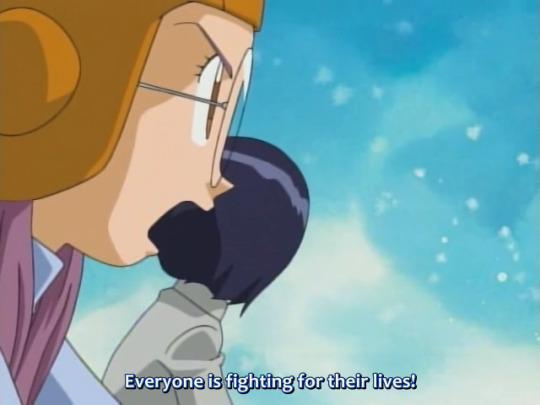
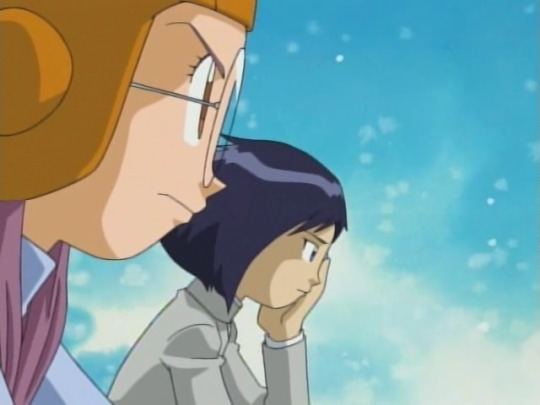
And note Ken’s reaction -- he’d been holding off on the grounds that he was being a burden on everyone’s friendship, but he sees Miyako distraught and upset and calling him an idiot (i.e. his whole pretense of not hurting others has clearly not worked here), and his “idiot...?” comes out flustered and off-guard, and he shows no resentment towards her thereafter and comes quietly with no protest, even holding a hand to the place she’d smacked him as if mulling in agreement that he deserved that. So, again: Even when Miyako is coming to all of these conclusions in a haphazard manner, it doesn’t change the fact that her readings of these situations are often completely correct.
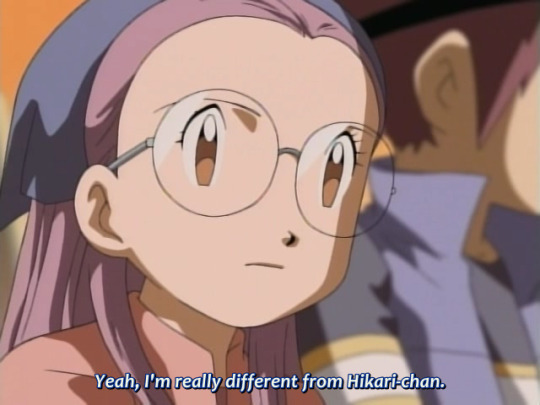
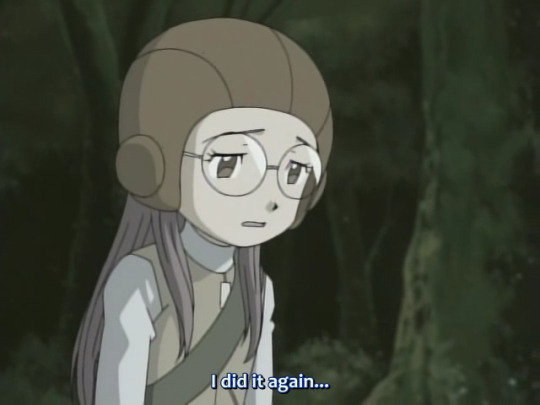
02 episode 31 is another landmark episode in which we get a lot of insight into Miyako’s current feelings regarding herself in comparison to others, and what she’s trying to achieve at this point in the series. Daisuke makes an offhand remark at the beginning of the episode about Hikari being more “kind” than Miyako (”kind” having a double meaning of “gentle” in Japanese, so Daisuke’s mainly referring to Miyako being such a rough and belligerent person). The way Miyako takes this statement indicates that Daisuke had accidentally just hit a very deep-seated complex within her -- Miyako had never liked the fact she was aggressive and belligerent and in-your-face (remember, back in 02 episode 14, she was constantly negatively comparing herself to Mimi for not being as good of a person as her, and now this has extended to Hikari, who “keeps so much inside”.). As the crisis in the episode escalates, Miyako continues to fall victim to her foot-in-mouth syndrome, saying things and instantly regretting it, because she sees herself as making the situation worse -- and especially when it comes to a situation also involving Ken, whom she’s actively trying to reach out to right now. Her frustration at the fact she can’t see what Ken and Hikari see is because, unable to understand what they’re talking about or what their feelings are, she’s basically a sitting duck who can’t do anything while things are getting worse for them.
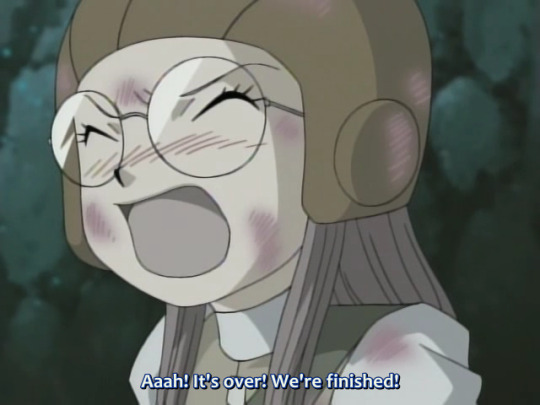

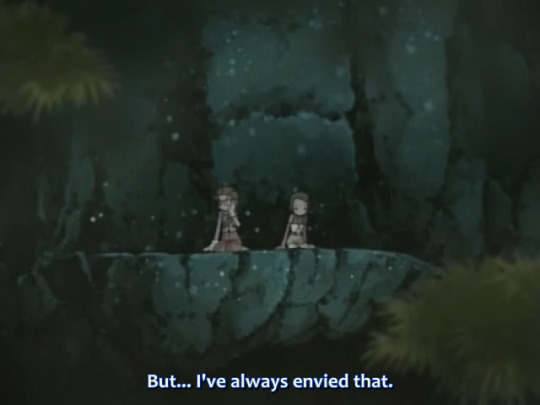

Which ultimately results in Miyako completely losing her marbles and Hikari having to smack her out of it -- again, recall that in 02 episode 18, it was shown that Hikari is one of the few people who has enough assertiveness to be able to rein in Miyako’s behavior, and even outright admits that Miyako is a bit of a handful. Miyako, as it seems, had been carrying a complex that Hikari had been thinking of her badly for all of this -- but Hikari then proceeds to reveal the flip side of all of this: she’s also conversely jealous of Miyako for being able to express herself so clearly and easily, because she herself is the type who compulsively represses her own feelings about herself, which is why nobody had been able to properly reach out to her for the duration of Adventure and 02.
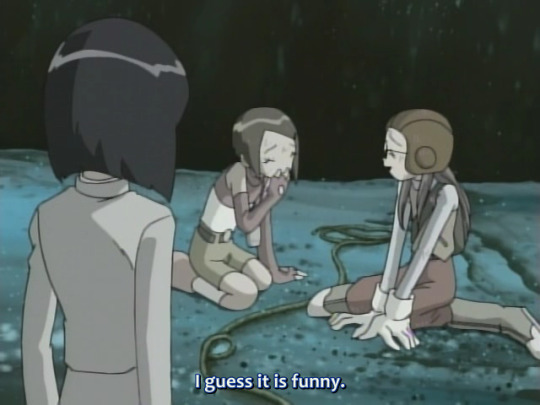
For someone who had spent so much time considering herself a “bad person” and a “worse person” in comparison to people like Mimi and Hikari, that someone considers her qualities outright enviable is a huge deal -- it’s not that Miyako’s an objectively worse person than all of the other people who aren’t as rough or in-your-face, but rather, that those qualities can bring out positive things in their own way. And, immediately after that, we see one of those things -- she makes Hikari laugh, thanks to her antics. Of course, it involves Miyako being a bit all over the place and making a lot of mistakes, but even she admits “I guess it is funny.”


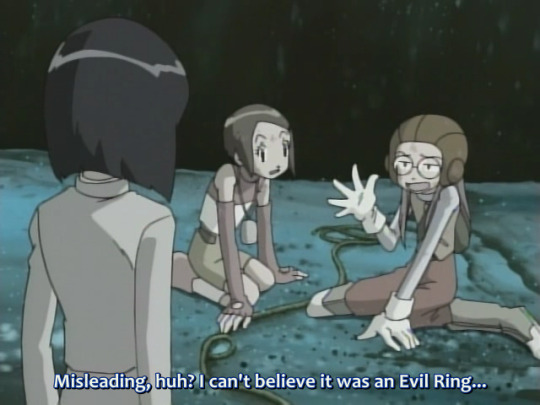

And there’s another thing to this, too: Miyako continues to end up with foot-in-mouth as she casually refers to things like the Evil Ring and Ken being the Kaiser with zero fanfare, before realizing seconds after that she probably shouldn’t be doing that in front of him, but, once again, even without her realizing, her evaluation is not incorrect -- although the fact he’s extremely out of it doesn’t make that clear quite yet in this episode, Ken is not the kind of person who’s touchy about acknowledging that he was the Kaiser, and, by his own statement in 02 episode 23, his stance is that he wants to “accept everything about it”, take responsibility, and move on. So here we are with Miyako, who just casually tossed that statement out like it was no big deal, has accepted his past with no lingering grudge against him, and even made a casual evaluation about him presumably having the same resilience he had as the Kaiser, which, again, is completely accurate. All of this is exactly the kind of attitude that Ken needs to be surrounded by right now, and Miyako had just touched on this without even thinking that hard about it, and also is still making it clear she doesn’t want him to feel bad about it...

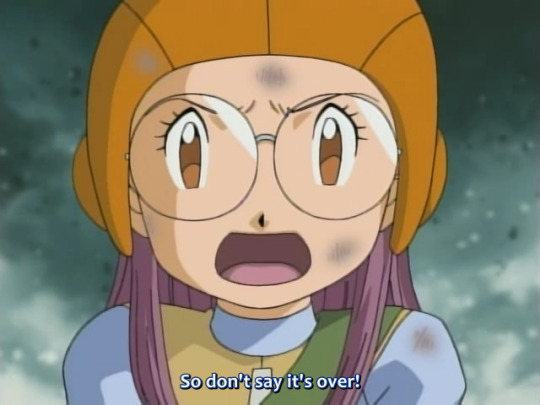
And so, the episode’s climax has Miyako finally attaining the solution to the question of reaching out to Hikari, the one that nobody had been able to successfully accomplish throughout Hikari’s childhood of never expressing herself properly and the majority of Adventure and 02: to get Hikari to stop being so passive and accepting her inevitable fate because she doesn’t want to burden others, someone as aggressive as her will need to reach her and yank her out, and hit all of the exact points about understanding that someone will be there for her and that she should not accept this defeatist mentality. Hikari is unusually, unhealthily passive, and Miyako, being outwardly aggressive and someone who never hesitates to be blunt about things, is the best person to yank her out of this; it was never a sign of her being a “bad person”, just something she needed to channel in the right direction.
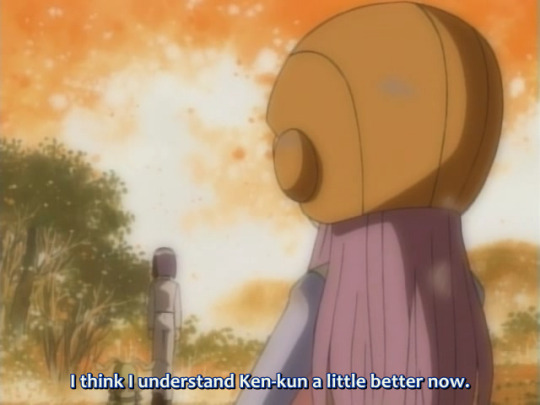
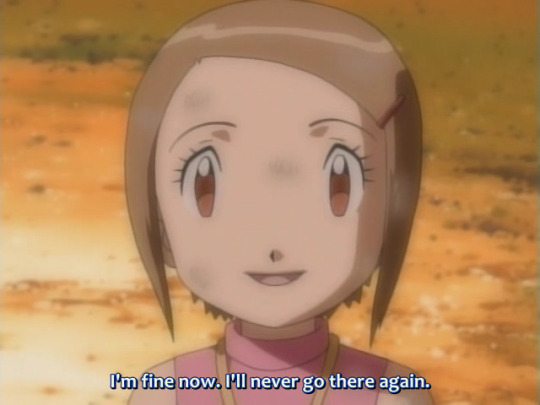
At the end of the episode, we’re also reminded once again that this is a series about relationships, so this kind of growth is important to everyone’s relationships with others as well -- thanks to Miyako’s efforts, Hikari is finally able to speak honestly with Takeru in contrast to her way of leaving off in silence with him at the end of 02 episode 13, and Miyako herself is happy that she’s finally gotten to have a better understanding of both Hikari, whom she herself had been unsure about the position of earlier, and Ken, whom she’d been worried she hadn’t been reaching out to in the right way.

While Ken was out of it during said episode and unable to coherently respond, we do get confirmation that he himself has hopped on the train of respecting Miyako’s intent well enough that he doesn’t hold anything over her -- during 02 episode 33, a mere three episodes after she’d personally slapped him in the face and two episodes after he’d practically seen her at her emotional worst, he still takes it upon himself to personally deliver Poromon to Kyoto and trust her to handle the rest. This isn’t that particularly interesting by itself, but moreso in terms of the context this is in -- this is a point where Ken’s still at awkward arm’s length with a lot of the team (including even Daisuke, in some ways), and he’s seen Miyako do all of the above messy things only not too long ago, but he still is comfortable enough around her and trusting enough in her abilities that he’s okay with casually approaching her and saying “you got this.” So it’s working, all things considered!
We also learn that Miyako had trusted Koushirou with Poromon during her trip to Kyoto, which says a lot about the fact she trusts her senior that much -- and, on a meta level, seems there specifically to facilitate the existence of the above scene (it would have been very easy to save time by just having Poromon accompany Miyako from the get-go and ending Ken’s involvement in the episode at his conversation with Koushirou...).
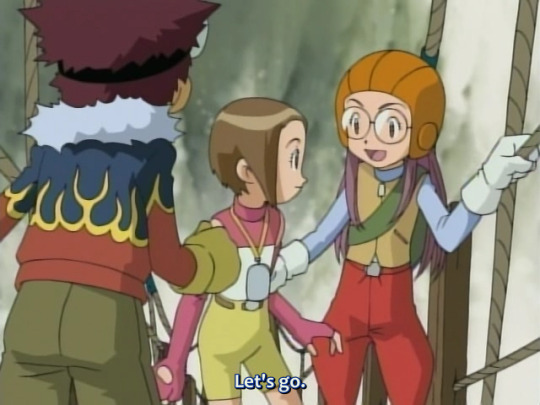

The following episodes also meanwhile establish that Miyako’s relationship with Hikari has been improving a lot -- with Miyako now actually understanding what Hikari needs, she’s much more proactive in reaching out to Hikari, and it’s even said directly by Iori in 02 episode 36 that their relationship seems to have gotten much better now. And, once again, Miyako’s antics are depicted as making people laugh -- note her and Hawkmon’s over-the-top advertisement performance doing so for everyone in the vicinity.
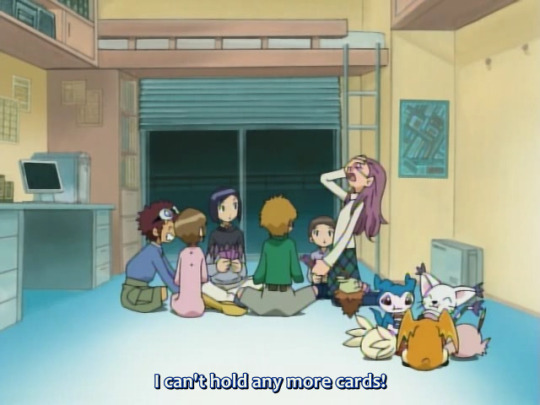

Which is also reinforced, again, in 02 episode 38, when this even spreads to Ken himself, in a moment that’s said to be particularly unusual and portrayed as one of the first times Ken has been able to be truly carefree in a long time. Again, the point here is: Miyako’s “all-over-the-place” nature brings joy to other people, and that “she makes people laugh” is continually reinforced as a symbol of this over the course of the second half of the series.
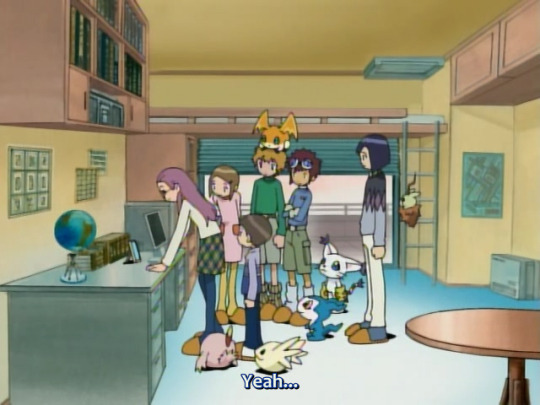
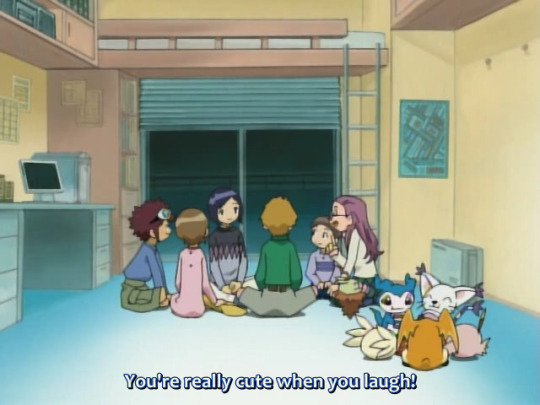
Beyond that, the visit to Ken’s house kicks off with Miyako noticing the picture of Osamu and asking about it, to the point she’s shown leaning over and staring at it for quite a while -- Koushirou had allegedly informed her about it earlier, and a whole point is made that she’s the one very prominently wanting to understand more about Ken and his background.
Also, Miyako reminds us all that she still does think Ken is attractive, but it’s a huge contrast to her behavior from back in 02 episode 8, when she knew nothing about him except that he was some celebrity genius boy -- she got completely worked up about it, moped about it for a whole day, and even dragged the fixation into the next day when she started aggressively confronting Daisuke about it, but we’re here 30 episodes later with Miyako actually considering him an important friend that she respects the feelings of, and she simply casually tosses out the statement of him being cute in her usual “like it’s commenting on the weather” manner, with no extra weirdness about it.



We close up some of the threads of Miyako's character arcs when Miyako herself is forced to confront the possibility of fighting an enemy to the kill in 02 episode 44, and Silphymon is eventually forced to kill LadyDevimon to save Miyako's life. Miyako’s emotional reaction is given the most attention here, since she herself had fixated so much on the horror of potentially killing Golemon back in 02 episode 25 -- in fact, everything Miyako does in this episode is about her emotional empathy and empathy for others, in that she rails on LadyDevimon for being a “coward” who hurts other people. Eventually, it’s once again the assertive Hikari who’s able to get her back on her feet by putting it in a way she can understand -- they were not doing it out of a callous and cruel intent to kill, but to save the exact victims that Miyako herself wanted to prevent.
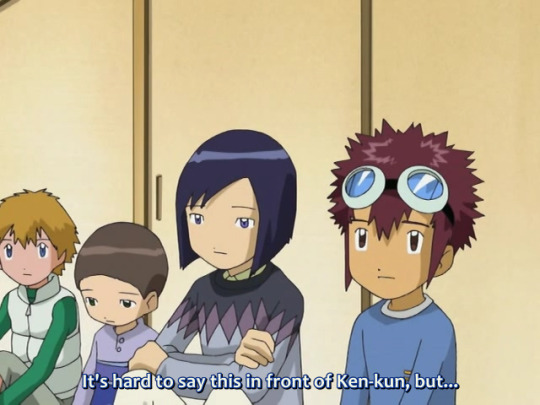
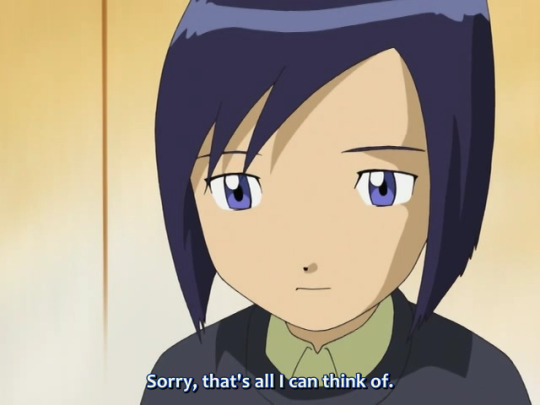
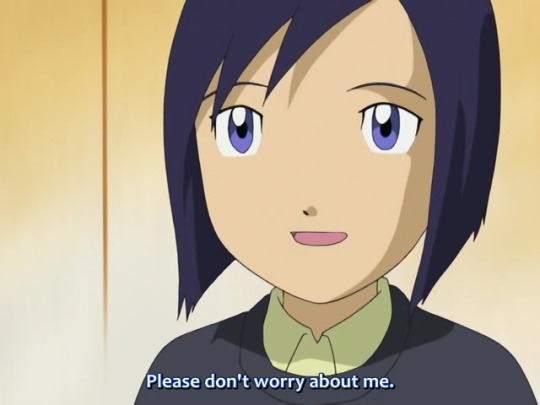
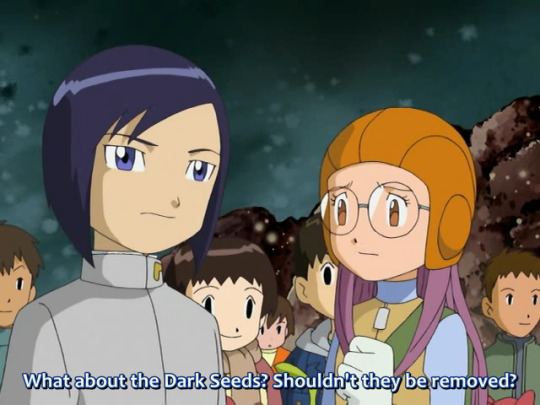
And, even to the very end of the series, Miyako continues to channel her proactivity into emotional awareness first and foremost -- 02 episode 46 has her take the lead in the Dark Seed roundtable, and it’s implied that she’s doing this mainly because she knows this is a very personal issue for Ken to have to witness. In contrast to the way she frantically started spitting out potentially insensitive things in front of Ken in 02 episode 31, here, she outright says that she doesn’t want to make him feel bad about this (and, fortunately, he understands perfectly well that she’s trying). Even all the way to the very end in 02 episode 50, she’s the one who first brings up the question of the issue, because of how emotionally invested she got into this and her high level of awareness as to how deeply this impacted Ken.



In 02 episode 49, BelialVamdemon presents everyone in the team with a potential deep-seated desire that none of them want to admit, and in the case of Miyako’s, it ends up being a rather tame thing in comparison to Iori and Takeru’s more severe family issues, Hikari’s desire for WORLD PEACE!!, and Ken’s complicated feelings about punishment and forgiveness. In Miyako’s dream world, she’s just eating cake, and it says a lot about the fact that were it not for the fact that she overthinks things and often gets easily stressed, she’s fundamentally fairly free of deep-seated issues in a way not entirely dissimilar to Daisuke’s simple and pure-hearted way of life.
The thing that causes Miyako’s issue is often misinterpreted to be about her selfishly wanting everything to herself, or the idea she’s fighting for attention with her siblings, but Hawkmon actually says what the real problem is in direct words: her crowded family is “noisy”. Or in other words -- Miyako, being the overly empathetic type and someone who easily succumbs to stress, is just really overwhelmed and stressed because of everything around her.
An interesting thing about Miyako’s “illusion” is that it’s the only one that in itself starts making its victim feel lonely and sad even before it’s taken away or dispelled -- Takeru and Iori had to have their happy images pulled away from them, Hikari had to have Tailmon clarify that everything is fake, and Ken had to have Wormmon personally chase the image of his brother away. But in the case of Miyako, all Hawkmon has to do is ask if she’s happy right now, and she’s quick to admit that she’s not. It’s just that everything was stressful and overwhelming and there was so much to deal with all of the time, and for once she wanted to be able to enjoy a little peace, but she loves her family and she loves everyone around her and she doesn’t want to be alone, and she’d rather have them back even if it’s stressful. Miyako’s love for others is so strong that even an illusion supposedly made to cater to her won’t make her happy if everyone’s gone.

Miyako also takes the moment to realize that for all Hawkmon’s been going out of his way to be steadfast and loyal to her, she hasn’t been doing enough to understand her own partner in turn, and there’s still a lot more she can do in terms of thinking of others.
Miyako after 02
As per Spring 2003, once Miyako graduates elementary school and moves to middle school, she continues trying to be helpful to her juniors -- she joins the computer club and once again ends up under Koushirou, and now outright makes music for Yamato’s band (some creative differences aside). It’s also interesting to note her attitude towards her other friends when she tries to recruit them into her music unit -- she snarks at everyone right up until she gets to Ken, who declines politely, and in exchange, she just can't bring herself to be mean to him and simply apologizes for asking too much. It’s ambiguous whether this is because she’s still trying to have a heightened level of consideration around him (this is still only four months after 02′s finish, after all), but it seems she’s still concerned about the idea of handling him overly roughly, and is able to exercise a proper level of restraint about him.
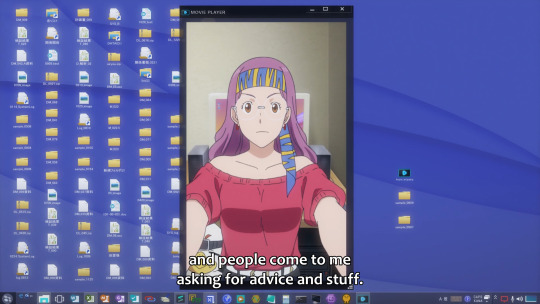
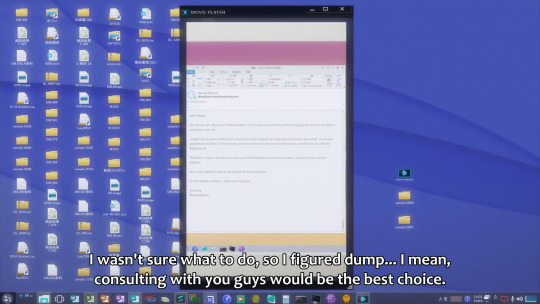
Which brings us all the way to Kizuna, a whole eight years later where we have to fill in a lot of blanks about what’s been happening in the meantime, but the official website establishes that she’s now pursuing a degree in computer programming at an engineering university, and is now on study abroad in Spain (implied to be Barcelona, given details in both the movie itself and the drama CD). Pretty ambitious stuff!...or at least that’s the first impression one would get, until it turns out that she’s getting her flighty personality enabled by the local culture. As we learn in the drama CD, she’s absolutely taking the time to milk this entire situation so she can play around -- and, in accordance with how she was established to be an important factor in bringing Hikari out of her shell, it’s rubbing off on Hikari, too.
In addition, Miyako is still working under Koushirou despite their educational careers having completely diverged, this time as his assistant in terms of managing the Chosen Child community. Interestingly, her specific job seems to be consultation, and people come to her for “advice and stuff” -- meaning that it’s very likely that a lot of new Chosen Children who are having a hard time adjusting to life with a partner are coming to her for practical and emotional advice, and she’s still continuing to channel her ability to be emotionally aware and supportive of others.
That is to say, until she gets a mysterious request from a certain Menoa Bellucci. We learn later that Menoa’s motive was to obtain the list of international Chosen Children, meaning that she most definitely was not approaching Miyako for emotional help, and with that, Miyako decides that she doesn’t want to do this and dumps it on her seniors...
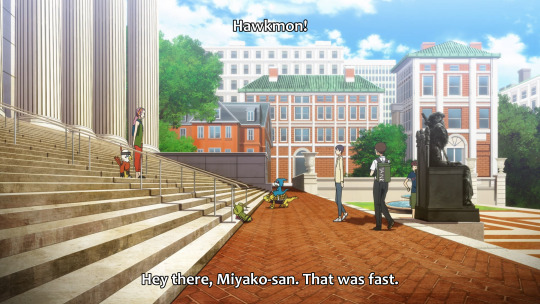
...but then picks it back up with zero hesitation the moment her friends present her that exact same job, and not only is it just “zero hesitation”, Ken even comments on how “fast” she arrived to do so! (This was also before Iori came up with the plan to infiltrate Menoa’s office; there wasn’t any indication Miyako’s computer abilities would be particularly necessary at the time.) On top of that, the drama CD gives us full context as to why she was so willing to dump this on her seniors in the first place -- she had wanted to see her friends so badly that she practically invented D-3 gate exploitation so she could hang out with her friends despite technically being in another country, and even wanted to invite them to come visit her, and eventually they’d all made an organized plan to meet up in New York. In other words, her loyalty to her friends is still stronger than anything else -- remember, she’s the kind of person who was picking up tons of jobs specifically so she could help her friends in the first place.
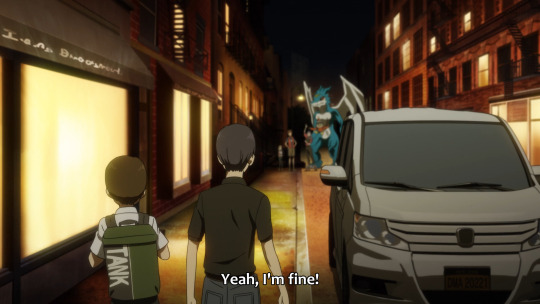
On that note, Ken’s ability to be casual with everyone besides Daisuke has noticeably improved, and that’s especially prominent with Miyako, whom he proactively converses with in a way that wouldn’t have happened back in 02, and, likewise, in contrast to the sense of distance she’d still been maintaining with him back during the final arc of 02 and Spring 2003, she has no qualms about handling him as casually as she would anyone else.
Which eventually leads us to...
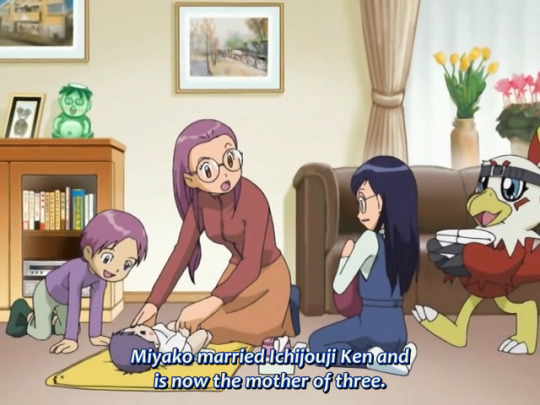
This is a recurring theme on this blog, but every so often I have to draw the distinction between creative concepts “in meta” (i.e. the way the audience will read it, in relation to franchise standards and other real-life factors) and said concepts “in-universe” (i.e. with audience factors completely removed, whether there’s a presumable logical reason for these events happening in-universe, and whether this is reasonable behavior to expect out of the characters). This blog is largely dedicated to the latter, but the reason why I have to keep drawing this distinction in the first place is that I get the impression that the staff behind Adventure and 02 really did not pay much mind to the former part as part of their dedication to the latter. And, I mean, part of the reason I respect the writing of Adventure and 02 so much is how uncompromising they were in terms of not really pandering to what a fanbase might expect, which allowed the story to retain a lot of creative integrity that it wouldn’t have otherwise.
But every so often you get something like this that makes me want to just bang my head on the table and scream, I swear, I get what you guys were going for, but I am begging you, please think a little harder about how people are going to read this!! In general, I do think there’s something that’s not very good about disregarding your audience completely, because if you’re trying to say important things and those things are going directly over your audience’s heads (this is a kids’ show, for goodness’s sake), you can’t call that good communication, and it’s not like you can blame the audience for getting blindsided or being upset, and this is before we get into what they just dropped on the global audience that was presumably full of young girls interested in STEM fields who were hoping to see them go all the way with that, or the feelings of those who are bothered that one character has to be singled out to be defined solely by her relationship to others, and I mean -- to be fair, with a character like Miyako and the tons of things going on with her, there was probably no outcome they could come up with that wouldn’t be reinforcing some negative stereotype (believe it or not, there are people who have conversely mentioned identifying deeply with Miyako’s personal story and the meaning of this ending to them, and have also expressed discomfort about some of the comments the fanbase has made over the years), but at the same time, holy hell, they really went for the one that immediately looks the worst on its face...
...That aside, I will reiterate that this is a blog and analysis meant for that latter category of “analyzing things in-universe”, and making good-faith assumptions that there was a reason for everything (and, I’ll be quite honest, reading everything the staff has said about the characters, including Miyako, there is no indication that they didn’t treat every single one of them with love and zero intention to curse any of them into a horrible fate). We can debate whether this was a good or bad choice in the context of real life, or how much they really should have thought this through more or considered alternative ways to do this, in another place and time (it’s been done by many other people, myself included, in the last 20 years, and it will most certainly continue after this, and probably should continue). It’s not like I’m necessarily giving my blessing to every single creative decision in Adventure or 02 in running this blog, it’s more of the attitude of “now that this decision was in the series, can we figure out what that was intended to mean?”, and that’s going to apply to this one too. And so, we’ll proceed with the analysis.
In any case, here’s the first thing to start with, which may surprise some people to learn: at no point in the epilogue is the word “housewife” ever used to refer to Miyako. The only words that Takeru uses to describe her are: that she is married to Ken and is a mother of three. Not only that, post-02 materials that have referred to the epilogue and Miyako’s part in it have also avoided using that word -- the Character Complete File and the Animation Chronicle only reiterate the same points of “married to Ken” and “mother of three children”, and practically go out of their way to avoid insinuating that being a stay-at-home housewife is the main focus of her life right now. It would have been so easy to say it outright if they’d wanted to, but they didn’t, and they consistently don’t, to the point the omission is almost suspicious. And, indeed, if you want to believe the Character Complete File, Miyako is not a full-time housewife and is simply not working at the time of the epilogue due to maternity leave because the third child had recently been born. So it’s completely within the realm of possibility that she’s still working! In that case, why is something that could easily be a big deal left ambiguous like this?
If you look at the way the epilogue presents its information, there’s a certain pattern: what information is emphasized and what information is given little attention or omitted has very little to do with “how curious the audience would be about it”, but rather “how relevant it is”; just because a certain piece of information is omitted doesn’t mean it necessarily isn’t true. For example, Sora; she’s married to Yamato, but despite how much the audience would probably consider that as vital information, it’s left for you to infer from the visuals and an oblique comment that Sora’s daughter is a “dependable older sister”, and even the question of whether Sora did succeed her mother in flower arrangement is left up in the air despite that also probably being a question the audience is curious about (and in fact, a few flower branches are clearly visible in the front, implying very heavily that, whatever happened, she’s at least still maintaining her roots with her family instead of violently cutting it all off). But we do learn about the fact that she went into fashion design, which is something that’s not an expectation that was placed by her family but rather something she presumably decided on herself. Hence, presumably why that’s the part emphasized, and moreso than her marriage to Yamato -- said marriage is of course an important part of her life, but it’s not as prominent as the fact that she has her own independent career, especially since her entire character arc was about doing things that she wanted for herself instead of doing things for others. That is to say, compared to their own individual ambitions, Sora and Yamato’s love life is “an important part, but not the important part.” This is especially when you add the context that Takeru is delivering abridged single-sentence “catch-up” descriptions of his friends on their behalf (possibly to the world, if this is part of his novel), and so, it begs the question: what would each of these characters want to be most remembered for accomplishing?
(And if you think I’m being tinfoil hat about this, remember that a constant theme with this blog I’m running is that “being annoyingly subtle and relying on ridiculously oblique messaging” like this permeates the entirety of 02 in general, and it’s definitely not the only time they’ve used this kind of technique to communicate details that are too consistent and on-the-nose to be passed off as coincidence. As far as assuming that this series follows rational storytelling logic goes, we are far past that point, and in ways that extend far beyond this epilogue.)
So we look back at Miyako, and the hobbies she’d indulged in and what purpose they were for, and her personality, and the fact that the main point of her character arc was about her complex that she would never be a good enough person who could properly emotionally reach out and take care of others -- in some ways, her arc was the opposite of Sora’s, in that while Sora’s was about not being as beholden to others, Miyako’s was about how to become someone who can better support others -- and once we apply the above question, there lies the answer to why the priority and emphasis given to her future in the epilogue is “Miyako is the kind of person who prioritizes taking care of and supporting her loved ones more than anything else.”

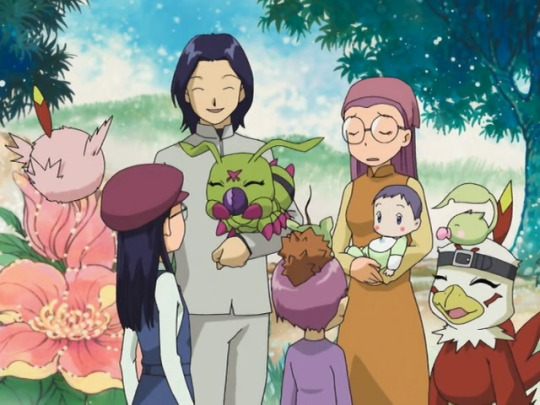
This is especially because (in an epilogue with not very many lines, so every bit of information becomes vital) the lines we see Miyako and her family exchange are representative of a lot of what that character arc was about. According to her son, Miyako is still her panicky and emotionally messy self, even when in the role of the matriarch of a large family who’s responsible for taking care of all of them. She did not ever become the ideal “gentle” and “mature” kind of person that she considered Mimi and Hikari to be and negatively compared herself to. However, her family responds by cheerfully laughing, which is -- most likely not coincidentally -- the same thing that was shown to be the positive flip side of Miyako’s over-the-top personality back in 02 episodes 31, 36, and 38, in that it brings joy and cheer to others.
If you do want to take the Character Complete File’s statement at face value, the fact that she’s on self-imposed maternity leave means that it’s very likely she wasn’t on a salaried job and was instead freelancing, or at least was involved with something that didn’t require constant commitment. Considering the fact she’s consistently portrayed as an impatient sort who gets bored easily, she probably would prefer something more flexible like freelancing or at least not being tied to a single thing; even looking back at her completely disparate hobbies back when she was a kid, when she was basically jack-of-all-trades-ing to fit whatever people needed her for, she never really came off as someone who could commit very easily to a single form of work, but what she did have commitment to was other people, especially her friends and family. If you (or, perhaps, Takeru) were to ask her during the time of the epilogue “what are you up to right now?”, it’s not really that hard to believe that gushing about her lovely family would come before everything else; not to say that everyone else here (especially her own husband) isn’t presumably devoted to their own families, but Miyako’s the type to have that much higher sense of pride in what she does for those she cares about than she would have particular attachment to any kind of work. Look at her behavior during Kizuna; she’s pursuing a degree in computer programming and thus is still aiming to be a busybody with a high level of skill, but when given a job by a stranger, she immediately dumps it off on her seniors so she can be with her friends, then happily accepts that same job again when the same friends present it back to her.
So, in other words, the conclusion is: the biggest priority and most important thing to Miyako in regards to her future is that she finally became someone who could properly support others around her, even in spite of her personality that would suggest otherwise.
In addition, the fact that she has three children might initially come off as a little in-your-face or overkill, but remember that Miyako came from a family with four siblings, and 02 episode 49 had her say outright that she does treasure that – or, in other words, being part of a big family surrounded by affection and love is something she considers to be a valuable part of her life (especially since the age gaps between the three children imply a reasonable likelihood of actual family planning, moreso than even Miyako’s own).
Incidentally, this is just a bit of a personal note, but one might notice that I’ve also never actually used the word “housewife” to refer to the epilogue’s depiction of Miyako in the course of writing for this blog, because of how little evidence we have that she is one – being on temporary maternity leave still being a very viable and, given the post-02 materials we now have, arguably heavily likely interpretation, it’s not like you’d necessarily call someone a housewife if their break from work is only temporary, even if they’re a freelancer. Given the above circumstances, perhaps something like “family matriarch” would be more accurate…
#digimon#digimon adventure 02#digimon adventure last evolution kizuna#inoue miyako#miyako inoue#kizuna spoilers#shihameta
96 notes
·
View notes
Text

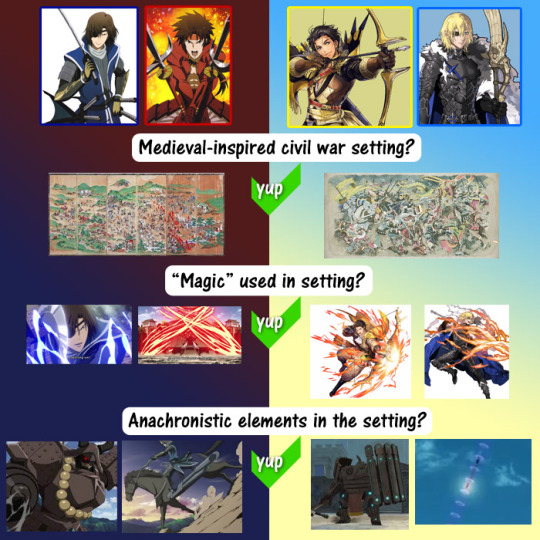

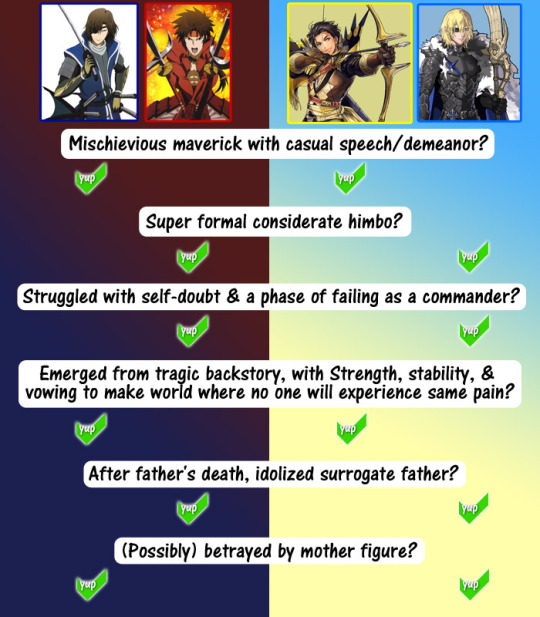
I find it endlessly amusing how after 10 years, my OTPs have circled back onto the same type. lol
I realize the Blue Lions have Dedue, and Ashe used to be a commoner. But Ashe got adopted into a higher class. Meanwhile, the Golden Deer has 3 commoners who stay commoners.
And Yukimura probably had commoners serving under him, but Sengoku Basara (2009) takes a lot of time to emphasize that Masamune's commoner associates are named, get screentime, voice his effect on them, and spent time closely serving under him. Meanwhile, Yukimura's only named subordinates seem to also be lords or ninja, more than basic commoners.
When referring to "self-doubt & a phase of failing as a commander", I'm specifally referring to Sengoku Basara (2009) season 2 for Yukimura. That's pretty much most of what he does that season. And he made a critical decision error as a commander that got one of his major subordinates killed and probably also unnecessarily killed some of his other soldiers. Though I am vaguely aware that in one of the videogames, Yukimura similary spent most of the story in self-doubt, after thinking Takeda was dying, and I think he ran his army around doing actions without enough thought.
And of course, with Dimitri, I'm referring to his post-time-skip phase wherein he went full "boar" and refused to properly lead his army. Though after regaining more mental stability and becoming a proper general, he still gets haunted by self-doubts for the rest of his life.
When I spell "Strength" with a capital "S", I'm usually shortening my term "True Strength" and referring to both a mental and emotional fortitude, resilience, and frequently an iron resolve in Compassion. That's just my personal philosophy in defining "True Strength". Personally, I see 2 definitions of "strength" that both converge at Compassion, to define "True Strength". 1) In an amoral sense, strength is resilience in maintaining one's own "soul pattern"/emotions/resolve, without being swayed or influenced by outside forces to change. 2) In terms of defining strength as the ability to do what is most difficult, in my opinion, Compassion is the most difficult. Not only do acts of Compassion often cost a range of efforts from some to exorbitant, but it can also require the enacter to put themselves into a vulnerable position. So it is often something only the strong can afford, or survive, or disregard fears of being vulnerable or taken advantage of. Therefore, in my personal opinion, converging the 2 definitions into an unwavering resolve in Compassion, is my personal definition of "True Strength".
So when I categorize Date Masamune as having Strength, I mean he is unwavering in his resolve towards Compassion. Sengoku Basara 2009 takes a lot of instances to reiterate that Masamune cannot be swayed, his Resolve is unquestioning, no one can stop him, slow him, or change his mind. His catch phase is "pressing onward" (translated as "full speed ahead"). One of his first scenes is charging ahead, disregarding Katakura's warnings for caution. (Notice that in Judge End, this is framed as foolish brashness, but in Sengoku Basara 2009, Katakura smiles and continues following without worry, because he completely trusts Masamune's instincts and decision-making. Because everyone trusts Masamune 2009 to always make decisions based in the best ideals/Compassion.) This is reiterated throughout season 2, when Masamune makes allies and each of them ask him to change directions, but the most they can do is temporarily slow him down, because he doesn't stop moving forward. This Strength directed in outward Compassion towards others is almost unexpected after considering Masamune's historical backstory. One would think that someone betrayed by his mother would become disillusioned and spiteful towards the world. It's a basic supervillain backstory to be betrayed by a trusted figure, especially during fundamental development. But instead, Masamune seems to want only to protect others and bring the whole country under his command, so that the whole country of people can be under his umbrella of protection. The 2009 series only mentions his regret from one of his early battles where lots of his soldiers died, being his major motivation in protecting others, specifically his soldiers. But I've headcanon'ed a lot that can be extrapolated from his historical backstory, that when in conjunction to his actions in Sengoku Basara 2009, portrays a Masamune who has dedicated himself towards Compassion, despite his tragic backstory.
Similarly, Claude's backstory is tragic, yet he emerges with True Strength. I've heard criticisms within the fandom that Claude growing up experiencing so much bullying and discrimination against his being biracial, could not believably yield a person dedicated towards Compassion. But I think that's just brainwashing from too many supervillain tropes telling us that traumatized and mentally ill people invariably become villains. I've heard it's more realistic that people who have experienced trauma, tragedy, or some kind of pain, actually are more likely to increase their ability to empathize/sympathize with others, consequently becoming more compassionate. (Mentioned in https://youtu.be/bHe2seINnE0 at 2:03/9:09; https://youtu.be/zaZYDK1RcEU) Claude experienced descrimination and bullying; he explicitly explains in FE3H canon that he wants to create a world where no one else has to experience that same pain. I really don't see why this can be an unbelievable characterization to some people, when most of the world admires Batman for literally that same reason. And I think that characters, like Claude, who react to trauma and hardship with altruism, demonstrate a True Strength in their characters. They haven't been broken by their trauma. They not only survive, but survive as people who still want to care for others. (Also why I love Natsume Takashi.)
I was tempted to include Dimitri in the category of "Emerged from tragic backstory with Strength and vowing to make world where no one will experience same pain". But he didn't emerge with the same level of flawless Strength that Masamune and Claude did. Dimitri certainly did resolve to protect others from ever experiencing the pain that he felt, after the Tragedy of Duscur. But he was also not as mentally stable. He was so repressed and internally conflicted (concerning his feelings of vengence, or sadness that didn't know how to be expressed as anything but anger, lest he break), that he didn't integrate his "boar" impulses/emotions until much later in his post-time-skip. I didn't feel that Dimitri was a fully reconcilled version of himself, until after he had accepted his "boar" emotions, stopped repressing his unresolved anger, and learned to express them more appropriately or at more appropriate times. After he became more mentally/emotionally stable, I have no doubt that he still can have episodes of rage, anti-social moods, or crippling survivor's guilt, but I think he no longer allows those feelings/episodes to push away the people he cares about or disregard his true personal desires to be kind/protective towards others. He knows how to deal with those feelings now. But he spent a long time not yet at that stable level, until much later. Until then, he was frankly wavering, conflicting with his personal resolve, denying his own ideals, and allowing his survivor's guilt manifesting as ghosts to sway him away from his true desires/motivations/values of Compassion. Dimitri was Weak for a time. So I can't say that he was in the same category of Strength as Masamune and Claude.
Dimitri's backstory of his father's death and idolizing Rodrigue, after he took him in, is information he canonically tells the player.
But I realize that Sengoku Basara 2009 never actually mentions a backstory like this for Yukimura. I'm actually referencing the takarazuka version of Sengoku Basara. In that play, they include a childhood backstory scene, where Yukimura's father was a subordinate of Takeda and died while protecting him. Young Yukimura blamed Takeda for his father's death and went to punch him out. Because Takeda understood that Yukimura needed catharsis and was trying to reconcile with his grief, Takeda allowed himself to be punched. But he also punched back. I think maybe to encourage Yukimura to keep going? I can't remember. But eventually, Yukimura punched out all his anger and only had energy left to finally cry, and Takeda said something that comforted him. From then on, he called Takeda "Oyakata-sama" and became completely devoted to him. This explained the origin of the running gag from the 2009 anime, wherein Takeda and Yukimura engage in fist fights as a form a bonding. (It's a shame that the video of these scenes was taken off YouTube. ;_; ) I don't know if "Sengoku Basara Sanada Yukimura-den" mentions how Yukimura's father dies, since he finally appeared in that game. So I'm referencing the takarazuka version.
There isn't really mention of Masamune's mother in the 2009 Sengoku Basara anime. The closest, was Masamune's maternal uncle appearing in the movie "The Last Party" that ended that anime series. But historically, after the real life Date Masamune survived smallpox at a young age, and lost sight in his right eye, there was a lot of dissent among the other high ranking people within his clan, concerning his continued position as the Date clan's head. A lot of this dissent was lead by his mother, who insisted that Masamune's younger brother should become the new clan leader instead. Some accounts say that to shut up accusations that Masamune was weak and that his faulty eye was just an advertised weakness that enemies would take advantage of on the battlefield, Masamune either pulled out his own right eye or ordered Katakura to do it. Apparently, that shut up everyone except his mother, who still continued to try undermining his position. I don't know if there was one instance of several, but she also tried to kill him through poisoning, to replace him with his brother. Because of this, Masamune's only choice was to kill his own little brother, which forced his mother to run back to her original clan. (I can only assume that Masamune didn't just kill his mother, because it's possible she indoctrinated his brother to ursurp him. So Masamune might have ended up eventually needing to kill his brother anyway.) Lots of us in the Sengoku Basara fandom like to headcanon that all of this happened for the Basara version of Masamune too.
It's my understanding that Cornelia implicated Dimitri's stepmother in the murder of his father and friends at the Tragedy of Duscur, but that things were still left canonically vague. Personally, the fact that Patricia was always kind to Dimitri, combined with the fact that Cornelia is proven duplicitous, I find it difficult to believe that Patricia intentionally betrayed Dimitri. The way Cornelia described it, she offered Patricia a chance to be reunited with her daughter Edelgard, Patricia confirmed that desire, then the Tragedy of Duscur happened. Given that Cornelia was already doing terrible things behind Patricia's back, like experimenting on Hapi, and Patricia being angry at Cornelia when she discovered Hapi, I doubt that Cornelia would have been fully truthful with Patricia. I imagine Cornelia tricked Patricia into opening a path or lowering some defenses to "allow a clandestine meeting with Edelgard", but then Cornelia would probably use it to sneak in enemies to kill Dimitri's father and friends. That's my headcanon theory on the Tragedy of Duscur anyway. So Dimitri was only *possibly* betrayed by his mother figure.
And that's my comparison between DateSana and DimiClaude/DMCL/ClauDimi. It continuously amazes me how similar these ships are and how my shipping has come full circle. lol
#datesana#dmcl#dimiclaude#claudimi#claumitri#otp#OTPs#comparison#relationship dynamics#amusing#random thoughts#shipping#fandom#sengoku basara#fe3h#my otps#rambling#character analysis#canon characterization#headcanons
17 notes
·
View notes
Text
Death of Me (Chase Collins x Dark!Witch!Female Reader) - Part 1
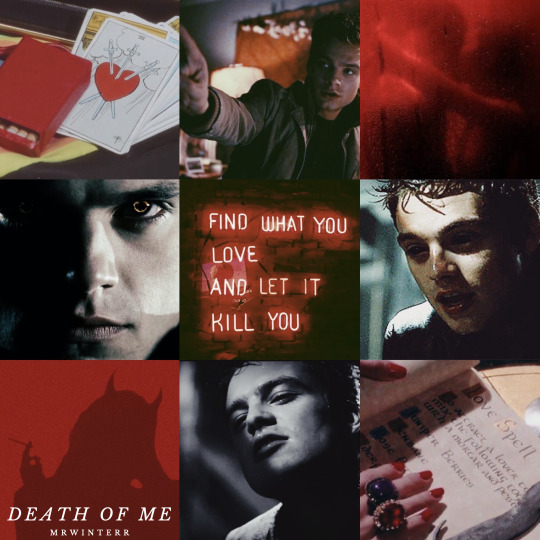
Series Masterlist || Main Masterlist
Pairing: Chase Collins x Dark!Witch!Female Reader
Summary: The reader is addicted to the idea of love and Chase is addicted to the idea of ultimate power – both can help each other out.
Warnings: Movie spoilers for The Covenant (2006) and The Love Witch (2016). Supernatural elements [witchcraft], dark themes [mentions of death and really bad people] and smut [18+ only please].
Disclaimer: This story contains dialogue, characters and references taken from both films. It essentially follows the plot of The Covenant with a reader insert. The reader is loosely based on the main character of The Love Witch. I take no credit for any of those elements used. They belong to the creators of the films. I just wanted to try my hand at having these worlds crossover.
Title Inspiration: “Death of Me” by New Politics
A/N: I don’t know who still reads Chase Collins fanfics, but I wanted to get this one out. This will have multiple parts. Comments, likes and reblogs are all appreciated! Enjoy!

Now entering the town of Ipswich.
It’s a bit dreary, but that didn’t bother you. It always appeared as if a dark cloud followed you. Miles and miles away from the city you last called home, driven away by another failed attempt at a relationship – you were no stranger to those – was becoming somewhat of a routine for you.
The earliest unsuccessful relationship of yours recorded was with your parents. They were hardly a part of your life to begin. It wasn’t like you didn’t try at building one with them; they were the ones that didn’t. You might as well had been invisible to them. A parents’ love was the first kind of love one was supposed to encounter, and it was to be unconditional. They simply didn’t care for their own daughter and it hurt you. Maybe if they showed you any ounce of love or what it was really like perhaps you wouldn’t be so obsessed over trying to understand it. Ironically for two individuals who expressed no love at all, you had so much of it. It was just the matter of finding the right person to give it to.
For as long as you could remember, you’d been fending for your own. So, the first thing you did when you managed to save enough money, you packed up and left your parents. The next city was supposed to your second chance, but you were so young. You hadn’t even begun to plan your own future. Hell, you were living in the car you’d purchased on your own by accepting countless odd jobs and getting paid under the table. For a few months, you had waitressed at a small restaurant, where a group of interesting people, to say the least, caught your attention.
They were regulars to the eatery and had been watching you with a purpose. They could smell you were somewhat of a troubled youth that needed guidance. They welcomed you to their inner circle and soon into their coven. Yup, they were witches and surprisingly that didn’t bother you about them. They were good people to you. You owed it to whoever these people worshiped because they helped provide you an education, shelter, food and lessons in magic – practicing spells and concocting potions – and even more so in taking back control of your own life. This was now your family. You finally felt a sense of belonging with this group.
None of them had any actual internal powers, but they each individually excelled in different aspects of the craft. They taught you how to focus on concentrating energy, using your magic, to gain results; if you could achieve that you’d be the one in control, and essentially have power over the subject. You also learned that there were different types of witches – ones that were made into witches and ones born as witches. You had never known to encounter one that was born into a bloodline, but you had been warned that they would be much stronger than you, so that alone motivated you in perfecting the craft should one come to you as a threat.
You became enamored by witchcraft. You felt reborn through it. In a sense, it saved you. On top of that, you had nothing to lose, so why not sell your soul, right? While you certainly felt loved by the witches, you still yearned for a different type of love.
The first failed relationship in which you were intimately involved in was with a guy your age at the time. Looking back at it, you can’t help but to laugh. Oh boy, what a mistake that was.
With the help of your newfound family, you were able to enroll into the local high school. Unwanted attention came with the territory of being the new girl and you were no exception to one of the most sought-after guys in your class. The next thing you knew, you were losing your virginity to him then only for him to leave you the following day. At that tender age, you thought you loved him, and you wanted him to love you. This is why it was comical. What did you know about love at 16 anyway? So impressionable and so naive.
This was the first time you experimented with love spells and potions and he was your first victim. You had been warned about messing with love spells before, but what spell didn’t come without a warning? It seemed to work, but the more time you spent with him the less you wanted to. It turned out he wasn’t in any way what you wanted at all, an even bigger mess than you were portrayed...and maybe even loved you too much. At least that’s what was mentioned in his suicide note.
His death traumatized you for the first few months and the High Priestess decided it was best you continue elsewhere. Initially, that scared you because you thought they were kicking you out, but you were bonded to them and, with another warning about love spells, she assured you that there are plenty of their kind willing to take another in, you’d just have to be sworn in all over again.
As soon as you recovered a year later, with the immense support of your new coven, you were almost an adult and ready to find the one...the new one. And this one seemed to have it going for him. He was attractive, smart and respectable, but he just had too many feelings and it turned you off. He was a fucking pussy. You swore you could still hear his sobs ringing in your ears. You wanted to love a man, not care for a child. The mental institution he ended up being committed in would be able to give him that.
You moved on fairly quickly not wanting to be reminded of the previously failed conquest, however, you should’ve seen the next one coming, but, again, you were hopeful. Third time was not a charm, it was a tragedy. Two lost individuals, one with a broken past and the other battling with substance abuse, trying to find solace in each other was a recipe for disaster. His problems were soon becoming humdrum. As if you didn’t have any problems of your own to deal with, but who was ever there for you? He constantly ached and ached for you, begged for your help. Fucking clingy. You just couldn’t bring yourself to feel remorse for him anymore. Long story short, he’s six feet under a makeshift grave. Metaphorically, he had dug it on his own a long time ago.
Determined to bounce back, you found yourself traveling to a quaint colonial town in Massachusetts. A member of your previous coven recommended Ipswich and believed you would find the one in your cards there. Not sure whether or not to believe them or if “the one” really existed and was waiting for you, the notion of having nothing to lose decided for you and made Ipswich your new destination.
You’re unloading box after box in your single dorm room, a special request you made so you could practice magic in peace, when someone pokes their head in the door you left opened. It was only open because you weren’t able to drag in some of the larger boxes inside yet and they must’ve spotted them.
“Need any help?” The deep voice causes you turn to the doorway, where a guy, who’s tall, no doubt athletic, a head full of dark hair, a hint of innocence surrounding him, greets you with a sweet smile.
“Um, yeah actually,” you reply with a smile to match the tone. You could carry your own, but why turn down the free labor and perhaps even a show. He was cute. That much you deduced from watching the way his body moved, the skin that peeked out from when his shirt would ride up as he bent down and lifted boxes of your belongings into your room.
“Oh! Please be careful with that one!” You warn seeing the box he was currently handling marked as fragile. It contained some of your bottles and they were practically sacred to you. He absorbs the warning and places the particular box gently aside.
“I’m Tyler by the way,” he says after setting the final box next to your feet and standing upright with a respectable amount of distance between you two. You introduce yourself and offer a now genuine smile. You didn’t want to fall victim to yet another nightmare of a relationship, but you kept thinking about what your fellow member told you – the one is in Ipswich and the one could be in front of you right now.
Tyler ends up staying a little longer as you expected that night and you let him. He had a presence you didn’t feel with towards the others. There was just a different kind of energy there.
The two of you were getting along just fine, but you decided to take it upon yourself for safe measures with him and sneak in a little something you made. You say to yourself maybe he’s worth a shot. And he was. You went on a couple of dates with Tyler, met his three closes friends Caleb, Pogue and Reid, but you wouldn’t consider yourself close with them; they just came with the territory. Yet that energy Tyler had around him kept haunting you.
You weren’t sure if you were losing your touch or had a typo in your spell book, but you began to notice the effects didn’t last long with him in particular. He was almost immune to it. The spells were designed to enhance qualities and features about the other person and if you noticed any trend in using love spells was that it showed one’s true self.
Tyler started to become dull to you, like there was no sense of excitement with him. Harsh, not even magic could help you. Afterall, you can’t work with what’s already there. He had his looks going for him, he was a nice boy, and he was certainly several steps above the others in bed, but he never challenged you and you began forgetting he was even in the same room as you. You could’ve sworn he was about to cry when you told him you wanted to just be friends, but he accepted it because he was whipped. No backbone whatsoever. Well, at least he was still alive.
His loss would’ve probably hit you a little different because he was still a sweet guy…and you didn’t need to be given a reason to leave Ipswich too soon. You were just getting started here. His friends didn’t even seem to hold anything against you, not that you really cared. You weren’t interested in going down the line of the Sons of Ipswich; a little history lesson you learned from Kate, Pogue’s girlfriend, whom you unwillingly also formed a friendship with by default. Apparently, these boys were a little prominent here descending from four of the five families that colonized the town. Besides, if Tyler was boring, you weren’t willing to get into the whole mama’s boy routine Caleb kept up with and Reid proved to be too obnoxious for your own taste.
A private school full of rich kids like Spencer Academy, there were bound to be more guys at your disposal. You internally praised the member of your coven for recommending Ipswich. Your conquest to find real love never wanders too far off, but why not have some fun along the way?
Lately, you kept to yourself in your dorm; biding by with your teenage life in regularly attending your classes, occasionally hanging out with Kate – shopping or listening to her rant about another one of Pogue’s jealousy episodes – show face at Nicky’s once in a while and of course practice magic. There was a party tonight near the woods and almost everyone who was anyone was going to be in attendance. You thought you could use a break after a long week.
You parked your car nearby a bunch of others and managed to spot Kate waving you down to join her. Next to her was someone you hadn’t seen before. Kate introduced her to you as Sarah, her new roommate this semester. She seemed nice. Being in her shoes not too long ago, you decided to try and make her feel welcomed.
“So, tell me. Who is who that’s here,” Sarah asks, loosening up and it’s nice to see a sense of normalcy in your life; making new friends and having a good time like a person your age should. There’s a sense of danger and risk being at this party with violating trespassing signs, a huge fire and lots and lots of drugs and alcohol with underaged teenagers.
“First things first. Him over there,” Kate starts pointing at a source of one of your disgust, “that’s Aaron Abbot. He’s a prick. He treats girls like shit; just ask y/n.” Sarah looks at you with a look of curiosity and hint of concern, but you just give her a mix between a shrug and nod letting her know you’re okay and that Kate is right.
Aaron was someone you messed with in private to test a new potion out after failing with Tyler. You’d seen guys like Aaron before. If you learned anything from the first one it was that guys like Aaron were your textbook high school jackass. Thinking about it made your blood boil. The humiliation you felt when you realized he had only pursued you because you were fresh meat and to become just a notch on his bedpost. How’d that saying go? Fool me once shame on me, fool me twice…
If there was one other thing you loved more than the idea of love, it was sweet revenge. You anticipated for it to be nasty with Aaron after you cut ties with him. No one even seemed to believe him when he tried to spread awful things about you. You had a decent reputation at Spencer. You mentally praised yourself at job well done with that one. Maybe you weren’t losing your touch after all.
You briefly excused yourself from the girls to look for a drink. You scan the perimeter trying to locate a cooler, but you become distracted when you see a hint of a flash between some trees in your peripheral. As it occurred something seemed to also blow right past you; something you only felt with when in proximity of other supernatural elements, but yet unlike any other. You look to the other attendees and realize no one noticed anything unusual. When you look back towards the direction where the light came from, you see a figure walking out from the woods.
You take a hard look at the person trying to recognize them, but you don’t. A new guy. He’s got a certain swagger in his steps, dark hair tousled and a little spiked at the ends, a sharp jawline and eyes that were too dark for you be able to tell what color they really were, and it being nighttime didn’t aid you in figuring it out.
He must’ve caught your gaze because he’s now staring right back at you. His stare is cold, and you feel frozen, even unable to turn away. And yet again, something feels different and it only gets even more prominent the longer you look at him. You try not to ponder too long about it and decide to avoid him. You concentrate enough energy on your body until you were finally able to get yourself to walk away. Not wanting to stick around long enough for anything to come out of that, you continue your quest to find a drink, not looking back.
Unsuccessful, you head back towards the girls that were clearly in a scuffle with mega bitch Kira Snider, who is actually dating Aaron and has a personal vendetta against you. How were you supposed to know he was already dating her when you were fucking with him? Poor girl doesn’t love herself enough to be with trash like that.
You notice the Sons of Ipswich have already arrived and are trying to defend Kate and Sarah. Right before a fight is about to ensue, someone intervenes and successfully calms both parties down...well sort of. Kira didn’t really take too kindly at his words and Aaron at the puke that was dripping off the back of his letterman all of a sudden.
It was him. He looked a lot nicer up close. The guys thank him for helping diffuse the situation and you hear him introduce himself as Chase Collins. You can feel his eyes on you, but before the line of introductions could get to you, the DJ is announcing the party is a bust and the cops are zoning in. Soon, you break away from the group and take off in the direction of your parked car.
You happen to notice that Sarah is struggling to get her car started. You think about helping her, but see Reid is already on it. The sons are always saving the day, aren’t they? Was your last stance on that before you drove away from the scene. The adrenaline didn’t subside until you were on a clear road back to the housing buildings.
You just about have the key inserted and are about to unlock your door when you hear a voice.
“Some party, huh?” It sounded like just a couple of steps away.
You look down towards the hallway and see Chase standing a few doors down.
“It was kind of boring,” you admit. The only thing that would’ve probably made it exciting was if someone almost died.
He laughs lightly at that and nods showing he agreed to some degree.
“You didn’t have the least bit fun at all?” He asks.
You cock your head to the side a bit for show and pretend to think, but your mind was already made up. The party was a total bust and waste of your time, so no, you didn’t have any fun at all, but you could have some fun now. Hot guy you barely knew in front of you, attempting conversation – you thought he just had to have wanted something.
“You want to have some real fun?” You challenge as you reach deep into your coat pocket and produce a custom flask. It sparkles slightly from the lights of the hallway reflecting it as you wave it around giving him a devious look.
Chase presses his lips together and brings a hand to the back of his neck to rub at it, showing some form of nervous or conflicting habit, before looking around to see if anyone was watching this happen. You’re not sure what he’s thinking, but you don’t give him much time to reply and proceed to push open your door and walk in. You don’t close it though.
You’re shrugging off your coat and kicking off your shoes when you hear the door shut behind you. You smile to yourself because he’s fallen right into your trap.
“You know, I never got your name,” he says while admiring your room. The only source of light comes from a dimly lit lamp and the strings of light surrounding the tapestry against the wall next to your bed. You always kept your secret hidden and out of plain sight in fear of someone breaking in, so as far as you were concerned, you weren't at him catching onto anything.
“It’s y/n.”
Chase nods and says he likes it. You try not to roll your eyes at that before you turn his way, throwing the flask you were flaunting earlier in his direction and then plopping down on your bed. He swiftly catches it and walks towards the bed.
“You’re trouble, aren’t you?” He teases taking a seat next to you.
“Why don’t you find out?” You sit up matching him.
He smirks while unscrewing the cap and taking a swig. You watch as his initial reaction is to cringe at its contents. His eyes wring shut, nose scrunched up, lips pressed tightly together and the rest of his expression showing his body’s response at an attempt to process the hard liquor.
“Shit! That’s fucking strong,” he comments staring at the flask as if he could see through the silver and inspect the liquid.
“Finish it,” you command, your voice was smooth but still assertive – a deadly combination. He’s almost hypnotized by your cold and striking stare, he only feels compelled to listen. You observe the way his lips shone from the liquid that coated it, the way his throat contracted when he swallowed it down and how he peeked through one of his eyes to get a look at you watching him ingest every last drop and when he’s done he lunges at you. Chase doesn’t miss a beat when his lips meld with yours.
You pull him down and closer by the lapels of his thick coat before you’re kicking at the ends of it with your bare feet trying to help you rid him of it. You momentarily feel all his weight press into you as he nimbly tries to remove the outerwear, his lips never leaving yours. You hear a click at your door and pull away from him to see if someone had entered.
You don’t see any sign of disturbance, but you could’ve sworn you heard something. Chase doesn’t let that distract you as he brings you in by grabbing the back of your neck to reconnect your lips with his. The moment he slips his tongue in to meet with yours you melt. You had to stress this one, but he was a really good kisser. You might’ve met your match as his tongue continued to show dominance against yours.
His drive only fuels you and you’re able to summon enough strength to roll over and get him underneath your body. You place a few kisses on his face and neck, running your hands down his clothed chest before you lift the end of his shirt up to reveal his toned torso and also begin planting kisses there as well.
Your fingers deftly unfasten his belt and pop open the front of his dark jeans. Chase lets out a small sigh in finding relief to the sudden tightness in his clothing. The sound of you slowly dragging down his zipper is loud. It’s only that excruciating because you’re taking your sweet time. You pull apart his pants to get a close look at what you’re going to be dealing with. The outline of his cock just with what you can make out through his boxers is rather impressive. It twitches from your hot breath due to the close proximity.
You shoot him a crooked smile before wrapping a hand around his length. He hisses at the action and tries his best to keep his hips grounded as you continue to stroke him and every now and then give a little squeeze to his heavy balls, the soft vibrations of your nails scratching through the fabric torturing him. Cute. He’s trying to hold back. So, you kick it up a notch by licking a fat strip along the base and ignoring the fabric that sticks to your tongue.
It works because suddenly Chase props himself with one hand behind him and using the other to grab yours, the one that is still gripping at the waistline of his jeans and he stares you down. This is the first time you’re getting a good look at him; at the eyes you couldn’t make out earlier and make a mental note of what color they were. He’s fucking gorgeous. Clouded with lust, you don’t even sense it but it’s almost like you’re under a spell until you feel the tight grip he has on you loosen up and he lies back down allowing you to carry on.
You sit up, between his spread legs and reach around to pull his footwear off. He instinctively lifts his hips up when your fingers sneak their way into the elastic of his boxers. You expertly pull them down along with his jeans before they’re joining the rest of his clothes on the floor.
You reclaim your position back on top, your dress draping over his exposed bottom half as you straddle him. Chase’s hands start bunching up the material to caress the soft skin of your thighs and hips before he’s tugging at it. You help him and cross your arms to pull the material over your head and leave you in your undergarments.
Chase runs his tongue along his lips and sucks in a harsh breath taking in your appearance. You love the way he’s biting his lip when you add pressure into grinding your clothed core onto his bare one; so much you want to see him draw blood. The material of your underwear is so thin, it slides off to the side with each passing grind of your hips that get sloppier and sloppier than the next, it’s now skin on skin contact. You feel the ridges and prominent under vein scrape across your growingly wet pussy along with the way the crown of his engorged cock nudges deliciously against your clit.
You’re gripping harshly at his shirt; it starts to stretch when you pull it in a downwards motion because the sensation you’ve both created from the constant gyrations causes a rise out of you. You feel Chase grab at the rolled-up material and pull it down your legs. When you’ve discarded of it, he takes over reigns this time and kicks your legs apart to make room for him.
The unseen and unspoken tension between you two was enough foreplay in itself. There’s no hesitation when he slips right into you. It’s a smooth entrance from how wet you from the grinding and the cum that managed to escape prematurely from him. There’s an abundance of euphoria that the each of you emote from the ragged breathing, provocative moans to the sting of your skin slapping.
You think this isn’t anything more than pure want, but with a snap of his hips, you feel another strange feeling blow right through you. It was like the one you felt at the party, only a little more intense, but you didn’t even have time to mull over it when he finds the right spot in you. He hits it repeatedly and he’s not missing at all.
Chase sees the spaced-out look on your face, so he starts kissing you again. Your limbs wrap themselves around his body as you tightly cling onto him. Your hands desperately rake themselves on his back, trying to hold on from the immense pleasure he’s brewing in you, but you have a hard time with his pesky shirt still on until you finally manage to pull it over his head and have him fully naked.
His grunts and moans increase in volume when your walls retaliate by clenching around him from the perfect aim of his thrusts. You bring his head up to yours and smoosh your lips together with his. Chase then hooks an arm under one of your legs and hikes that leg up higher for a better angle. It’s so good you let out a string of lewd moans that causes your lips to repeatedly pull away from his. You curse at the insane amount of pleasure that he’s giving you like none of the others have before. You even catch the stupid smug look on his face when your orgasm washes over you. You grip tightly a handful of his cheeks, your hips lifting off the bed as they press against his to leave absolutely no space in between and in the process effectively allowing him to completely bottom out. You wanted to feel every inch of him when it happened.
He places a hand next to your head to help his stance, it’s a shaky one because he’s just about ready to bust. The tempo Chase sets, so relentless, had caused your breasts to bounce out of the confines of your bra.
“Fuck, I’m gonna cum,” he warns shamelessly. The way your breasts swayed, the harsh intake of each breath evident from the sight of your stomach tightening and untightening, your legs quivering around him and the fact that you were still riding through the aftershocks of your release, your walls were helplessly fluttering around him – just watching you wrecked with the satisfaction he brought on should’ve done it for him right then and there.
“Then cum,” you dare at him, your lips brushing his with each word that comes out next, “inside me…do it.” And like a snap of your fingers, you feel Chase spill deep inside you. You open your eyes wide enough and see something unusual when you look at him. A ring of fire flashes in his eyes very briefly before he closes them from the exhilaration. Each pump of cum that shoots out of him is followed by the accompanied throb that causes the head of his cock to poke at your sweet spot again, and in doing so initiates a small tidal wave of pleasure to crash right through you again.
Once he regained some composure and control of his breathing, his eyes reopen and they’re back to normal. Guess you were just seeing stars, or fire, in him. You carefully cup at his face with both hands and absentmindedly trace along at his boyish features; from the brow line of his eyebrows to the tip of his nose. He’s a fucking work of art. A lethargic smile splays out across his mouth and you return the display of affection with a smile of your own and giving him a kiss, which he immediately reciprocates to; no tongue or fervor in it, just of sweet contentment.
While it was good, more than good, you’re too sensitive, you’re not sure if you have enough in you for a second go. Careful to not elicit another round, you wiggle your hips a bit with him still inside in hopes to get him to move off of you.
Chase slowly and cautiously pulls out, and you feel the trickle of his cum leaking out of you. He inwardly praises at the filthy sight of it all before settling next to you. As you’re about to drift off into sleep, your mind starts turning. Something about Chase made you feel strange. There was a different aura about him, and it was evoking a certain emotion from you.

A/N: This is me holding back on smut. This series is going to be quick because as mentioned, it’s The Covenant just with a reader and her own agenda caught in the crossfire...and an excuse for me to write Chase Collins smut, so if you're craving some of that then stick around!
#chase collins smut#chase collins x reader#chase collins x y/n#chase collins x you#chase collins imagine#sebastian stan imagine#sebastian stan smut#sebastian stan fanfic#sebastian stan x reader
42 notes
·
View notes
Text
Dazai Osamu Character Analysis: How Human Is He?
Before I get into this, allow me to preface this with a disclaimer: I AM NO EXPERT IN ANY OF THE TOPICS I AM ABOUT TO DELVE INTO, THIS IS JUST WHAT I INTERPRET PERSONALLY. This is just a fan of the character rambling about him and his real-life counterpart for the sake of sharing the thoughts rattling around inside my brain. However, I will link all sources that I used at the end of this so you may wish to investigate further if what you read piques your interest.
Okay, so… Dazai Osamu. This man is as much of an enigma as he was in real life (which… makes sense). Whether Cybird did this on purpose for a gradual build-up to his route or because he just wasn’t as popular a character, who knows? (I like to believe the former just for hope’s sake gbsdukgdx). Because we know very little about him in-game, the majority of what I will be mentioning will relate back to IRL Dazai. If you know little or nothing of Dazai Osamu, please proceed with caution if discussions of substance abuse, depression and suicide upset or trigger you. Consider this your disclaimer. Now then, let’s dive in.
History of Dazai Osamu
Born in 1909 into a wealthy family as Tsushima Shūji, that didn’t ease his early life from burdens. His father was a politician and often spent long periods away from home. His mother was often sick so he was mostly cared for by his aunt and the family’s servants. His father died of lung cancer when Dazai was 13, but he seemed mostly unhindered by the death of his father and continued through schooling before being accepted into the literature department of Hirosaki University in 1927.
Things started taking a more outward effect on Dazai around this time, the linchpin likely being the death of his idol - author Ryūnosuke Akutagawa - who committed suicide. He started losing interest in his studies, investing more time into alcohol and prostitutes. He also experimented in Marxism, even joining the Japanese Communist Party. His first suicide attempt was in 1929 - right before his school exams - by an attempted sleeping pill overdose. This wasn’t enough to kill him so he subsequently survived. He graduated from Hirosaki the following year, then moved to Tokyo University in 1930. There, he met a prostitute that he ran away with, prompting him to be disowned by his family.
His second attempt at suicide came that year - an attempted double suicide with a young woman he barely knew. They threw themselves into the ocean. Sadly, she died, and Dazai was rescued by a passing fishing boat. He was suspected in the woman’s death, but his family’s influence saved him. He then married the prostitute he ran away with.
It was after this that Dazai began networking with established writers and started publishing his own works, his pseudonym of Dazai Osamu being established with his short story ‘Ressha’ in 1933. In 1935, he attempted suicide for the third time by hanging, failing once again. That same year, he suffered from appendicitis and was admitted to hospital where he developed an addiction to a morphine-based painkiller. He was admitted to a mental institution in 1936 and was forced off of his drug addiction. When he was getting treated, his wife had an affair with his best friend. With their marriage deteriorating, both Dazai and his wife attempted a double suicide - Dazai’s fourth attempt. They both consumed sleeping pills in an attempted overdose. Both survived and Dazai divorced his wife after this.
The 1930s and 1940s were Dazai’s golden years literature-wise. He wrote many novels and short stories. When World War II rolled around, he escaped being drafted due to tuberculosis. He continued writing through the war period and met and then married his second wife in 1941. They had three children together.
The last years of Dazai’s life produced his most infamous works - ‘The Setting Sun’ and ‘No Longer Human’ - in 1947 and 1948 respectively. Around this time, Dazai met a woman who he left his wife and children for to take as a mistress. On June 13, 1948, Dazai and his mistress committed suicide by drowning in the Tamagawa Reservoir in Tokyo. In a cruelly ironic twist, their corpses were discovered on what would have been Dazai’s 39th birthday - his fifth attempt was the one that succeeded. An unfinished novelette eerily titled ‘Goodbye’ was left behind, many believing this as his last will.
Dazai’s works became a cult classic after his death, his undertones of nihilism in a postwar society greatly appealing to the masses. ‘No Longer Human’ became his most famous piece, eventually being translated into many languages and is among the most popular books in Japanese literature. He inspired different movies and anime (and otome) with the story of his life and the works he crafted from his experiences.
(All info in this section is derived from Source 1)
No Longer Human’s Effect
When you think Dazai Osamu, it’s not uncommon to immediately think of his novel ‘No Longer Human’. Whether you’ve read the book or not, worry not, as I will not be discussing any plots in the book; I will instead address the overarching themes and (the lack of) conclusion and message the novel leaves you with.
Many consider ‘No Longer Human’ - and many other of Dazai’s works - as semi-autobiographical, as he took many of his story’s ideas from his own personal experiences. This is illustrated through the way in which he wrote his stories; focusing on first-person perspectives to an excruciatingly analytical degree. This was and still is known as the “I-Genre” in Japan and became a staple for Dazai, the viewpoints and mindsets he wrote his characters in portrayed very vividly in a way that made you question how much of it is the character, and how much of what he wrote was the author’s own words and feelings to the world.
‘No Longer Human’ is not a happy story. It follows the story of a man through childhood, university and finally adulthood - the story written in three parts as notebooks to show his progression of age. Without spoiling the contents of the novel in case you wish to read it for yourself, the story focuses on an overarching question: is being a human the solution, or the problem in and of itself? Throughout the novel, it’s clear of how questioning the main character is of this, almost to the point of obsession and compulsion. However, his language always shows how unconvinced he is; a “mundane and dream-like writing, incessantly miming the words “I think … ,” “I am … ,” “I could … ,” “I should … .” Dazai’s characters are never quite convinced.” (Source 2).
The character Dazai portrays is relentless in his self-examination, which leads to his estrangement - not just from those around him, but to the very species he is meant to be a part of. Estrangement is common throughout the story and “It is this fundamentally unhuman feeling that, paradoxically, reveals to Dazai’s characters exactly how human they are.” (Source 2). The inner monologues and conversations can be unsettling if you find yourself relating, alien if you don’t, but ultimately leave you walking away from it questioning even an inkling of what you thought was innate and normal.
‘No Longer Human’ is not a story designed to tie up all of the loose ends it produces. Dazai leaves it up to you - the reader - to interpret for yourself. The character is infuriatingly, yet ultimately in character, indecisive in how he wishes to perceive the world; “To be a nonentity strangely indifferent to all the accoutrements of human life and society, and yet strangely drawn to the unhuman world of sky, rain, sand, sea, this is where Dazai’s novel ultimately leads, and it’s at this point that it has to end.” (Source 2).
Depression and Nihilism
I mentioned earlier that Dazai was admitted to a mental institution. From the sources I found, I couldn’t find anything concrete about why he was admitted aside from battling his drug addiction. However, mental illness was prevalent in Dazai’s life and it’s widely believed depression was a large part of this. Few recounts of people who talked with Dazai recalled his dark, wry tone in his writings, yet found his humour witty and oftentimes exaggerated (hmmmm…). Since I found nothing credible for this discussion beyond this, I’m going to step away from psychology and instead have a look at philosophy, specifically Dazai’s philosophy on life.
Again, this is just assumptions. However, I find this more comfortable theorising about over sensitive topics like depression and mental health (plus, I find this incredibly interesting, personally). You could argue that Dazai believes in sophistry - the use of clever but false arguments, especially with the intention of deceiving - but I’m inclined to disagree simply because of how deep Dazai digs himself into his own deception; if he himself believes what he tells others, I think it’s a more deep-rooted philosophy than false arguments. I mentioned nihilism earlier and this is what I ultimately believe is the philosophy in how Dazai saw the world. What type of nihilism is the question.
Most people think nihilism and assume the whole “God is dead, I feel nothing” hypothetical; I know I used to always assume so. But, of course, it’s not as cut and dry as that (nothing is simple…). There are different types of nihilism, but I will only talk about the one I think applies to Dazai. Throughout his stories, despite the gloomy atmosphere, there’s usually a(n attempted) glimmer of hope - a snag in the character’s mindset that draws them back into their repeating thoughts of what they should and should not perceive and believe in. Because of this, cosmic nihilism (also called cosmic pessimism) can be eliminated - Dazai’s characters don’t renounce everything they feel and take meaning in as illusions to make existing easier, they’re slightly more lenient in believing what they perceive.
I offer the type of nihilism I believe Dazai’s mindset for writing - and subsequently his actual mindset - falls into: existential nihilism.
Existential nihilism operates on the premise that there is no inherent meaning or purpose; “existence itself–all action, suffering, and feeling–is ultimately senseless and empty.” (Source 3). While not denouncing beliefs like faith and love like cosmic nihilism, existential nihilism relies on values being created and sustained lest they risk falling into the mindset that there is no hope, the world is truly empty and there’s no point in existing in a world that doesn’t even try to give you a reason to hold on. Existential nihilists don’t believe that happiness doesn’t exist; they simply believe that “miseries vastly outnumber pleasures, happiness is impossible” (Source 3) and, therefore, are constantly at odds with themselves over striving for this impossible happiness or simply leaving it behind to find something else to root themselves to reality. Many of Dazai’s character’s internal conversations echo this philosophy; they either despair over being who they are, or they despair because they can’t be who they think they are. In a specific example, they feel estranged and uneasy about how they think - being what they deem “not human” - or they feel trapped and alone in believing that they can’t be who they think they are, so they’re forced to play a character - a facade - for their entire life so as not to be discovered.
Search up ‘Dazai Osamu quotes’ on Google and you’ll find a plethora to read that seem to portray this very idea. Constantly battling within himself over what he should believe, what he should feel and, ultimately, never voicing his pain to the world itself. These two screenshots from the game seem to mirror this sentiment.

Soo… what does this mean for Ikemen Vampire Dazai?
… Who knows? I don’t work for Cybird so I couldn’t possibly tell you sorry :3. The PV for his route had heavy implications of atonement and death being the only true salvation, so I’m intrigued on what angle they’re going to tackle that from, since Dazai’s reasoning for being revived was “well, death wasn’t what I thought it would be lol”. (Unless it’s a red herring… who knows with this eccentric man gbdukgdfx).
So… yeah. I just wanted to ramble and with his route dropping in Japan before April is done, I thought it was a good time to just ramble into the Tumblr void. Please feel free to broach further conversations about this, correct me if I slipped up anywhere or to just say you’re excited for his route (because I know I am huehuehue).
Sources can be found here (Source 1 | Source 2 | Source 3)
#ikemen vampire#ikevamp#ikevam#ikevam dazai#dazai character analysis#okay....I think I did okay gbeuidsgknds#I had to stop myself for the sake of my own sanity but wow this stuff is interesting to me#and hopefully it was interesting to you if you decided to read :3#tawny rambles#tawny is sad over this man's life and needs to go think of happier things now gbudgkndsf
46 notes
·
View notes
Text
CHOSEN OR CHOOSING?
With Daniel Elazar’s four views of how Americans have seen the relationship between the individual and government were reviewed in the last four postings, this blog can resume its telling of how federalism, the last of the four views, has fared during the history of this nation. By way of review, the other three views are individualism, collectivism, and corporatism and each of the previous four postings describes and somewhat explains what each of these perceptions are and have been.
Again, federalism, as Elazar defines it, is a perspective that denotes that the individual citizen faces his/her social world through his/her membership in various cooperative networks, they include such groupings such as family and local associations, and all the other partnerships one joins through life. It is a view that transcends legal definitions and gets at the very human emotions that are stirred as one interacts with other members of these collectives.
And, as such, it provides a motivation to be cooperative, collaborative, and communal. As one becomes informed of how American social history evolved, one can ask: was any portrayed behaviors or behavior patterns a reflection of individualism, collectivism, corporatism, or federalism? All four were present from the beginning and, from a practical sense, all four provided functional perspectives to the various sorts of challenges a people might and do face.
With that sort of mental scheme – a categorizing model – one can pick up the history of the colonial settlers through the first generation. That story, in this blog, left off with the conflict between the religious intellectuals and the more emotionally based advocates that found the intellects being too beholden to pagan authority of the ancient Greeks and Romans, especially Aristotle and Cicero. In a sentence, the intellects promoted logic and the more “feeling” contingent promoted the will.
Of most relevance to the concerns of this blog was that the “will” contingent added an element of selectivity to the question of who belongs to the church, not a small concern when one wishes to determine who had influence, both socially and politically. They relied on the Puritanical belief that members of the congregation are made of those who have been chosen by God. To remind the reader, one can get a good grasp of pure Puritanical beliefs by reviewing the acronym TULIP.
It stands for the following:
“T” for total depravity; the human condition ameliorated only by God’s grace.
“U” for unconditional election; that is, God determines who is saved.
“L” for limited atonement; that is, God’s grace results from the suffering of Christ.
“I” for irresistible grace; that is, if chosen, a person will not reject God’s grace. And
“P” for perseverance of the saints; that is, the chosen will be accordingly active and known by others.
And of importance here is the “U.” That is, if one is not selected by God for salvation, one is not among the advantaged. This is usually detected by being one of need or otherwise inordinately challenged.
This ran in direct opposition to the Church of England that mandated everyone born on English soil was automatically a member of that church. Therefore, one religion was restrictive, the other open. This had its effects in how open the two sets of believers defined membership to the church, and to the polity. But there was an ironic twist to this distinction.
That turn resides in the fact that it is the individual who claims his/her selection by God. This was done through a willing profession by the person who falls within God’s grace. The individual, through this act, “volunteers” for his/her inclusion into this faith. Here is how Allen C. Guelzo describes this arrangement:
… if … it was the will which ruled, then sincerity could be served by nothing less than the full conscious embrace of those propositions as an act of love, and that could only happen by divine grace. If the Voluntarists were right, then the corresponding notion of the church and society had to be that of the Separatists, who denied admission to the church to all but those who could make a conscious, willing profession of divine grace.
Of course, to embrace Voluntarism meant surrendering the pretense that Puritanism was only about rehabilitating the Church of England. It meant, in fact, revolutionizing it, and junking any basis for establishing a Puritanized version of a natural church in Massachusetts. If that happened, the Massachusetts society would become completely detached from the church. It would, even worse, become exactly the sort of Pagan society described by the classical authorities of which the Puritans were so suspicious.[1]
And if one remembers that the head of the Church of England was the monarch, the king or queen, then this detachment had more to it than just attending another church, it could, if an ocean weren’t in the way, verging on traitorous behavior. In addition, this sense of the individual making a reflective, faith claim put the onus on the person to join. Yes, a certain level of good fortune added legitimacy to that claim, but regardless, it is the individual who decides to join.
This is a very federalist requisite. That is, one, from exercising free will, joins into a federalist arrangement. He/she agrees to the terms of membership which includes the aims and goals of the arrangement. One can sense from this thinking what would become “We the People of the United States, in Order to …”
Here, at this earlier date, one is considering religious commitment, but one cannot ignore the implications this belief would have on the approach one is encouraged to take when defining one’s role in social institutions in general and that includes the polity. But there is not a straight line from this early “revolution” to the political revolution that gained Americans their independence or, later, their lasting compact-al agreement, the US Constitution.
For one thing, the very next generation, born and raised in the years from 1630 to 1660 rebelled against this form of Puritanism, at least the virulent form that the first generation espoused and practiced. For them, they never experienced the direct oppression of the Crown attempting to curtail their religious practice. This, in turn, cooled their sense of rebellion and it wasn’t until 1687 that the English government even exerted any control.
In that year, the original charter was replaced with a document that allowed for the Church of England to establish itself in the colony – more specifically in Boston. They also restructured Harvard that had been giving Puritans, by popular demand, a meaningful presence on that campus. But all of this will be paled by an overwhelming new force emanating from Europe. The Enlightenment is gaining ground and it will prove to be highly influential among the educated class of Americans as the seventeenth century is drawing to close.
[1] Allen C. Guelzo, The American Mind, Part I – transcript book – (Chantilly, VA: The Teaching Company/The Great Courses, 2005), 30-31. The factual information contained in this posting is taken from this source.
1 note
·
View note
Text
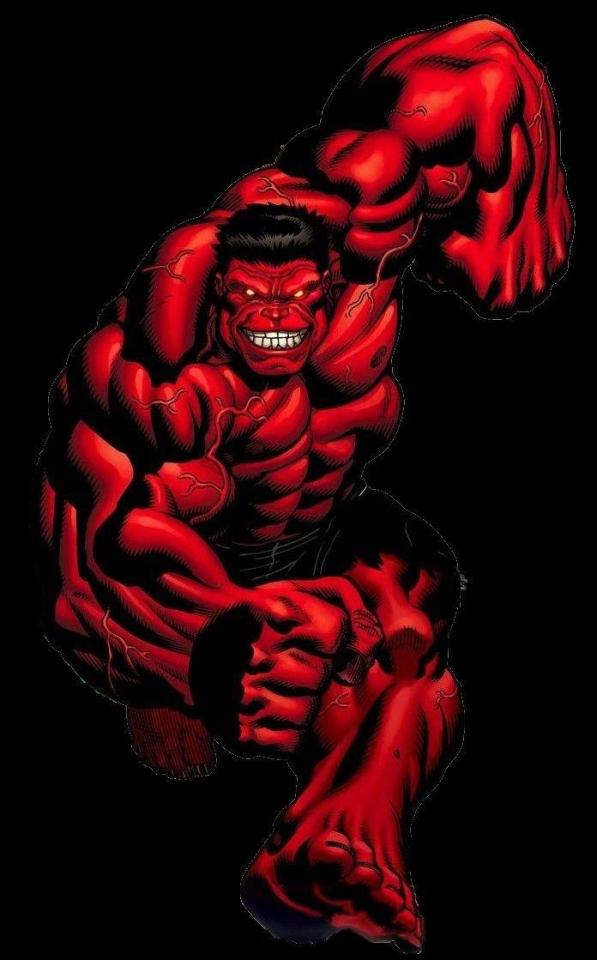
Ross grew up in a military environment with both his father and paternal grandfather in the military.[4]
Ross is the Air Force general in charge of Bruce Banner's gamma bomb project. His daughter, Betty, takes a liking to the young scientist, deepening Ross' dislike for the "weakling". After Banner's transformation into the Hulk, Ross spends years chasing the monster, becoming obsessed enough to commit treason by allying himself with the Leader, MODOK, and the Abomination[5] to destroy the Hulk. Dismissed from the military, he shows up at Betty and Bruce's wedding with a gun and shoots Rick Jones. He is recruited by S.H.I.E.L.D. agent Clay Quartermain to merge with the electric creature Zzzax, a process that gives Ross superpowers but also makes him mentally unstable. He is later restored to human form but retains some residual energy-generating powers.[6]
Finally, the Nevermind, a mutant who drains people of their life energy, attacks Gamma Base in search of a strong host, in this case the Hulk. After witnessing Banner and Rick Jones (who was the Hulk at that time) heroically engaging the mutant, Ross realizes that he has been wrong about the Hulk being a mindless monster. He saves his daughter by allowing the mutant to latch on him and discharging the energy resources he retained from Zzzax. Giving his blessing to Bruce and Betty, he dies in his daughter's arms.[7]
Ross' body is later stolen by the Leader, who uses the powers of one of his followers to resurrect Ross. He turns him into a mindless replacement for his fallen soldier Redeemer. Ross is eventually recovered and revived by agents of the alien Troyjan and returns to the Air Force. He later comes up with a more cost-effective method of confronting the Hulk when he is in his childlike stage: active non-resistance. He and his men simply do not fire on or engage the Hulk in any way. The Hulk, confused, does not smash and leaps away.[volume & issue needed]
Ross would make friends with Banner, but when Betty is seemingly killed due to what both Ross and Banner believed to have been Banner's gamma-irradiated DNA interacting with hers, he once more pursues the Hulk with a vendetta.[volume & issue needed]
Around this time, General Ryker takes over the pursuit of the Hulk. Ross is indirectly involved, observing when Ryker mentally tortures Banner to try to figure out how the Hulk works. The Hulk escapes from Ryker's control and, after several adventures, is lost in space.[volume & issue needed]
After the Hulk returns from exile and initiates "World War Hulk", General Ross, now a full general, makes his own return, electing to bring the fight to his nemesis once more after the Hulk beats Iron Man. After a failed assault on the Hulk, Ross and his men are captured and placed in chains under the watch of Hulk's Warbound, the army he has brought back from space. The Hulk is eventually defeated via satellite weapons that revert him to human form.[8]
Military branchEdit
Ross' military affiliation has been inconsistently portrayed in the comics. Many early Hulk stories depicted Ross as an Army general trying to capture or destroy the Hulk with a U.S. Army battalion called the "Hulkbusters". However, he is also frequently seen in an Air Force uniform, as in his first appearance in Incredible Hulk #1. Stories about his service during World War II portray him as an Army officer in the U.S. Army Air Corps, as the Air Force was not a separate branch of the Armed Forces until September 18, 1947. In a November 2010 Q&A column, then-Marvel editor-in-chief Joe Quesada clarified that Ross is a member of the U.S. Air Force and that inconsistencies in his uniform can be explained via the artistic license with which artists attempt to present a more dramatic-looking uniform, and that Ross may be a part of a special unit of the U.S. Air Force, or the Marvel Universe's version of it, which has its own unique dress code.[9]
The Army continuity is also followed in various Hulk adaptations, such as in the 1966 and 1996–1998 cartoon versions of the Hulk, the 2003 Ang Lee movie Hulk in which he is portrayed by Sam Elliott, and in the 2008 movie The Incredible Hulk, in which he is portrayed by William Hurt. The Official Handbook of the Marvel Universe: Hulk 2004 issue officially indicates Ross to be a three-star lieutenant general in the U.S. Air Force.
Red HulkEdit

Red Hulk as seen on the cover of Hulk vol. 2 #1 (January 2008). Art by Ed McGuinness.
Red Hulk (also known as Rulk[10] or The IncREDible Hulk) was introduced in 2008 in Hulk #1.[11] The Red Hulk was created to be an uninhibited, tactically intelligent adversary to the Hulk.[12][13] Although Kenneth Johnson, the creator of the 1970s TV series The Incredible Hulk, had suggested a red Hulk for that adaptation decades earlier,[14] Marvel editor-in-chief Joe Quesada proposed the idea for the comics to debut a red version of the character whose human identity was a secret.[15] Initially, Red Hulk's identity was unknown both to the characters in the story[16] and to the reading audience.[17]
The opening story arc of the Hulk series that premiered in 2008 established that the Red Hulk is very aggressive, as he murders the Hulk adversaries Wendigo and Abomination; destroys the Helicarrier of the spy organization S.H.I.E.L.D.; defeats several Marvel heroes; and, after causing an earthquake in San Francisco, is finally defeated by the combined efforts of the Hulk and Thor. In a subsequent storyline, the Collector places the character with other villains on a team called the Offenders, an evil version of the Defenders, in a bid to prevent the original Hulk from reuniting with Jarella.[18] In that story Red Hulk siphons the Power Cosmic from the Silver Surfer, seemingly killing him, steals his board along with Terrax' cosmic axe, and uses the power to go on a killing spree, killing Namor, Tiger Shark, Dr. Strange, Baron Mordo, the Grandmaster, Terrax, a time-displaced Hulk, and Psycho Man. However, when Red Hulk reveals this to Galactus, Galactus swiftly takes back the Power Cosmic from him. Subsequently, almost everyone he killed is brought back to life with no memory of the event.[19]
The Red Hulk was created as part of a Super Soldier program by persons including Doc Samson,[20] and the criminal think tank Intelligencia,[21] headed by MODOK.[22] The 2009 "Code Red" story arc[16] also made allusions to Red Hulk's real identity, and introduced a Red She-Hulk character, when Domino identifies Red Hulk before his transformation.[23]
In the 2010 storyline "Fall of the Hulks: Gamma", Red Hulk is related in flashback to have killed General Ross at the behest of Bruce Banner, with whom he has formed an alliance.[24] However, the 2010 "World War Hulks" storyline reveals that Red Hulk is Thunderbolt Ross himself, the Red She-Hulk his daughter Betty, and that the Ross who was "killed" was a Life Model Decoy used to convince the world that he had died. Red Hulk then thwarts the Intelligencia's plan to take over the United States with a Life Model Decoy of Glenn Talbot by destroying the Talbot LMD and attempts to take over the country himself.[8] He is thwarted by a restored Hulk, who beats Red Hulk mostly due to Red Hulk's exhaustion from overheating. Hulk tells Red Hulk that it was his idea to fake Ross' death and that he can never again resume that identity. After imprisoning Red Hulk in the Gamma Base, Banner makes arrangements with Steve Rogers for Red Hulk to join the Avengers.[25][26]
After Steve Rogers recruits Red Hulk, Red Hulk manages to stop Intelligencia's failsafe plan "Scorched Earth". Although Banner had claimed that he removed Red Hulk's energy-draining ability from him because it was killing Red Hulk, Red Hulk is shown to still possess this ability.[27] After the events of the Scorched Earth program, Red Hulk is paired up with a Life Model Decoy named Annie. Red Hulk is occasionally assaulted by Ross' former protégé General Reginald Fortean, a scientist given superhuman mutations by MODOK named Zero/One, and the Indian serial killer Black Fog .[28]
Red Hulk plays a vital role in the Infinity Gem crisis of the "Heroic Age" storyline.[29] During the 2011 "Fear Itself" storyline, Red Hulk attempts unsuccessfully to stop the Thing (in the form of Angrir, Breaker of Souls) from destroying the Avengers Tower,[30] as MODOK Superior and Black Fog converge on both combatants during the fight. Angrir dispatches Red Hulk by knocking him out of the city and into Vermont.[31]
As part of the 2012 Marvel NOW! relaunch, Red Hulk leads a non-government sponsored version of the Thunderbolts.[3] This incarnation is a strike team that cleans up the messes left by Ross' military career, but the team later decides on a new arrangement in which the team will do one mission for Ross, then a mission for a random member.[citation needed]
After Hulk takes away the powers of Rick Jones, Skaar and Betty Ross, Ross starts monitoring Hulk's movements. This leads to a battle in which Doc Green subdues Red Hulk and injects him with a formula that reverts him to Ross. The Army is alerted to the confrontation. When they arrive, the Army arrests Ross for deserting his country.[32]
The 2016 "Civil War II" storyline reveals that Thunderbolt Ross is incarcerated in a classified military prison.[33]
In 2018's Free Comic Book Day Captain America issue indicates that Ross is no longer incarcerated.[34] Subsequently, in that year's Captain America #1, it is revealed that Ross was paroled for helping a resistance cell during the "Secret Empire" storyline and appointed head of the investigation into the attack.[35] However, he was later killed, and Captain America was framed for his murder.[
4 notes
·
View notes
Photo

‘The Crown’ Stokes an Uproar Over Fact vs. Entertainment
Dramatic liberties in the latest season of the Netflix series, covering the turbulent 1980s, are annoying Britons who wrote of that period, even among those who disparage the royals.
By Mark Landler Nov. 27, 2020
LONDON — On a Saturday night in July 1986, a band of bureaucrats in raincoats — one contingent from Buckingham Palace, the other from 10 Downing Street — converged on a newsstand in a train station to snap up The Sunday Times, fresh off the presses with a bombshell headline: “Queen dismayed by ‘uncaring’ Thatcher.”
It’s a dramatic flourish from the latest season of the “The Crown” — except, according to Andrew Neil, the paper’s editor at the time, it never happened. “Nonsense,” he said. “All first editions are delivered to both” the palace and the prime minister’s residence, making a late-night dash to buy the paper superfluous.
Mr. Neil, who published the famous scoop about tensions between Queen Elizabeth II and Margaret Thatcher, said the invented scene had allowed Peter Morgan, the creator of the hugely popular Netflix series about the British royal family, to depict 1980s London as a place of “squalor and vagabonds.”
Through four vivid seasons of “The Crown,” Mr. Morgan has never denied taking artistic license with the saga of the royals, playing out their private joys and sorrows against the pageant of 20th-century British history.
Yet “The Crown” is now colliding with the people who wrote the first draft of that history.
That has spun up a tempest in the British news media, even among those who ordinarily profess not to care much about the monarchy. Newspapers and television programs have been full of starchy commentary about how “The Crown” distorts history in its account of the turbulent decade in which Prince Charles married Lady Diana Spencer and Mrs. Thatcher wrought a free-market revolution in British society.
The objections range from the personal (the queen’s brittle, coldhearted treatment of her emotionally fragile daughter-in-law, which the critics claim is unfair) to the political (the show’s portrait of Thatcher-era Britain as a right-wing dystopia, in the grip of a zealous leader who dares to lecture her sovereign during their weekly audiences). Historians say that is utterly inconceivable.
“There has been such a reaction because Peter Morgan is now writing about events many of us lived through and some of us were at the center of,” said Mr. Neil, who edited The Sunday Times from 1983 to 1994.
Mr. Neil, who went on to be a broadcaster and publisher, is no reflexive defender of the royal family. Suspicious of Britain’s class system, he said he had sympathies for the republican movement in the 1980s. But he grew to admire how the queen modernized the monarchy after the upheaval of those years, and has been critical of renegade royals, like Prince Harry and his wife, Meghan.
The events involving Mr. Neil did happen: The queen became frustrated with Mrs. Thatcher when she refused to join the 48 other members of the British Commonwealth in backing sanctions against the apartheid regime in South Africa. This highly unusual clash spilled into public when The Sunday Times published its front-page report, attributed to palace officials, which said the royal family viewed Mrs. Thatcher as “uncaring, confrontational and socially divisive.”
But Mr. Neil disputed several elements of “The Crown’s” retelling, not least that Buckingham Palace made the queen’s press secretary, Michael Shea, the scapegoat for the incident. The show depicts his being fired for having leaked the story, even though it suggests that he did so at the queen’s behest. There is no evidence of this, Mr. Neil said, but it fits Mr. Morgan’s “left-wing agenda.”
“He gets to depict Thatcher as pretty much an ally of apartheid while the queen is the sort of person who junks loyal flunkies when things go wrong, even when they are just doing her bidding,” Mr. Neil said.
The brickbats are not just from the right.
Simon Jenkins, a columnist for the left-leaning Guardian, regards members of the royal family as artifacts of celebrity culture irrelevant to a country grappling with real-world challenges like Brexit. “They are practically defunct,” he said. “They are like anthropomorphized figures of a head of state.”
Yet he, too, is angered by how “The Crown” portrayed the events of the 1980s, when, as political editor of The Economist, he wrote about how Prince Charles had been drawn to the now-defunct Social Democratic Party. (He based the report on an off-the-record interview with the prince.) Mr. Jenkins said that because this season of “The Crown” deals with contemporary history and people who are still alive, its liberties with the facts are less a case of artistic license than an example of “fake news.”
“I find it offensive when people dump standards of veracity in relating contemporary history,” Mr. Jenkins said. “If I did that as a journalist, I’d be hauled up before the press council while these people get prizes.”
Like others, Mr. Jenkins pointed to an episode-by-episode analysis by Hugo Vickers, a royal historian, which found whoppers large and small in the series and has become Exhibit A for its prevarications.
Not everybody faults Mr. Morgan for filling in the missing pieces with conjured scenes, even if he jumbles the facts in the process. (Mrs. Thatcher’s son, Mark, was not lost in the desert during the Paris-Dakar auto rally just as his mother was preparing to go to war with Argentina over the Falkland Islands; hostilities broke out a few months after he was found.)
Charles Moore, a former editor of The Daily Telegraph who wrote a three-volume biography of Mrs. Thatcher, praised Gillian Anderson’s performance as the prime minister, putting it on a par with Meryl Streep’s Oscar-winning turn in the 2011 film “The Iron Lady.” Even a much-criticized episode in which a snobbish queen plays host to a fish-out-of-water prime minister and her husband, Denis, at Balmoral Castle in Scotland, struck him as having “the ring of truth,” despite some embellishments.
Charles Moore, a former editor of The Daily Telegraph who wrote a three-volume biography of Mrs. Thatcher, praised Gillian Anderson’s performance as the prime minister, putting it on a par with Meryl Streep’s Oscar-winning turn in the 2011 film “The Iron Lady.” Even a much-criticized episode in which a snobbish queen plays host to a fish-out-of-water prime minister and her husband, Denis, at Balmoral Castle in Scotland, struck him as having “the ring of truth,” despite some embellishments.
“The Crown,” Mr. Moore said, is trying to have it both ways, selling itself to audiences as a true story while clearing out the extraneous debris of facts that would gum up its dramatic narrative. “There is this thing called the tyranny of fact,” he said. “But as we get to modern times, it gets harder to avoid.”
Mr. Morgan declined to respond to the criticisms, though he told The New York Times this month that he was mindful that this season would be held to closer scrutiny. The producers mined the copious news reports of the period, as well as biographies of Charles and Diana, which contained firsthand accounts of their misbegotten union.
What is depicted in the family’s private moments, however, is “an act of creative imagination,” Mr. Morgan has said.
Behind the frustration with “The Crown” is a recognition that, right or wrong, its version of the royal family is likely to serve as the go-to narrative for a generation of viewers, particularly young ones, who do not remember the 1980s, let alone the more distant events covered in earlier seasons.
“They’ll watch it and think this is the way it was,” said Dickie Arbiter, who served as a press secretary to the queen from 1988 to 2000. He took issue with parts of the plot, including a scene in which aides to Charles question Diana about whether she is mentally stable enough to travel alone to New York City.
“I was actually at that meeting,” Mr. Arbiter said. “No courtier would ever say that in a million years.”
The biggest problem, said Penny Junor, who has written biographies of Charles, Diana and Mrs. Thatcher, is that “The Crown” is a prodigiously effective piece of entertainment. That, she says, poses a particular threat to Charles, who arguably comes off worst in the series and who is likely to ascend the throne before memories of his grim, hunched portrayal have completely faded.
“It is wonderful television,” Ms. Junor said. “It is beautifully acted — the mannerisms are perfect. But it is fiction, and it is very destructive.”
Royal Skulduggery and Palace Intrigue
‘The Crown’ Has Had Its Scandals, but There’s Nothing Like DianaNov. 12, 2020
Companies Abandon Prince Andrew After Calamitous Epstein InterviewNov. 19, 2019
Prince Andrew’s Friendship With Epstein Joins a List of Royal ScandalsNov. 21, 2019
Harry and Meghan’s Hard ExitJan. 19, 2020
Meghan, Duchess of Sussex, Shares Her Miscarriage GriefNov. 25, 2020
Mark Landler is the London bureau chief. In 27 years at The Times, he has been bureau chief in Hong Kong and Frankfurt, White House correspondent, diplomatic correspondent, European economic correspondent, and a business reporter in New York. @MarkLandler
A version of this article appears in print on Nov. 27, 2020, Section A, Page 12 of the New York edition with the headline: ‘Nonsense’: Witnesses to the Actual Events of ‘The Crown’ Have Some Criticisms.
Order Reprints Today’s Paper Subscribe
https://www.nytimes.com/2020/11/26/world/europe/Crown-Royals-Fact-Fiction.html
3 notes
·
View notes
Text
I just noticed an interesting parallel between The Hunger games and Sucker Punch. They both rather brilliantly predicted the way they’re be received by audiences and, more importantly, how they’d be marketed.
The Hunger Games was about a literal bread-and-circuses setup situation in which an elite Capital forced it’s working classes to send their children into an annual death match as entertainment for the rich and a form of humiliation for the poor. The antagonists are a couple of children in the death match, forced to play the role of 'star crossed lovers’, hoping to gain enough pity from their capitalist audience (who initially just wanted their violent death) that they will both be allowed to survive. It works, but inadvertently inspires the working class to rebel, and the antagonists are forced to keep up the act in order to avoid being suspected by the Capital of intentionally starting the rebellion. Due to having survived such a traumatic series of events together, they eventually do end up developing real feelings, but it is a small element of their lives given that their very existence is being used for propaganda by both sides of a war they never wanted.
However when the movies were made, they completely ignored the social and political commentary, and heavily based their marketing on the almost completely irrelevant love triangle, ironically doing exactly what the Capital attempted to do in the books-portray the antagonists as shallow entertainment, therefore invalidating the entire sociopolitical world that they represented. Anyone who has read the books will tell you they are brilliant. Anyone who has only ever seen the marketing for the movies looks down on them with disdain as being just another Y/A teen romance.
Sucker Punch was about an abused girl placed in a mental institution, who disassociates into a fantasy setting in which she is trapped in a brothel with a handful of other girls, unable to leave without being killed. She is forced to participate in her own sexualization, but eventually frees herself by sacrificing her body. It’s a very carefully crafted depiction of on rape culture, and was designed to be a literal sucker punch to the misogynistic nerd audience that it intentionally marketed itself towards. It lured gamers in with the slutty costumes and a vague, seemingly nonexistent plotline (seriously, google it! It’s nigh impossible to find a good explanation of what it’s about unless you actively read the whole synopsis on Wikipedia, effectively spoiling the whole thing) and then for 2 hours depicted a brutal, gut wrenching story of young girls trying to reclaim agency of themselves by using the sexualization of their bodies as a weapon, with the harsh allegories of lobotomy and a mental institution very bluntly pointing out how sick the whole thing is.
30 notes
·
View notes
Text
Okay more spinel
Because her character is cool and I like her.
So let's get on with this.
I know a shut ton of people heavily relate to spinel because she has an ostensibly relatable backstory, but also because she represents BPD to a rather miraculous extent. And I am in the mood to explain WHY.
So, when a lot and I mean majority neurotypical folks hear of BPD they think "this person is abusive and dangerous" obviously that's not always the case, the ironic contrast I have been seeing is that despite spinel's character typing, people are falling head over heals for her while at the same time; if faced with someone who actually does have BPD they would probably feel threatened by them. More on that later.
Anyways, how does BPD work? Why is spinel a decent example for someone with bpd?
Bpd or borderline personality disorder is a trauma based disorder characterized by extreme paranoia, fear of abandonment, social withdrawal or lashing out, excessive emotional eruption (feeling everything very loudly and all at once, but only short periods of time), general lack of identity and purpose, and spiraling among other things.
Because borderline personality stems from trauma and abuse, usually neglect of some sort, the person who has it has an innate urge to please others, a desire to be seen and heard and cared for heavily contradicted by their unstable fear and paranoia surround the people they most care for, that contradiction is what causes emotional outbursts and spiraling.
So, let's apply this to spinel in a way that's understandable aside from just pointing out the similarities in the disorder and her characterization.
Spinel has a history of prolonged abuse, despite gems living for thousands upon thousands of years, spinel is relatively young in comparison to her primary abuser, pink diamond. (Because spinel was made for pink and thus existed after pink)
Pink diamond is also her primary source of companionship. To put it into time relevance, pink is like a twelve year old, and spinel is like a 6 year old.
Spinel's only goal is to entertain and be a friend to pink, but she relies heavily on pink to be consistent in her approval of what spinel does as entertainment (truthful) and she relies on pinks companionship for the relationship to function as it's supposed to. She gives entertainment and companionship in return for approval and companionship.
The balance became off kilter due to pink wanting other than that companionship, a colony, and lack of proper communication leading to her manipulating spinel into playing a game she could not win.
Pink didnt communicate her disapproval of spinel's behavior, which in turn exasperated her own enjoyment with spinel, leading to that manipulation.
This lack of communication spurs the desire for approval in spinel's character, she wants to be good and a friend, was lead to believe she was, when in reality she wasn't, in her eyes. The realization of this began to dawn on her after pink left, but likely before Steven's message ie:
"Is this how it goes, am I doing it right?"
Spinel spent 6000 years in the garden waiting for pink to come back, under the impression that if she continued to play the game, correctly, that she would eventually return. Hence, her desire to be seen as a good friend who obeys and entertains above all else.
This is why she displays a deep desire to be a good gem be good at her job, and why she feels that she inherently isn't.
After she receives Steven's message, she is forced into the realization that the game didnt matter, pink wasnt ever going to come back, from her perspective, pink didnt care for her or want to be her friend, which causes spinel to feel like she is a bad gem, that she doesnt do her job, that she isnt good enough.
Spinel has received only the information from the broadcast (I am including the book reading in this because it sets up the broadcast scene and white diamond speaks to the screen directly after) she knows very little about the rebellion, or the war, only that pink made new friends, had a son and didnt come back for her withing the numerous perceived opportunities she could have. This aspect is important, as if the broadcast told the whole truth, spinel likely would have understood a bit more of the gravity of the events that had taken place.
After spinel learns of pinks new friends and Steven's existence, this is when her severe neglect and abandonment as well as a loss of identity kick in, she is filled with rage, despair and self loathing.
Spinel has lost her identity, her purpose, because she feels she isnt good enough for what she was made to do, despite being a perfect cut, she is nothing, all she will ever be is nothing, nothing to pink, nothing to anyone, nothing to herself.
After having no companionship and no means of safe emotional outlet, spinel is effectively blindsided by the sudden and impactful amount of pain and hate she is feeling. She has no way of confronting this emotion, and she doesnt know how to confront it so she does the next best thing, vent it out on people who were closest to pink, her best friends.
Essentially spinel cant focus her rage on pink diamond because she is gone, so instead she will focus it on the people who, to her, took pink away from her.
Now, given spinel's self deprecating nature, she likely had no real plan afterward, more than likely, she fully intended to be poofed, rejuvenated or shattered. After all, she is nothing to pink, and she is even less to Steven, she doesnt deserve to exist.
From observation, the speed at which she arrived on earth from after she heard the broadcast, she was likely having a severe mental breakdown and spiral, which can be incredibly hard to get out of when one has low self esteem and no proper means of emotional release.
A spiral is when a person (or in this case a character) becomes self deprecating and an increasingly more volatile rate, they are incredibly hard to get out of because the mental illness doesnt allow positive thought, the person will feel bad for their actions or feel bad about trauma or failures and will continually throw insults at themselves or those around them for trying to convince them differently.
Spinel spirals twice in the movie, the most excellent example is her paranoia of being abandoned leading to irrational thought and self depreciative spiraling and lashing out as a means of emotional protection.
I'm not really going to speak on the middle of the movie because it essentially rehashes that emotional trauma and neglect I mentioned earlier, the only difference is that is is comparable to a person with BPD who has effectively repressed those traumatic memories and is slowly reliving them, which subsequently causes a major relapse.
What I will say however, is that some other common symptoms appear in spinel like they do with folks with BPD. Spinel has an fp. A favorite person basically.
Folks with BPD often pick a companion of theirs and become extremely attached to them, they care incredibly deeply for them, and can also feel incredibly betrayed by them when they dont act in ways that the person is comfortable ie; displaying traits that can, to the person with BPD lead to abandonment.
Folks with BPD also tend to tailor their personalities for their companions in order to receive that approval they desire most.
Spinel displays this fairly effectively when she lashes out at Steven when he tells her to stay with the new crystal gems, she also displays the tailor trait when she mimics amethysts actions during the nobody else duet.
Finally, when spinel reverts back to her dark form, she displays the other symptoms of BPD, hesitance to trust, then blind trust and desire to please, her paranoia over Steven leaving her, and the subsequent spiral leading her to lash out in effort to protect herself from more emotional trauma and eventually dropping out of her spiral and then the final, trying to leave before abandonment can happen.
This is a fairly important one, as a lot of folks with BPD tend to feel that abandonment is an eventuality, and another form of protection from that is purposely distancing oneself and leaving before that abandonment can take place.
Spinel, after her second spiral is still very much traumatized, and still very much self destructive, has low self esteem, despite wanting to be better, so to spare herself the pain of facing people she has actively harmed in her worst moments, and to spare herself from what she believes is an eventual abandonment, she desires to leave and start over.
Do I think this is healthy? Mmm..no. mostly because I know that folks with BPD have an incredibly hard time breaking paranoia, low self esteem and self destructive behavior. I definitely dont think that spinel should have left with the diamonds because they have no idea what she is capable of and what she has been through, or how to deal with her self destructive behavior in a healthy way. They arent even able to completely overcome their own abusive behavior so..no, I dont think it was a good decision to have her go with them. But that doesnt really matter right now lol.
What matters is; spinel is a good example of what it is like to have BPD, she is a good example of the low self esteem and self destructive behaviour people with BPD have. She is a good example because she isn't seen as a completely lost cause by Steven and the others, despite what she herself believes. She has an acurate portrayal of the trauma that develops bpd, the symptoms of BPD in an easily digestible way and she isnt portrayed to have these issues completely resolved by the end of the film.
She very VERY quickly jumps into another relationship that can very easily be destroyed by either the diamonds or herself, and still struggles with low self esteem and the desire to be approved of by Steven, and the diamonds.
She isnt fixed by the end. But she doesnt get treated as a terrible person either.
Most people who talk about BPD who dont have it themselves very often say that they are inherently abusive, and overlook that persons trauma. That doesnt happen for spinel, Steven sympathizes with her trauma, despite largely being sidetracked and not fully indulged in helping her for her sake, rather than helping his own needs.
It's understandable and infuriating at the same time. Because the type of person spinel is, requires a different approach and a far more delicate one at that, something Steven hasn't had the same quite of experience with yet. Which is what largely caused her to spiral the second time. And it wasnt until Steven realized how selfish he had been that he was able to even make a proper and not misleading connection with spinel.
So there you have it, my analysis of spinel, why she portrayed BPD very very well, and how bod is a largely misunderstood and stigmatized disorder.
205 notes
·
View notes
Text
Listen Up Percy Jackson Fans!
Most of you have probably heard of the Lightning Thief Musical. It’s got a great soundtrack set to rock music, a blonde Annabeth, and is a faithful, loving recreation of the book. Its basically everything the movie wasn’t. Recently it has made it to Broadway for a limited run (until January), which is amazing! It deserves it! And Broadway critics love it too giving it overall positive reviews, except one.
Earlier today, a critic from the NY Times has released his review of the show. I have a bulleted list but here’s the link to the article if you want to read it yourself, its not very long.
https://www.nytimes.com/2019/10/16/theater/review-the-lightning-thief-broadway.html
Here we go!
He completely bashes the show calling it a “failed attempt to board the fantasy-angst train” and having “all the charm of a tension headache”
complains about how they writers extended the show from one hour to two and adding “unnecessary songs”
explains that Percy appears sixteen instead of twelve (musical Percy is indeed twelve) because he’s played by a 28 year old, as are the other demigods. However, the majority of the cast, excluding Chris McCarrell who plays Percy and Kristen Stokes who plays Annabeth, plays more than one role, including adults, since the show is smaller. Also, if you ask me, having twenty year olds playing characters who are twelve is hilarious and reminds me of Team Starkid (A Very Potter Musical trilogy, Twisted, The Guy Who Didn’t Like Musicals, etc.)
he even critiques the set, which is a mix of marble and scaffolding to give it the modern Greek aesthetic, fitting for the setting of the musical) and calling the special effects “cheesy” and “underwhelming” (Percy’s water powers are represented by toilet paper being shot into the audience, which I find endearing but go off I guess)
he seems to think that low budget shows don’t belong on broadway which is complete and utter bullshit
claims that the show normalizes “the idea that actually quite privileged youngsters are victims of social or parental neglect” because apparently having to fight off monsters to survive and being neglected by not just one, but in some cases both, parents is being privileged and childish
the critic has obviously not read the book that the show is based off of and doesn’t seem to understand the “battle’s just begun” lyric in the final song “Bring On the Monsters” because he laughs at calling it all “aggressively false”
Ironically, he praises the Cursed Child, a play that is overall disliked by the fandom, in the same article that bashes a musical that is not only beloved by the creators with a genuine love for the source material, but by the fandom as well (The Lightning Thief)
He also compares The Lightning Thief to, of all shows, Dear Evan Hansen, praising DEH in order to bring TLT down. (he also, either intentionally or unintentionally, implies that DEH is about teenage angst done well, even though DEH is about mental illness such as anxiety and depression, not teenage angst
So those are the highlights. Once again, the link to the full article is above. Its obvious the critic has a huge dislike for “teenage angst” musicals and does not understand how well the musical does at portraying the beloved book, as well as keeping the heart and soul of the material while still doing their own thing with it.
#percy jackson#rick riordan#the lightning thief musical#the lightning thief#broadway#i really want to fight this guy#failed attempt my ass
116 notes
·
View notes
Text
Interview with Louise... A mental health support worker
Question 1: What do you feel is the most common form of mental health issue?
Answer: Based on my experience working within community mental health, most common mental health conditions are depression and anxiety, often overlapping and not occurring in isolation. Whilst not directly a mental health diagnosis, I have also found that low confidence and self esteem is a common difficulty that people experience.
Question 2: Through your work and profession what age range do you feel is most effected by mental health issues?
Answer: There is no specific age range that experiences more mental health difficulties than another. At different stages in our lives, there are different circumstances, life events and situations that can all result in experienced mental health difficulties. If you were to focus on the age range that specifically concerns mental health difficulties due to social media, I would say 18-30, but individuals affected by social media are getting younger, as people are exposed to social media early in life now.
Question 3: Within society today do you feel that there is a connection between the usage of social media and it having an impact on peoples mental health?
Answer: There is definitely a connection between social media use and mental health difficulties. This is evidenced everywhere; through research (and this is a topic I focused on during my dissertation), through supporting young adults in my work, personal experience by experiencing it myself or seeing loved ones experience it and ironically it is spoken about across social media platforms. There is largely a comparison culture when it comes to social media (we compare ourselves and our lives to others) whether that be comparing how we look, our fashion, our friendship circles, how we love our lives, our careers and even how we portray our lives (e.g. taking the perfect “selfie”). Social media can stress people out, make people feel low, anxious and perhaps because of how we compare ourselves or being concerned about how others will view us based on what we post. Body dysmorphia and disordered eating has also been associated with social media use, again because of the comparison between body types and appearance and the online fitness world. Social media can also affect our productivity and therefore make us feel low and demotivated, as well as impact on sleep as a) smartphone/device use before bed has been associated with sleep difficulties and b) being consumed with social media can impact on our abilities to actually go to sleep.
Question 4: Do you feel as though social media creates a positive or negative impact on this generation of people?
Answer: With regards to whether social media has had a positive or negative impact on the current generation, I would say both. It has had a positive impact as it has allowed us to connect with our friends and loved ones (especially during one of the most difficult times we have ever been through in our lives!), share our successes, our happy moment and memories that we can look back on, share funny “memes” or posts that we can relate to and make us smile whilst the current situation in real life has been scary and daunting. Also, with exercise and fitness being known to greatly improve mental health, social media has allowed us to make exercise and fitness more accessible through online workouts, videos, guides and so on. Most importantly, social media has given us the ability to talk about mental health, start the conversation and share resources and information about how we can seek support for our mental health or manage it independently.
Social media has also had a negative affect on the current generation, as explained earlier, we have almost been consumed by it and it is as if it dictates our lives and how we should live it based on the lives of others. For example, we do certain things because “that would look good on the gram”. We can even miss out on what is going on in the real world due to how easy it is to access social media, through our smartphones. A lot of the points I would make about why it is negative have already been addressed above in Question 3 (impact on mood, well-being, confidence, self-esteem).
Question 5: From your career what do you feel as though will help promote awareness of social media effects on mental health?
Answer: Through my career, I feel that social media itself can help promote the effects of social media on mental health. Considering we are a generation that consider social media a big part of our lives, it would only make sense to promote this topic on social media. I have seen a lot already in terms of posts on Facebook and Instagram, but I feel a lot more professionals could use this to their advantage by holding online talks, webinars, post more about it on YouTube and make these things a lot more accessible by connecting with the government. That way, these kind of things would be promoted more on the news or government websites, so even family members can support individuals of our generation to understand the impact of social media on our mental health. Having social support is key mental health management, as people can feel very alone with it. In a nutshell, if we can have the conversation about mental health and how social media affects it within smaller groups (e.g. our family and friends), just like all news, will spread like wild fire and therefore promote awareness throughout society.
1 note
·
View note
Photo
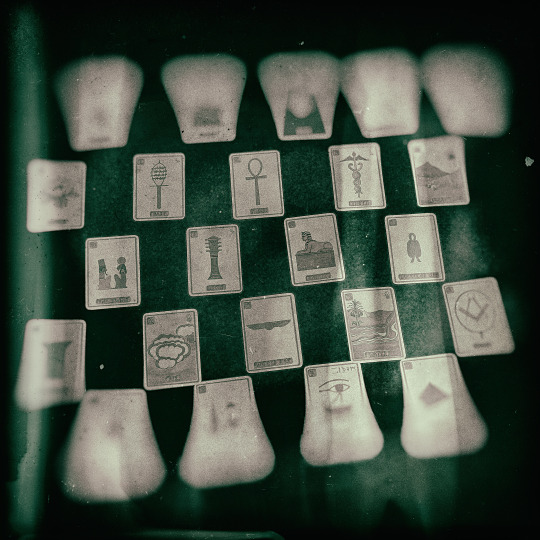



Cartouche
Information taken from "The Way of Cartouche" by Murry Hope
Cartouche encapsulates those archetypal energies which were known and understood by the ancient Egyptians and embodies them in identities easily recognizable in today's world. Cartouche acts as a bridge between day-to-day things and the transpersonal or Higher Self, which makes it very much a part of the Aquarian Age - the age of individual responsibility. Cartouche is based on ancient Egyptian (or older) knowledge and should not be confused with tarot cards. It consists of 25 cards: Cards 1 to 9 (Osiris, Isis, Horus, Bast, Thoth, Hathor, Nepthys, Ptah and Anubis) represent the major archetypes; cards 11, 12, 13 and 14 the Elements of Fire, Air, Water and Earth; and cards 15 to 25 (Sirius, Lotus, Crook & Flail, Uraeus, Winged Disc, The Twins, Sphinx, Scarab, Pyramid, Ankh and Buckle of Isis) relate to more general or mundane energies. Card No 10 is Set, representing all forms of opposition, delays, hindrances and unforeseen problems. Set can indicate one's personal opposition to an idea, to change or to a proposed project.
The ancient Egyptian symbols depicted on the cards capture the essence of the forces or energies that govern the universe. Many believe the Egyptians gained their knowledge of these forces from an even earlier advanced race who, in turn, were instructed by extraterrestrials from the Sirius star system. The symbols, colors and meanings of the cards accord both with the designs found on Egyptian temples, pyramids, tombs and old papyri, and with a secret arcane tradition that has been handed down from century to century.
Each card can be used for meditation, divination, healing or magical or talismanic purposes and, when arrayed in the various layouts, can provide insight and answers to dreams, family or emotional problems, financial or business matters, healing and health, crafts and skills, protection, spiritual seeking, or any of life's many enigmas.
Vibrations are passed subconsciously to the cards when you handle them, so the order in which they fall in a reading is directed by the promptings of your subconscious mind. Normally in life we tend to create a barrier between our conscious and subconscious minds through the overuse of logic. Cartouche will help you to achieve a subtle balance by creating a bridge of contact between your everyday persona and the needs of your inner self.
Egyptian Cartouche Initiations The Initiations into Egyptian symbols brings about a state of heightened awareness and clarity. There are 24 Initiations into the ancient archetypal universal symbols from Egypt and Atlantis which can enhance healing powers and psychic development. Cartouche is the oval in which the hieroglyphs are drawn. The book and cards called "The Way of Cartouche" by Murry Hope does an excellent job of explaining the fundamental symbols.
Origin and Uses of the Cartouche Cards
Cartouche is a French word that means oblong box and refers to the shape found around the images of important priests discovered in some ancient Egyptian temples. Murry Hope, an English lady and practitioner of Egyptian magic, using the ancient Egyptian writing system of cartouche and hieroglyphics for self-understanding and awareness invented the Cartouche system in 1983. Hope chose the name Cartouche for the card set because after 30 years of study she felt that "it encapsulates the archetypal and powerful energies known and understood by the ancients and embodies them in identities recognisable in today's world." She and Jed Collard formed Ostaris Publications and published the first 3,000 decks that same year. In 1984, Collard sent some sample cards to St. Martin's Press and they immediately responded with an offer for the worldwide rights to print and distribute them, but wanted Hope to expand the small instruction booklet into a large book which she did. St. Martin's Press then doubled the size of the cards and produced the expanded booklet in a hardback format as "The Way of Cartouche."
The Cartouche deck comprises twenty-five cards each having a number and an image. Ironically 25 is the number of Rune cards in a Runes deck, one might, therefore, liken this to an Egyptian version of a Rune deck. Those cards that portray a god, goddess or element have in addition a set of hieroglyphics, which describe that image and encapsulate its power. The image on each card may have a fixed or mobile nature. For example, Nephthys is a goddess shown on card number seven. She is represented by an image of a cup or container and the ka hieroglyphic (representing the personal life force) appears in the top right hand corner of the card. As Nephthys means psychic receptivity and that which is slightly obscure and fluid she consequently has a mobile nature.
The cards are numbered sequentially from 1 through 25 and each card has either a fixed or a mutable quality corresponding with universal astrology. Each card is presented with a blue border against an almost completely white card, with the exception of two cards, Set and Air. There are scenes or symbols floated in the centre of the card against the white. The title appears underneath in a graphic form that looks like a stone carving. The number is in the upper left corner in a matching format, and in the upper right corner, the hieroglyph for that particular deity/element/symbol.
The first ten cards are representative of various gods and goddesses within the Egyptian pantheon. Each of these cards has several meanings and levels of nuance described in the book as they relate to the Spiritual, Psychological and Material levels of the reading. The god/goddess cards are:
1 - Osiris
2 - Isis
3 - Horus
4 - Bast
5 - Thoth
6 - Hathor
7 - Nephthys
8 - Ptah
9 - Anubis
10 - Set
The next four cards represent the basic elements Fire, Air, Water and Earth and have more scenery drawn on them than the rest of the deck, and are evocative of the elements' affect on the surroundings of both the ancient Egyptians and modern-day man.
The rest of the cards are a mix of various experiences and symbols that the Egyptians might have encountered in their day-to-day life.
15 - Sirius
16 - Lotus
17 - Crook and Flail
18 - Uraeus
19 - Winged Disk
20 - The Twins
21 - Sphinx
22 - Scarab
23 - Pyramid
24 - Ankh
25 - Buckle of Isis
The cards themselves are larger than standard size and printed on a thin, flexible cardstock with smooth edges and rounded corners. They do shuffle and handle easily because of the small number of cards in the deck. The design on the back of the cards is a soft; clay coloured orange with turquoise coloured cartouche markings on it. This design is reversible. In Australia, the set comes with a hardbound book of 208 pages and lists many references, spreads and layouts with divinatory meanings, explanations and keywords for each card, and much more information. Each card is further accompanied by an explanation of the particular hieroglyph that goes with it and the story or legend that it represents.
Uses of Cartouche
Cartouche cards may be used for meditation, healing, divination and magical work.
Meditation
Meditation on the Cartouche symbols can be rewarding if the type of meditation practised is contemplative meditation. Once the meanings of the symbols are internalised and the myths belonging to the various gods and goddesses are known there will arise in the meditator's mind many images, intuitions and feelings, all of which will convey new insights into the nature of the Cartouche cards.
Healing
Cartouche may be used to send healing to others in need or to effect self-healing. Several Cartouche cards carry healing rays, but the three main ones are Horus, which deals specifically with physical complaints such as accidents, fever, viruses and naturally with conditions affecting the eyes; Bast, whose energies are oriented toward mental problems or psychological conditions; and Thoth, which covers the imbalances that cause disease in the first place.
For sending healing to another, select the card that will best fit your friends' needs, place it with an object, photograph or letter that carries his or her vibrations and let the energies do their work. Or, if you feel it would carry more reality for you, meditate upon both the card and your friend and visualise the energies transferring from one to the other.
Some of the other cards also carry energies that are conducive to physical healing: Isis the Comforter; Anubis the Patron of Anesthetics; Ankh the Conveyor of the Life Force; and Sirius the Giver of Strength. It all depends on what produced the sickness in the first place. The answer may not lie in the actual disease, but in an attitude of mind that is causing it to manifest.
One of the secrets of good and successful self-healing is to know which cosmic energies you need and how to tune into them. Or, if you prefer the psychological approach, contact those areas of your own brain that can program in good health and help fight disease in a natural way. If you are recovering from an operation, trying to speed up the mending of a broken limb, or fighting off the depressing effects of a bad bout of influenza, Horus is the card to meditate upon.
Worries of a psychological nature, which in themselves frequently give rise to very real physical symptoms, come under Bast. Psychosomatic illnesses are all too frequent these days, so a good meditation on the sistrum, as shown on the Bast card, will help restore mental balance and so ease the physical symptoms caused by stress. People who are attracted to the cat or lion family will also benefit from the feeling of relaxed strength gained from the healing rays of this card. It may be used in conjunction with the Horus card, for it was with good reason that Horus and Bast were considered to be twins by the healer-priests of ancient Egypt; Sound mental and physical health go hand in hand.
Thoth covers all forms of medical help. If you find you have distressing symptoms that your doctor cannot diagnose, concentrate on the symbol on this card. It is the caduceus and it represents balance and harmony that are essential for good health. This is the symbol of the medical profession, and its enlightening rays will fall upon those who are qualified to help you. In other words, the right diagnosis will be made and the right treatment given to you through its help. Of course you can use the Thoth card for self-healing as well but, since it is also the card of karma (which all ties in with the saying "As you sow, so shall yea reap"), Thoth's aid may come as a form of enlightenment as to what you are doing wrong to cause the illness, eg bad habits, incorrect diet, or negative or unkind thoughts that are rebounding on you. By adjusting these you may effect your own healing.
Of course Cartouche does not presume to make a clinical diagnosis, as this is strictly and legally the role of a qualified medical person and rightly so. Cartouche is more concerned with the mind and those mental attitudes that cause the disease initially. Many ailments are actually induced by wrong thinking, so if our negative thoughts are culprits in the first place, positive thoughts can be used to help put matters right. The cards of Thoth, Horus and particularly Bast, if utilised in the meditation and self-healing context can, therefore, aid your doctor in his or her task by helping your mind to play its part in keeping you fit and well.
Divination
Divination is the art and science of predicting a course of events. In her book "The Way of Cartouche" Murry Hope outlines two basic methods to use in Cartouche divination: The Horoscope Method and The Star Spread. The former method is also used by Tarot readers and entails asking the enquirer to shuffle the cards and cut them into three piles which are then picked up by the reader and laid out in an anti-clockwise fashion so that twelve consecutive cards form a circle. In the centre of this circle, a thirteenth card is placed. The first twelve cards each correspond with a house of the Zodiac while the thirteenth card gives the tone or atmosphere of the reading. The latter method involves shuffling and cutting the cards as before but this time they are laid out in the form of a five-pointed star or pentagram. The first card represents the situation at hand, the second, considerations for the enquirer, the third, "on the other hand" considerations, the fourth, what the enquirer should do and the fifth, the final outcome.
Magic
A popular definition of magic is "The art and science of making changes in conformity with the will". Magical uses of the cards might include protection, attracting the right partner or making more money. Murry Hope suggests in "The Way of Cartouche" that the cards may be used as talismans and that, for example, by simply carrying one of the cards of protection such as Anubis you will be protected from dangers both seen and unseen (one of the meanings of this card is protection at all levels.)
#Cartouche#selective focus#oracle#magick#futures#The Way of Cartouche by Murry Hope#scarab#pyramids#horus#bast#sphinx#divination
21 notes
·
View notes
Text
Karma- Beetlejuice (1/7/2020)
Hey guys. I’m trying to catch up with my writing and I’m still working on my thoughts about my experience watching Beetlejuice, but I wanted to share this since I’m writing some fanfiction at the moment and need to get his character down.
I decided to design/personalize my interpretation of Beetlejuice based on what I saw since several people on here had different versions on him based on how the actor portrayed the character on that performance. I challenge others who’ve seen the musical to share their own versions as well if they wish!
If anyone had seen the show on January 7th or wants to add any unique thing in general, feel free to add in a reply or comment or whatever! Without further ado, here is my Beetlejuice that I will be writing about in my stories:
Name: Lawrence Betelgeuse Shoggoth aka "Beetlejuice"
Nickname (Compared to Other BJ's): Karma
Gender: "Beetlejuice" (Non-binary/Genderfluid)
Pronouns: Currently He/Him. Does not mind They/Them
Orientation: Demiromantic/Pansexual
Physical Features: Gold eyes, fangs, mood-changing hair, the green on his cheeks that is not his hair is in the shape of a diamond one for each cheek.
Distinct Features: (Alternate Outfit) Black suit with white stripes, would sometimes wear a black fedora with a purple feather, green beetle emblem, and a 7 of Diamonds playing card on it. Still has his green tie.
Other Features:
- With Autism and has Dyslexia
- Voracious (Can eat people dead or alive and almost anything really)
- Encourages creativity, confidence and strong emotions (despite not knowing how to process the latter exactly)
- Got his name based on his "luck"/karma.
-7 of diamonds symbolism (besides the fact I'm incorporating 7 deadly sins again):
The seven of diamonds evokes everything related to negotiation. In cartomancy, this card is more or less neutral.
an artistic flair, a love of nature and beauty and a certain social charm like no other.
firm boundaries and self-discipline. An interesting and unique blend of flow and constriction is experienced by this Seven in the cards of life
They are encouraged to focus on life’s abundance and acknowledge their innate ability to create on the material level. Challenged to view the glass as half-full, Seven of Diamonds♦ people must exercise non-attachment to money as it is their spiritual test of faith in a benign, abundant universe. Once they are in alignment, having released their famine mentality and poverty consciousness, there’s actually no limit to how much a Seven of Diamonds♦ can create.
People of this card and suit are here to experience life and themselves through values, acquiring worth, both material and immaterial, commerce, evaluation, financial matters and business.
It is a card of power and accomplishment
changes are often violent, always sudden
Seven of Diamonds belong to the special family of Seven. It means that their life does not follow the traits of 46 cards of the deck. It may feel like being an alien with ideas and set of values no one understands. No one can ever experience how it is to be in your place
For their very open-minded and mentally sharp brain, creativeness and ambitions, any routine work can be more than they can handle. Seven Of Diamonds need new things to learn, new places to go and new projects to work on to keep themselves motivated and happy.
In love, they are more than anyone else willing to sacrifice and give anything they've got to beloved ones.
There is a great love of home for all 7 of Diamonds, but they may have to wait for it, as their early life is filled with many changes.
- Loves his found family and would kill for them. Seriously.
- Would sometimes take things literally (borrowing that from the cartoon)
- Cheers for the underdog most of the time
- Has a soft spot for kids
Now about "Karma" based on 1/7/2020 show:
Actor Who Played Him: Alex Brightman
Details (Feel free to add any!)
- gets genuinely surprised at attention, but really craves it
- stutters sometimes
- has the audience at the palm of his hand
- very excited about the Maitlands at first
- excited to see kids
- great with accents and impressions
- wants to make friends, but doesn't know how
- Optimistic/Hopeful at first
- very emotional and over-dramatic
- has comedic timing
- he's very vocal on letting out noises and side effects
- he waves his hands around a lot/stims
- a touchy kind of being
- chubby (thicc boy)
- sarcastic
- deadpan
- he sometimes gets confused about the Maitlands
- He hesitates when he admits his first name is Lawrence
- He's a switch not going to lie (slight NSFW-ish)
- dramatic whines
- sad/exasperated that no one is like him.
- gets distracted easily
- mocks people perfectly
- responds verbally whenever someone living says his name
- desperate and raspy when playing charades with Lydia
- Ironic but seems more "human" in act 1, then more "demon/monster" in Act 2 until the end
- more demonic, wild, and growly when summoned
- especially growls and snarls
- big brother/best friend to Lydia
- He likes his clones a lot
- gets sadistic when he's angry and wants to see a reaction
- unconsciously recognizes being manipulated/repeated behavior (Ex. Juno manipulation and his face falling when he sees her "act of love")
- throws his voice around multiple times
- wants to connect with others, plans to work on it when he leaves (ironically, he has connected with the audience)
#Beetlejuice#Beetlejuice the musical#interpretation#alex brightman#karma#karmajuice#character notes#will talk about the show more at a later date#feel free to add anything#or share your own juice
10 notes
·
View notes